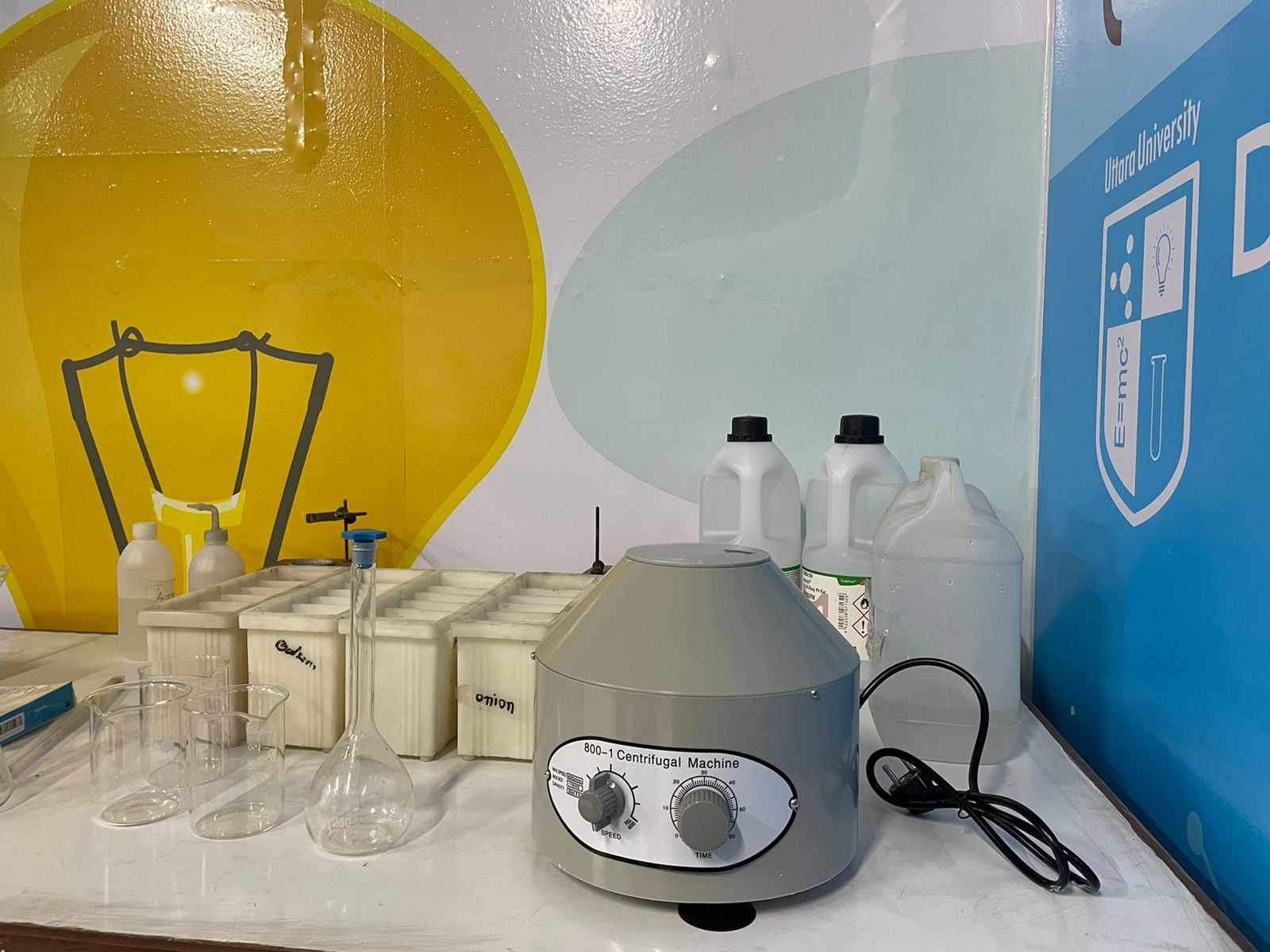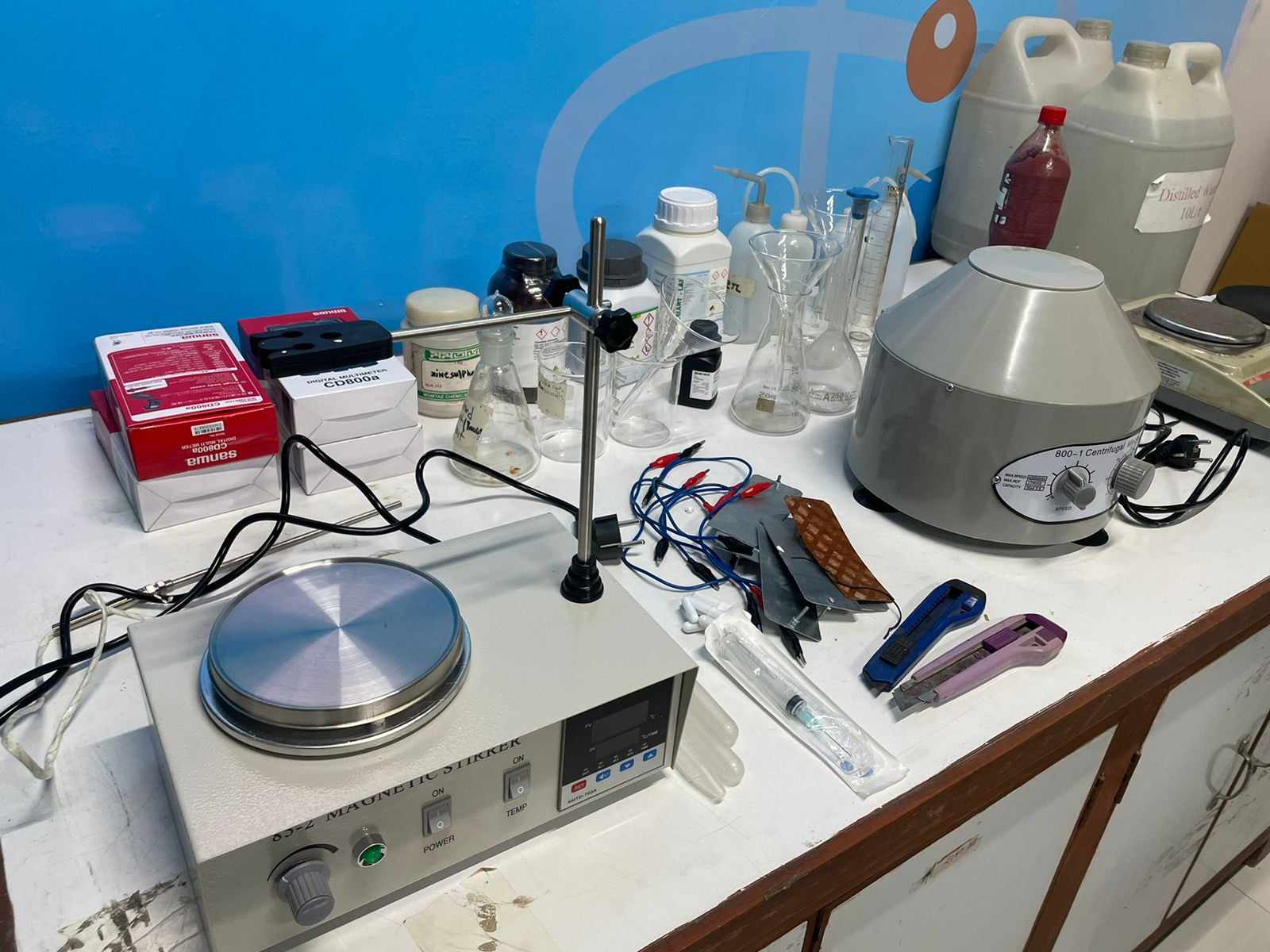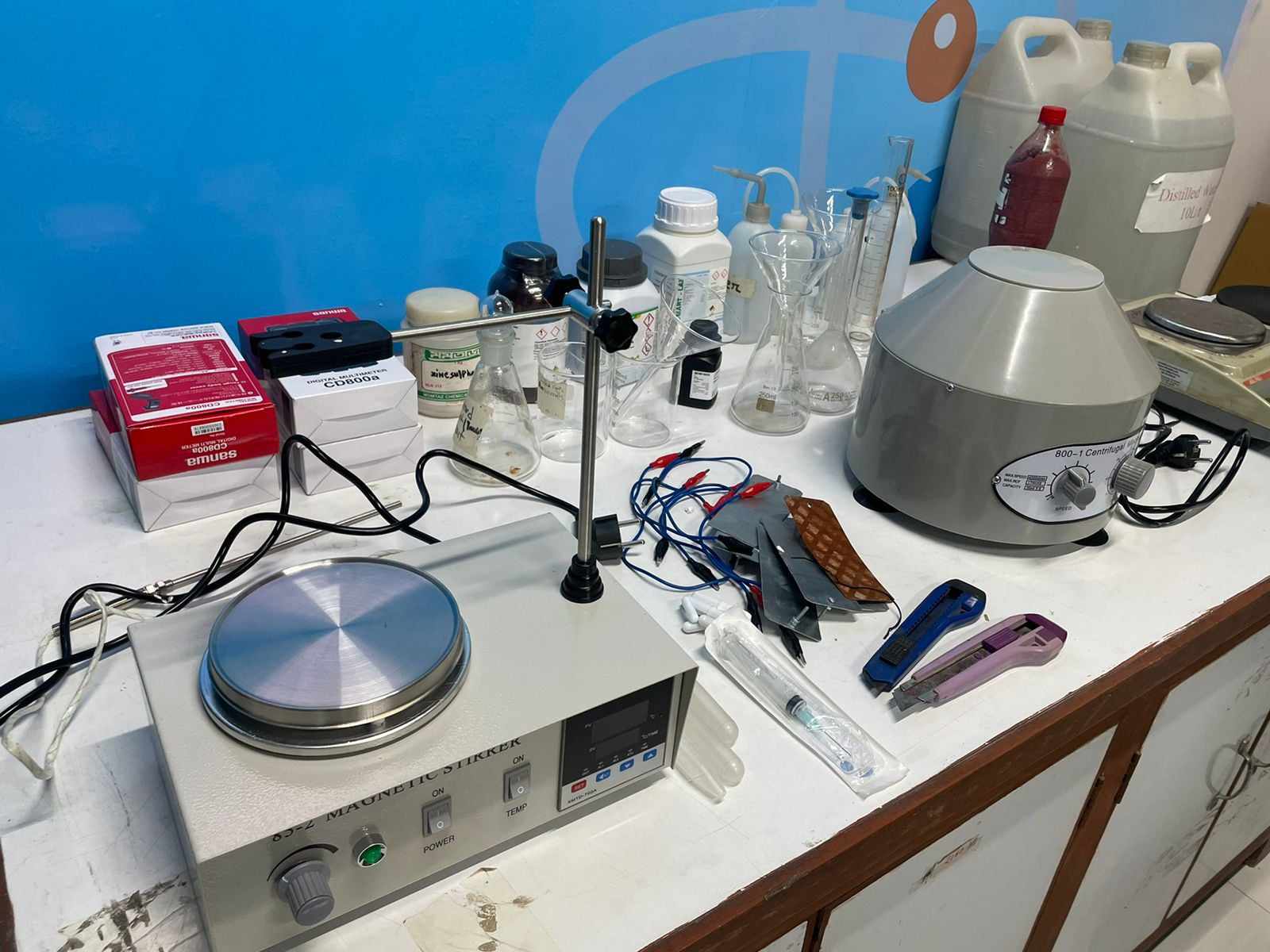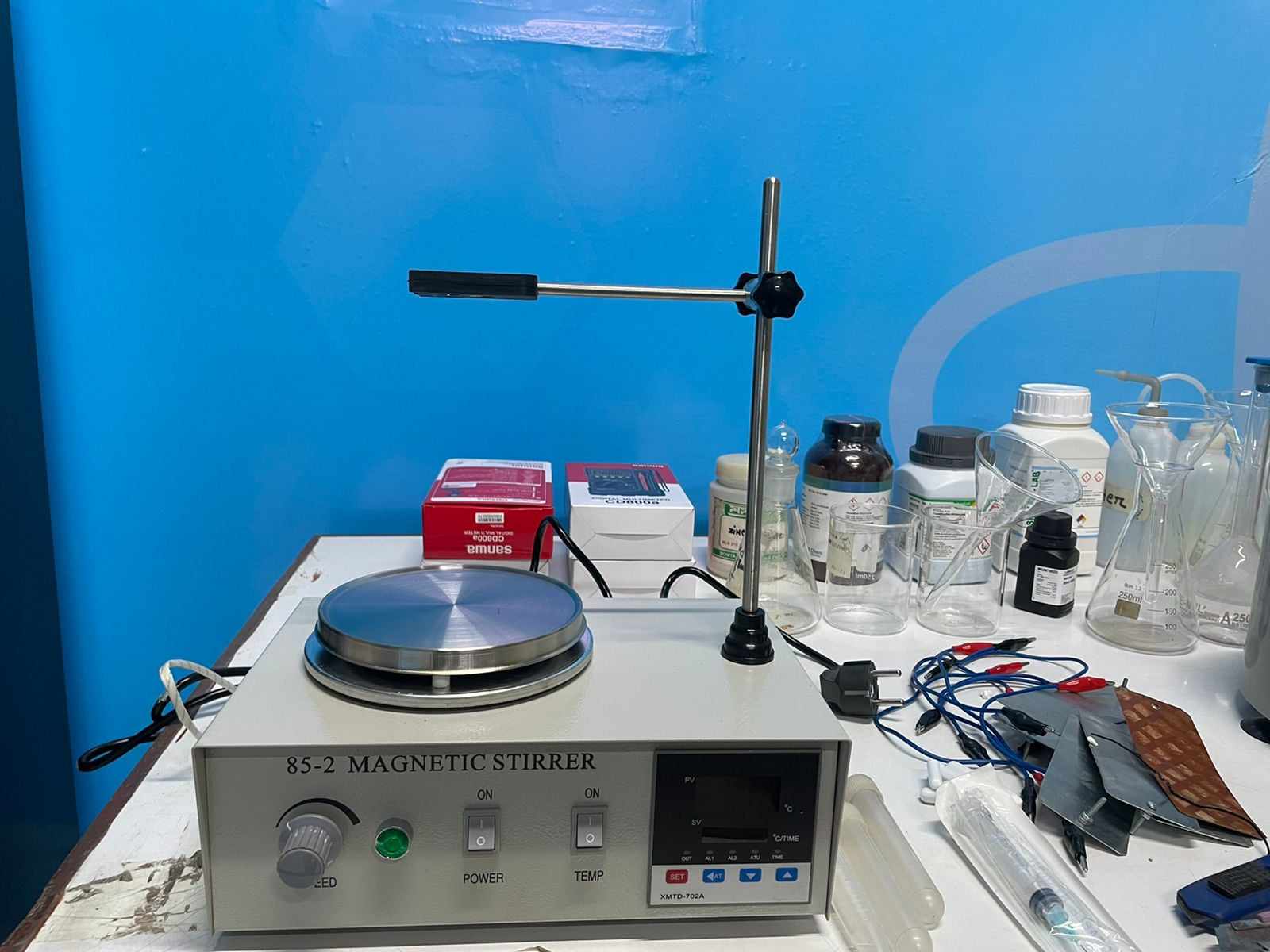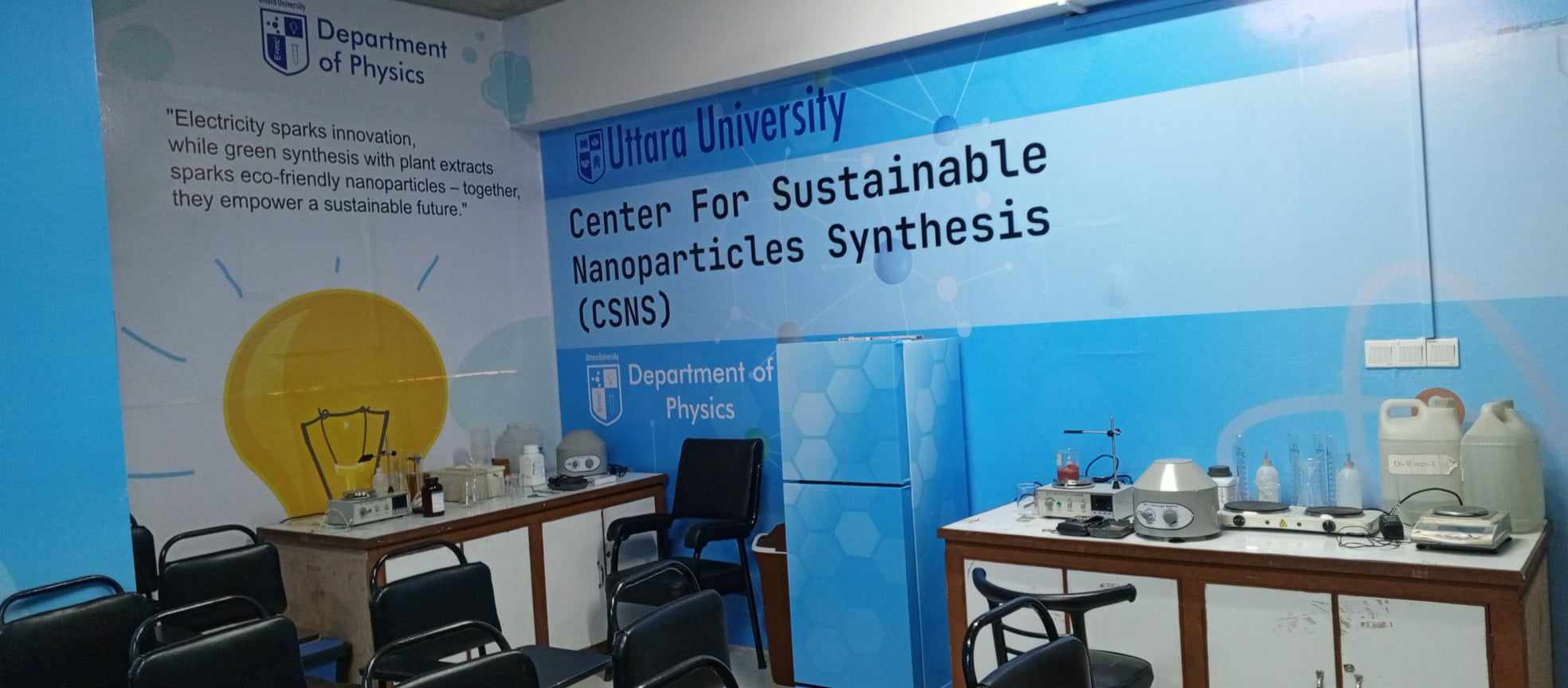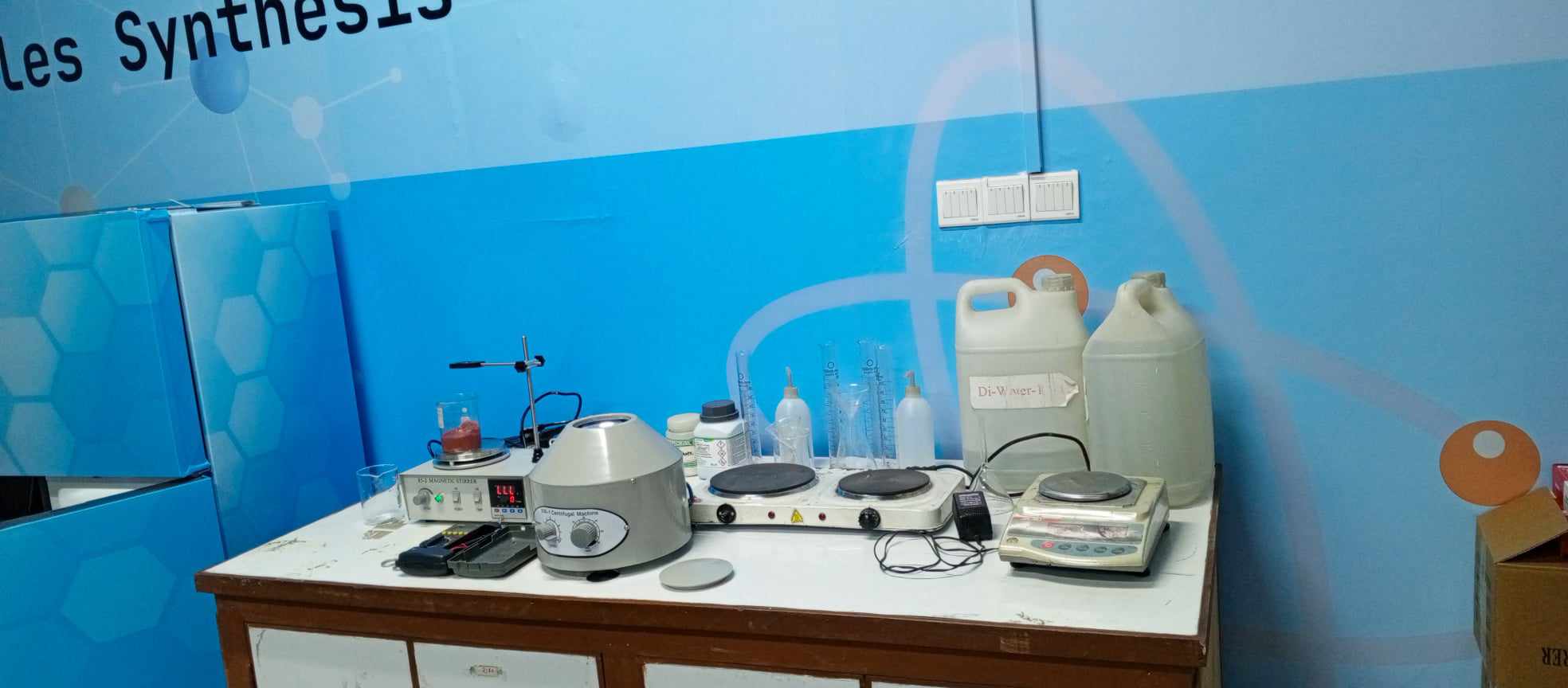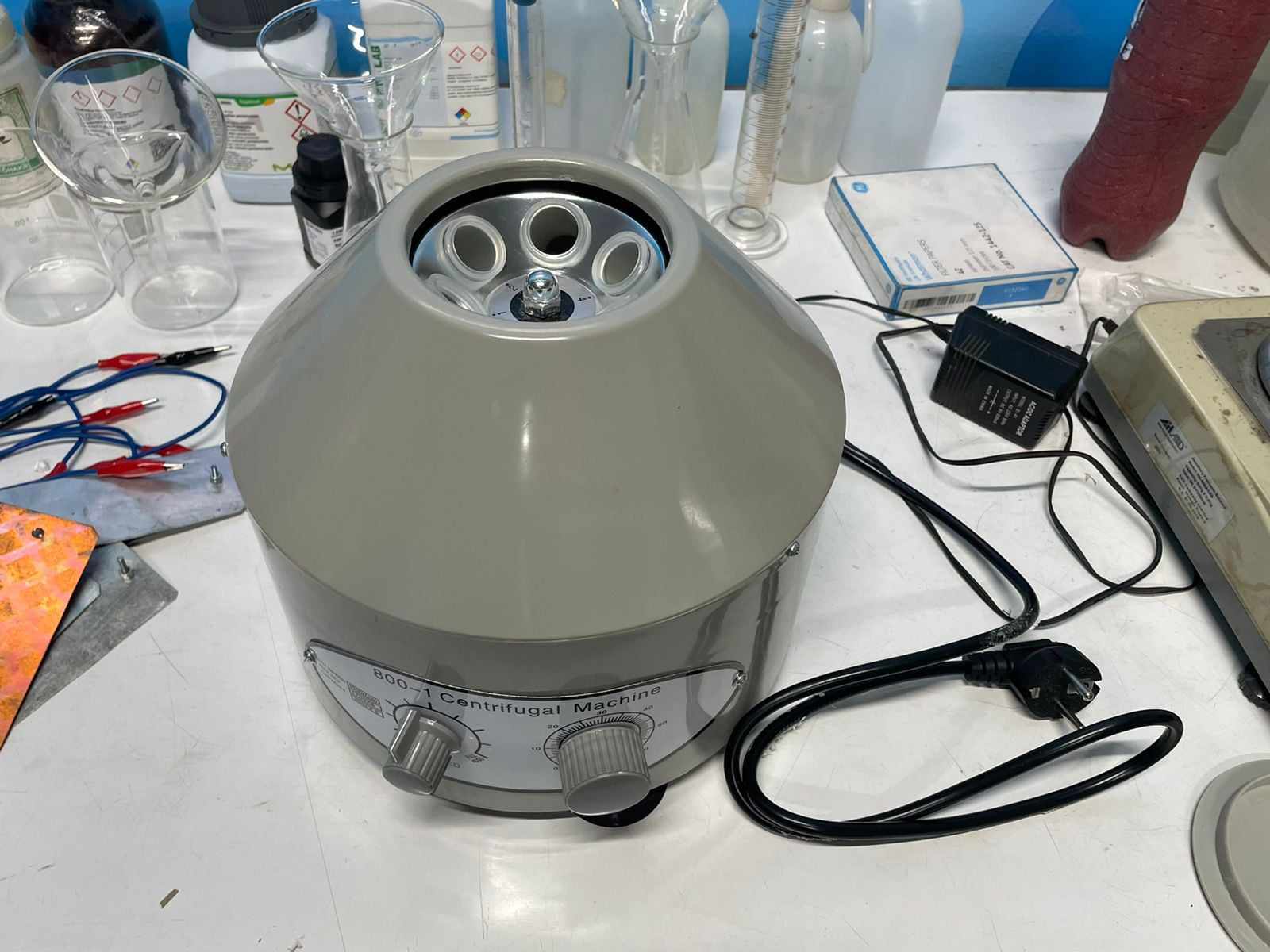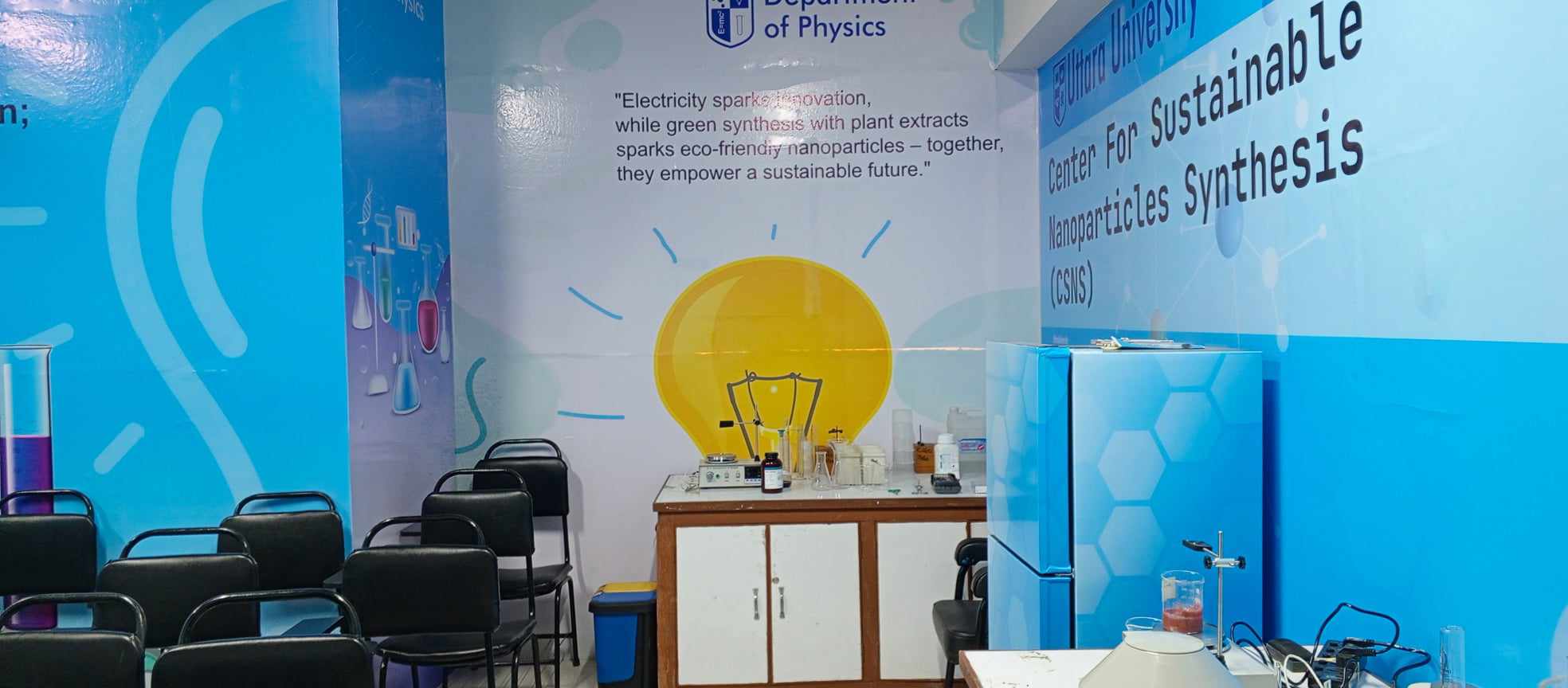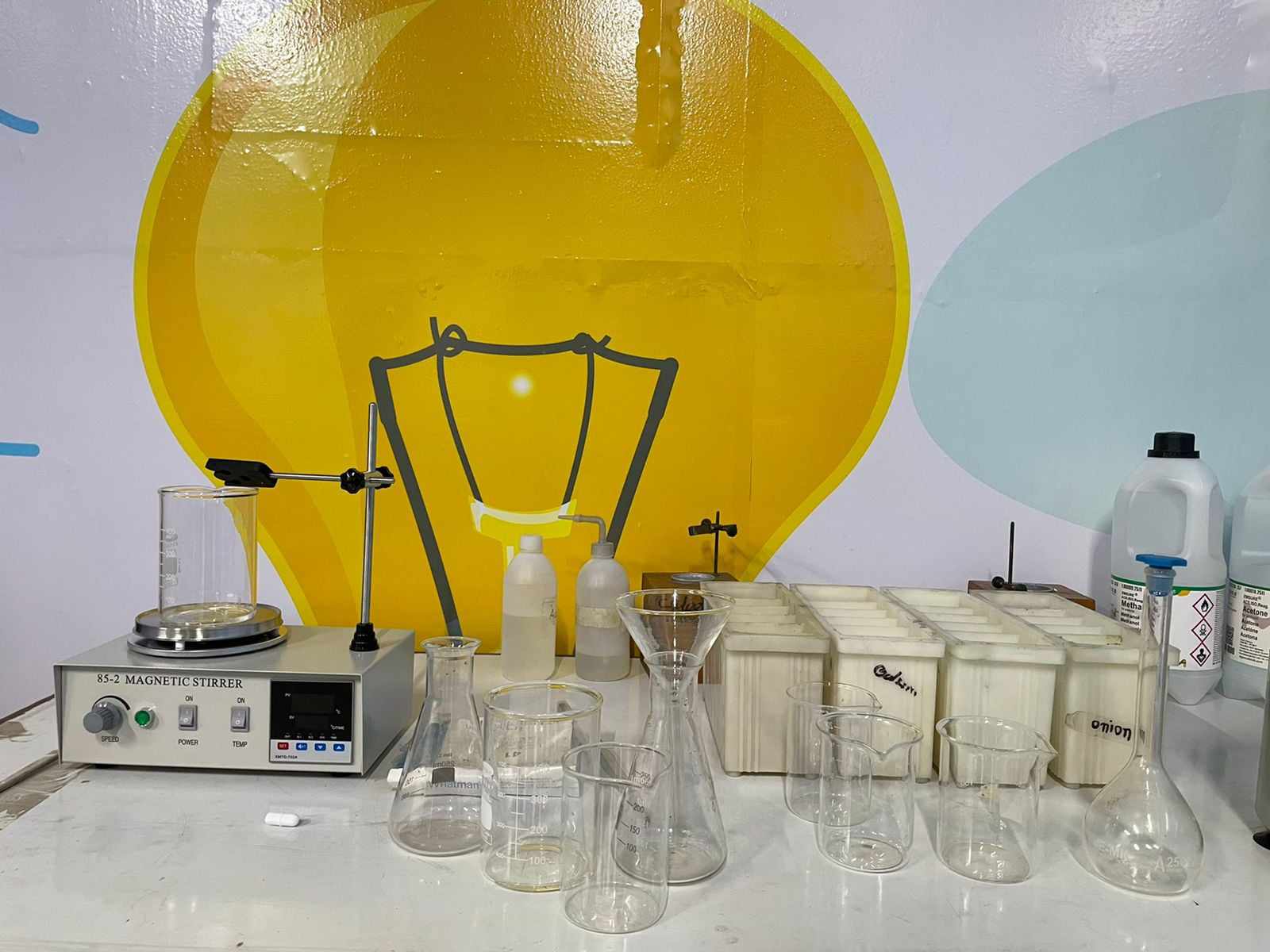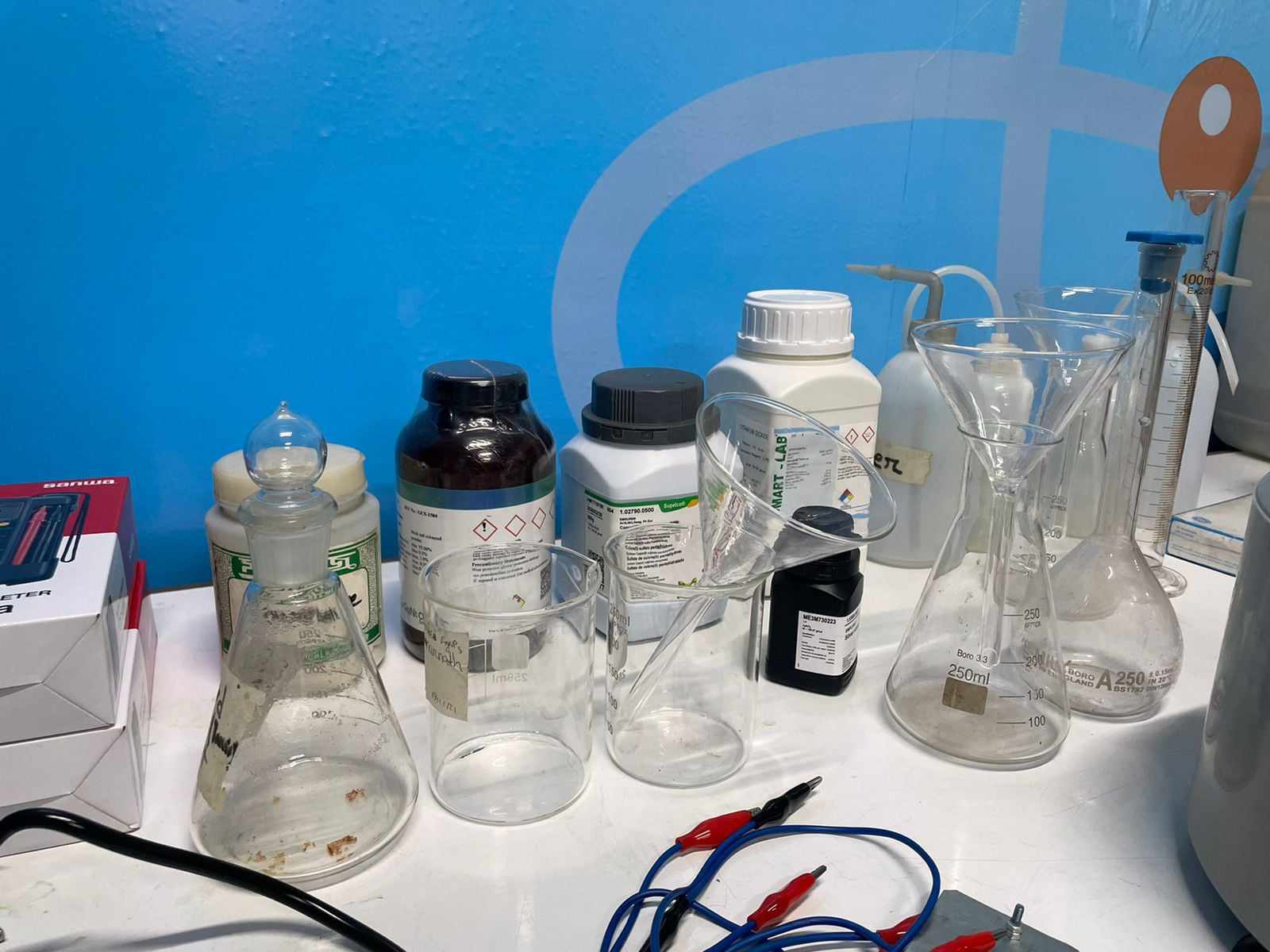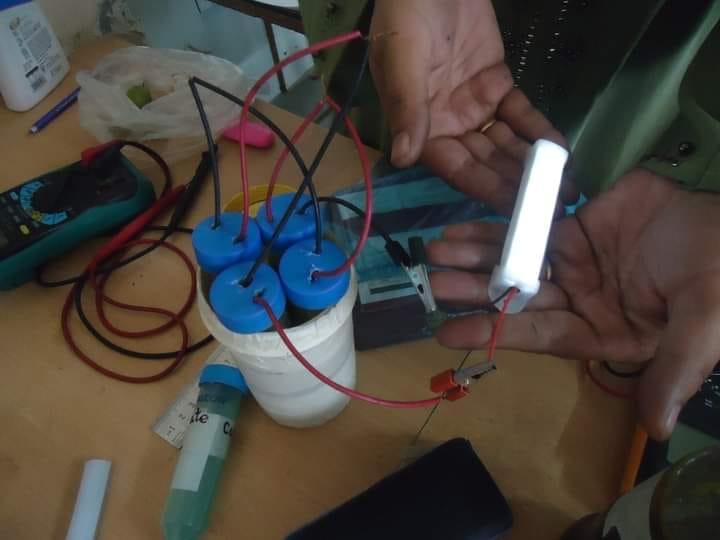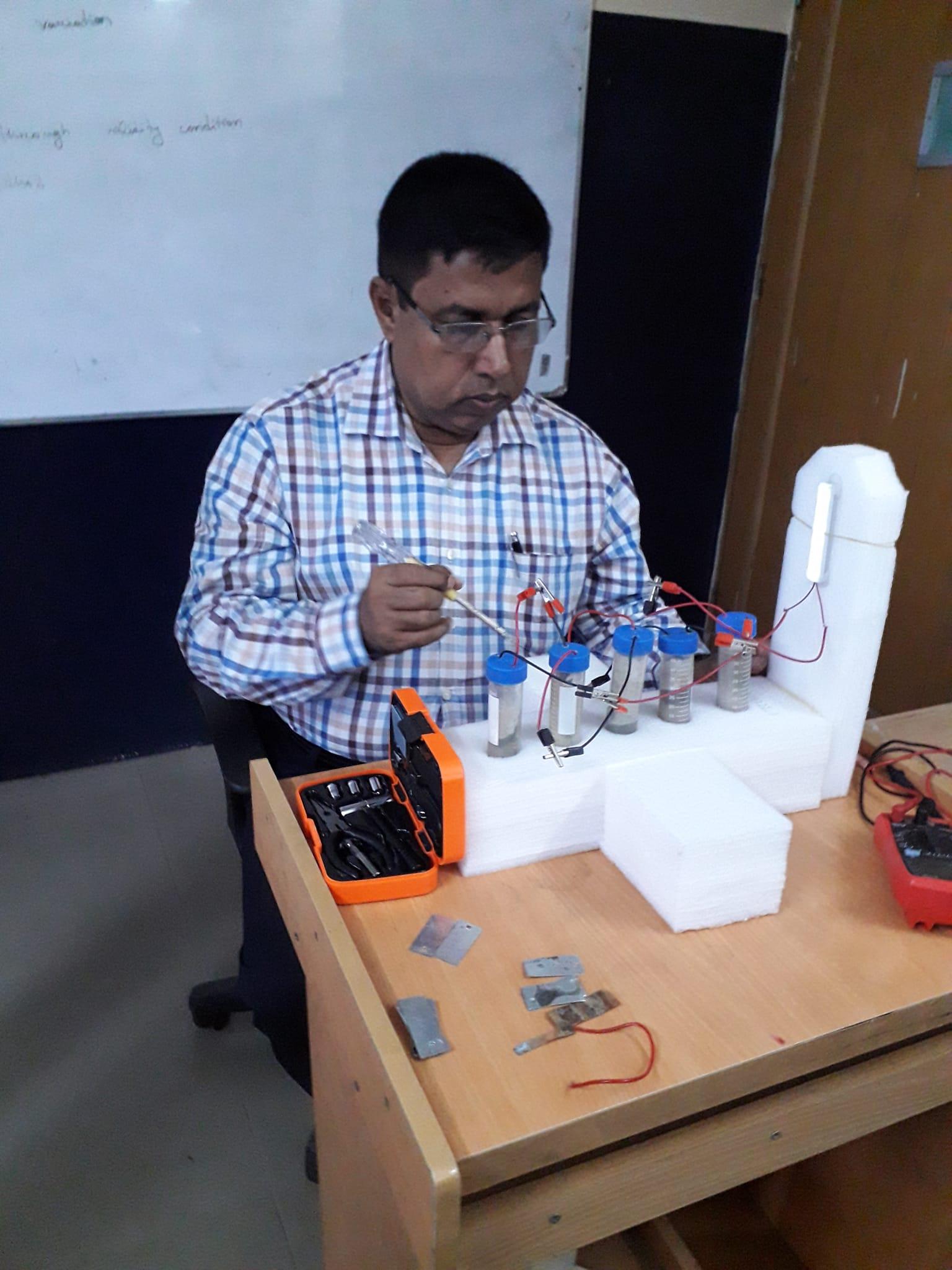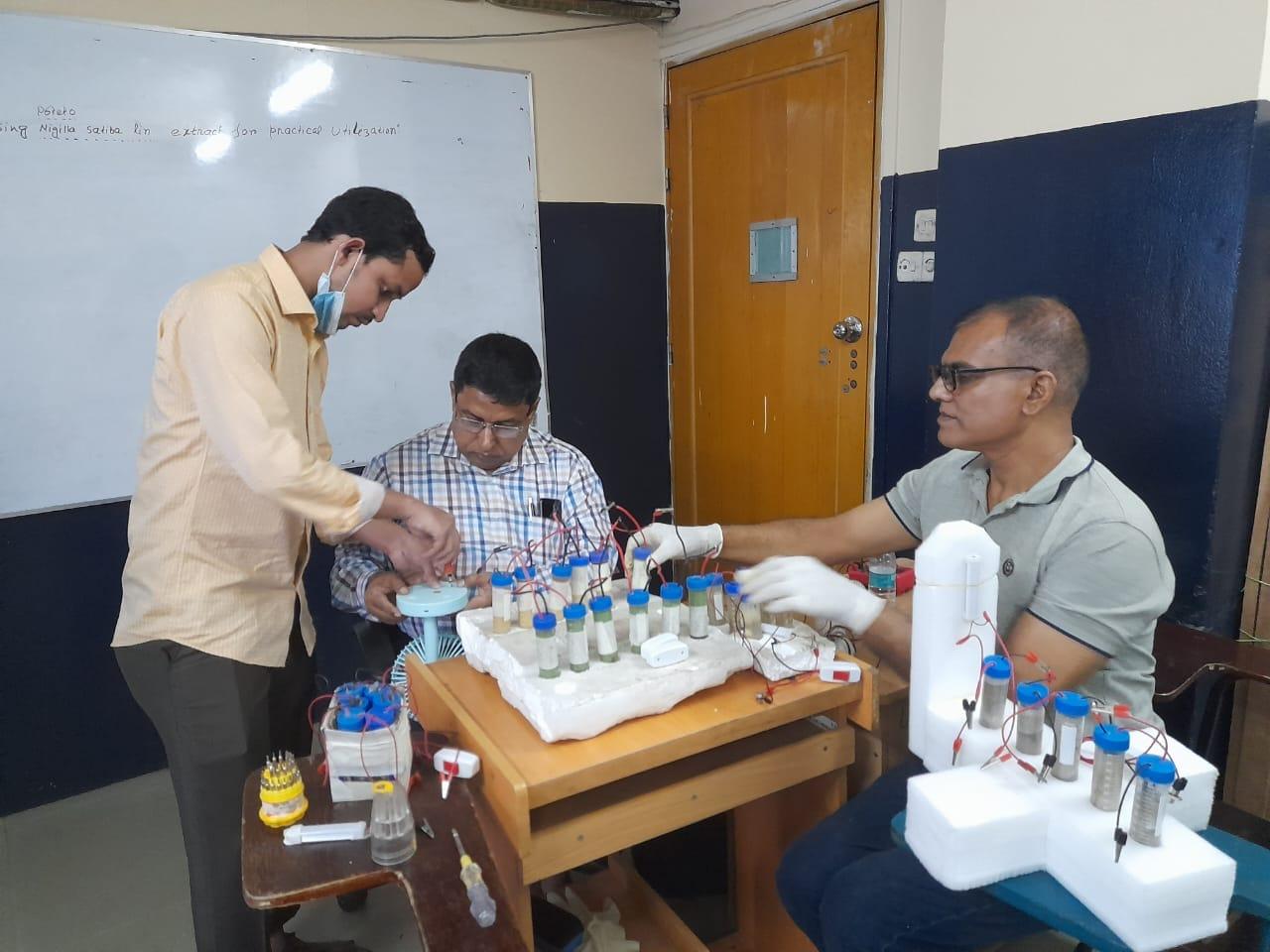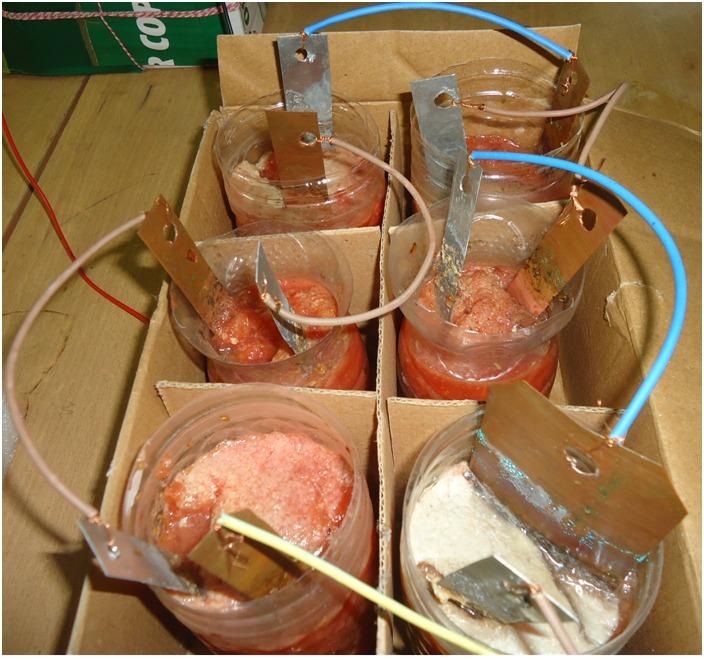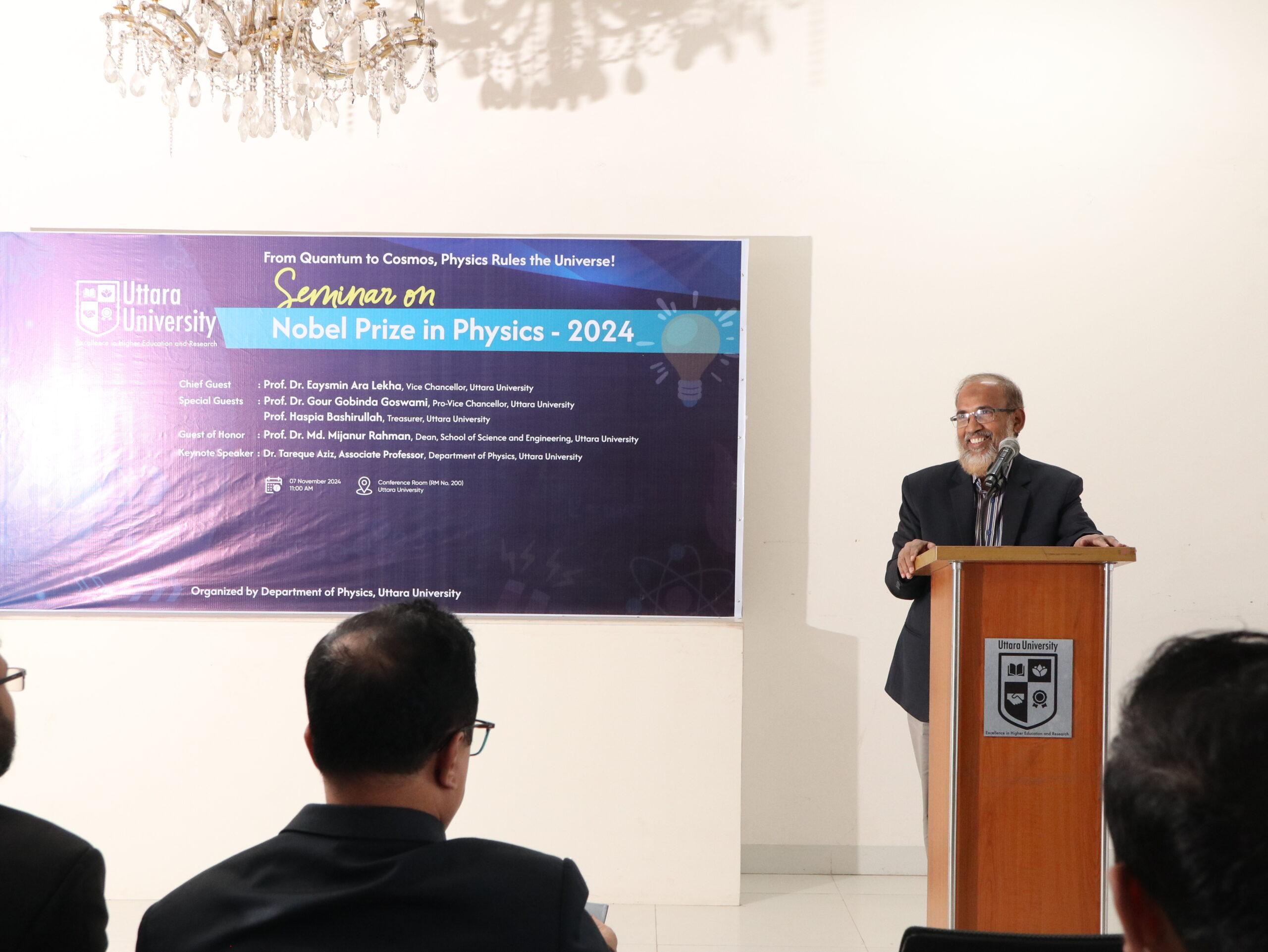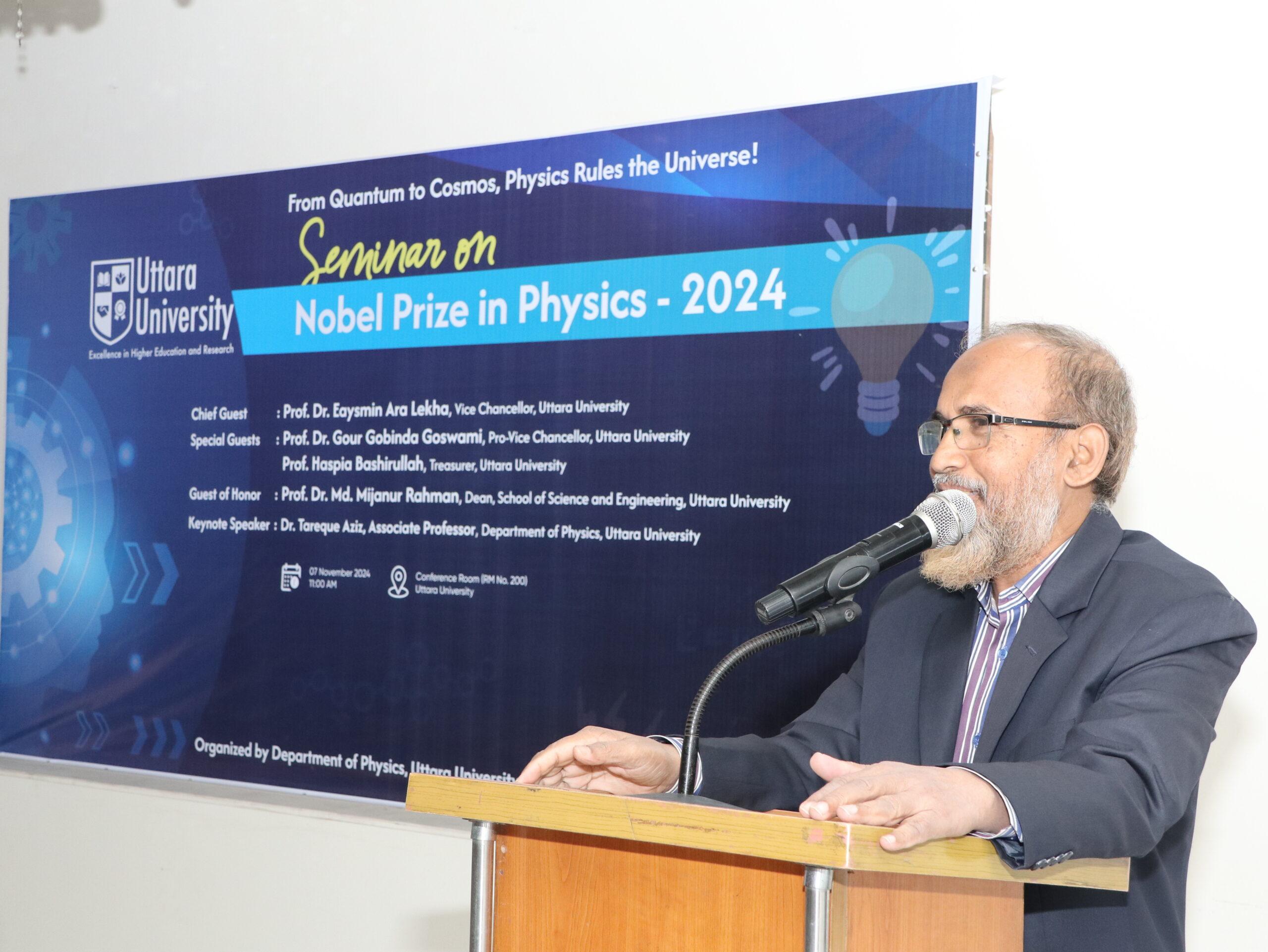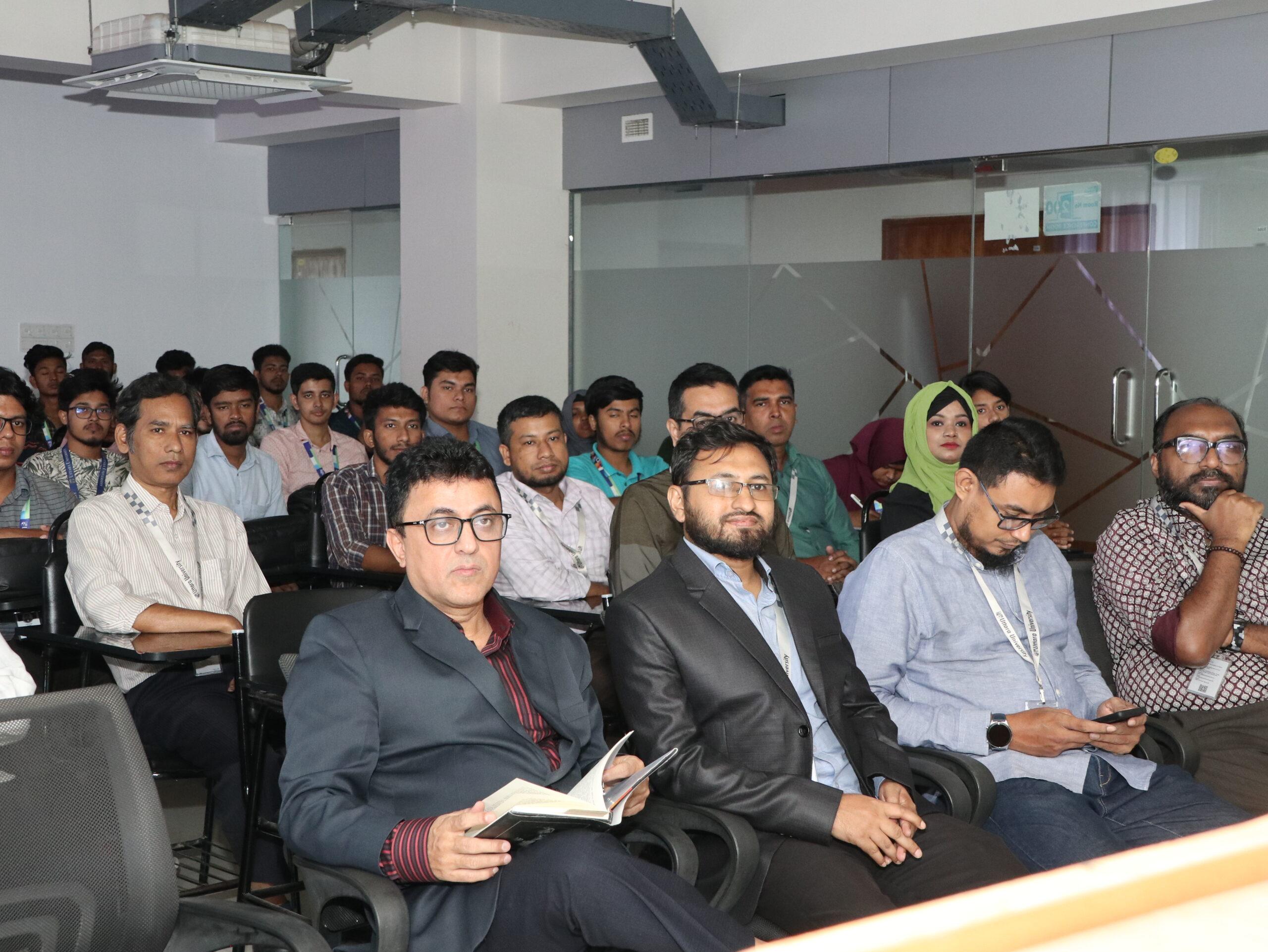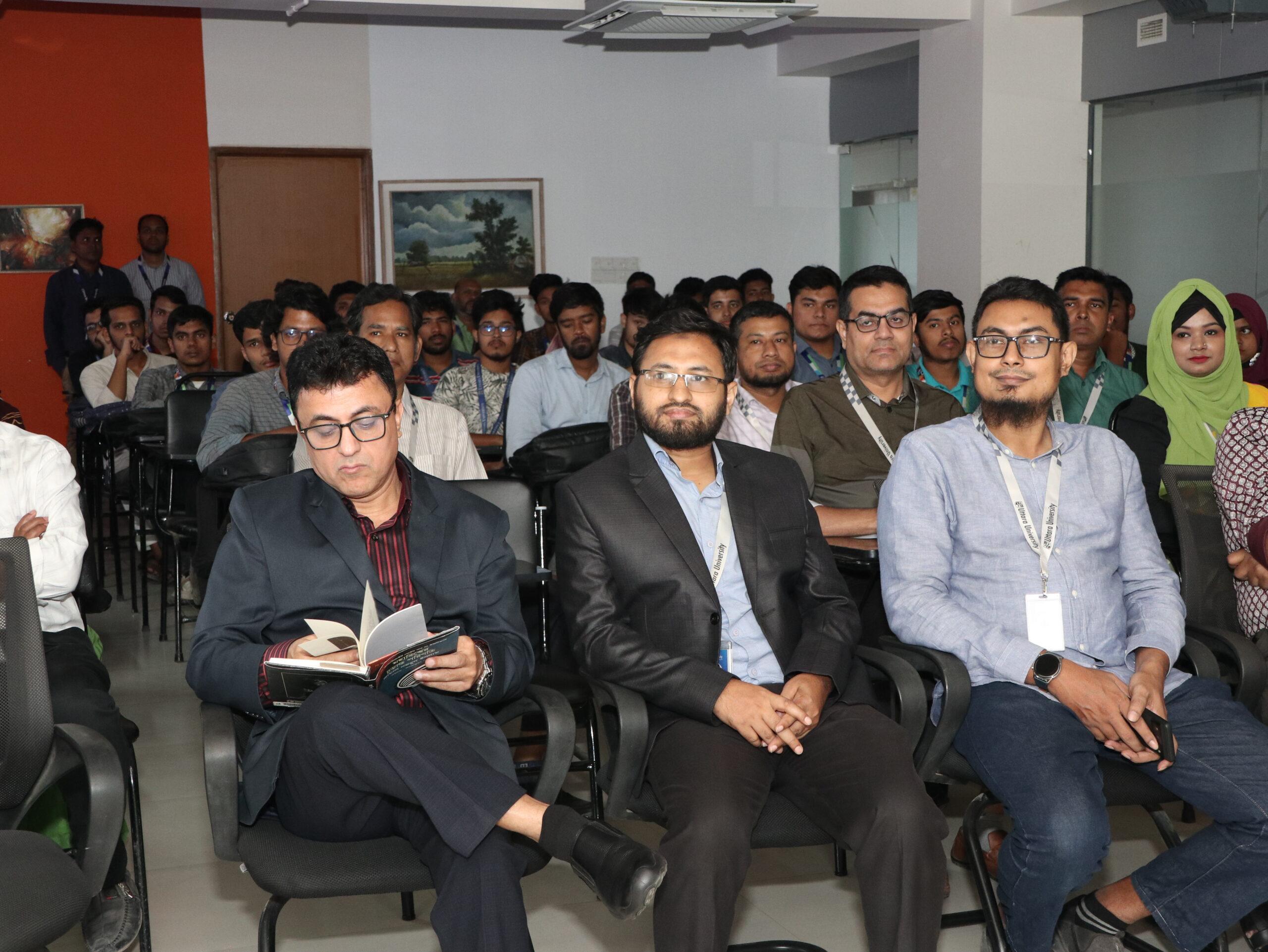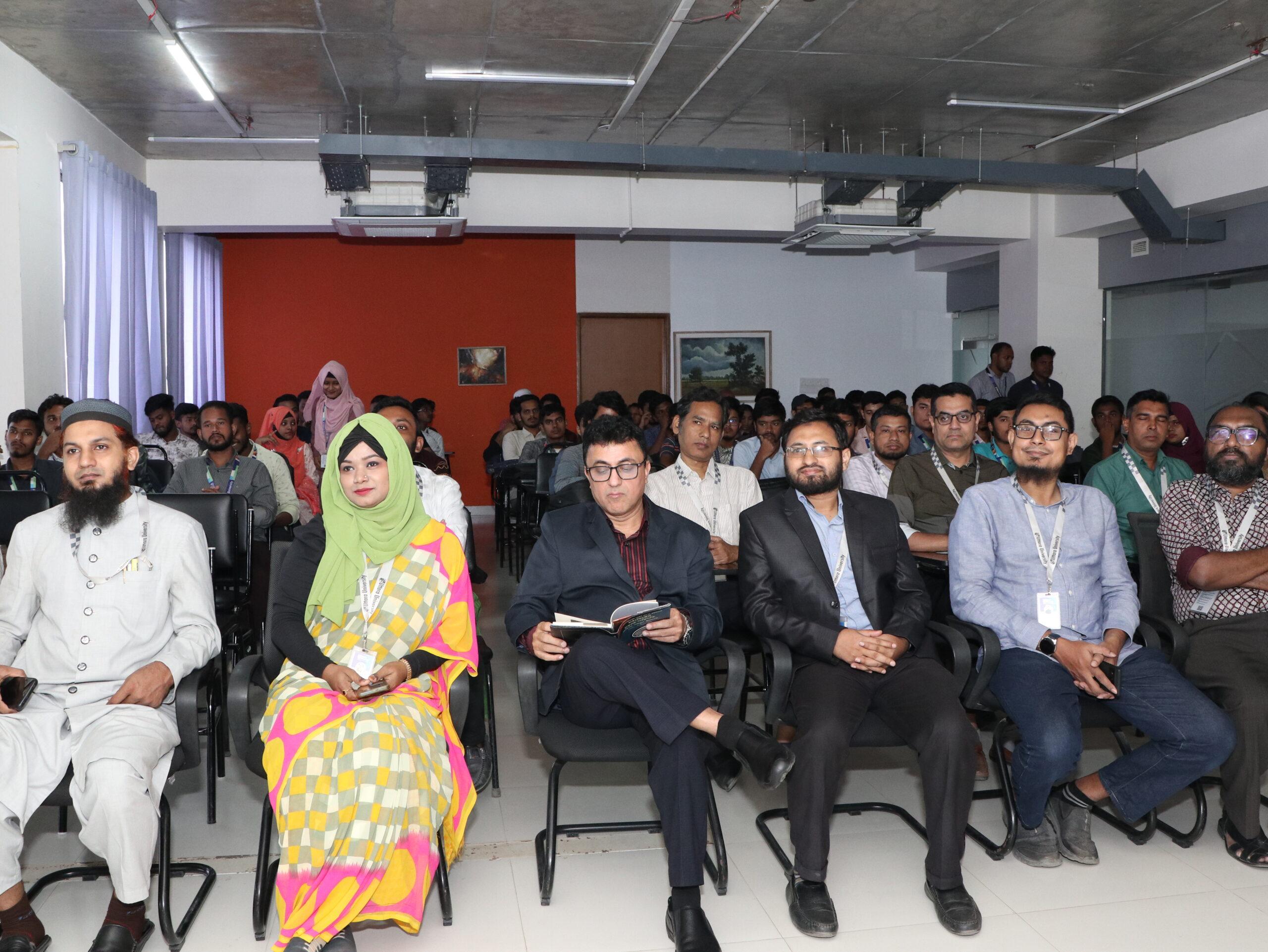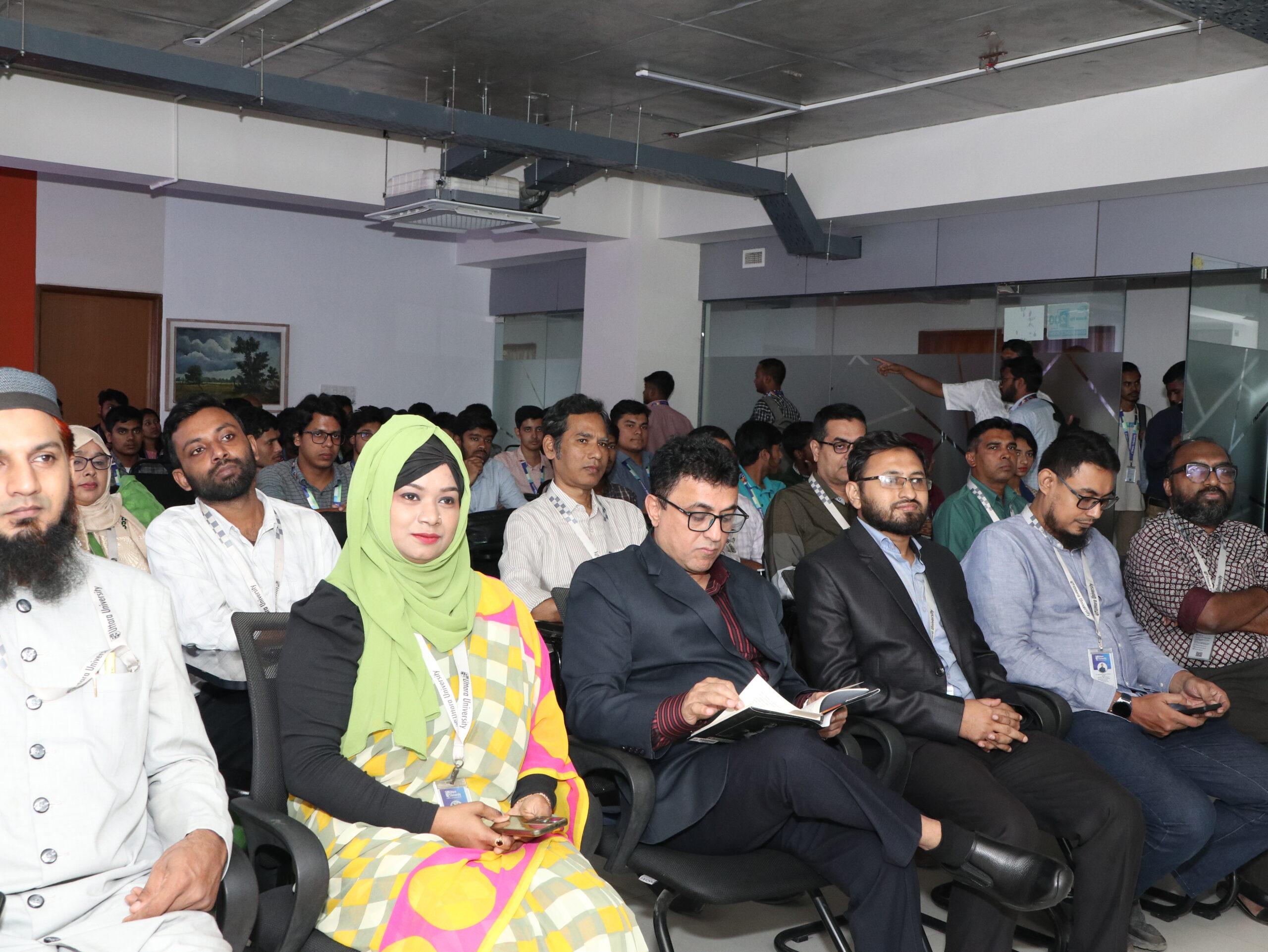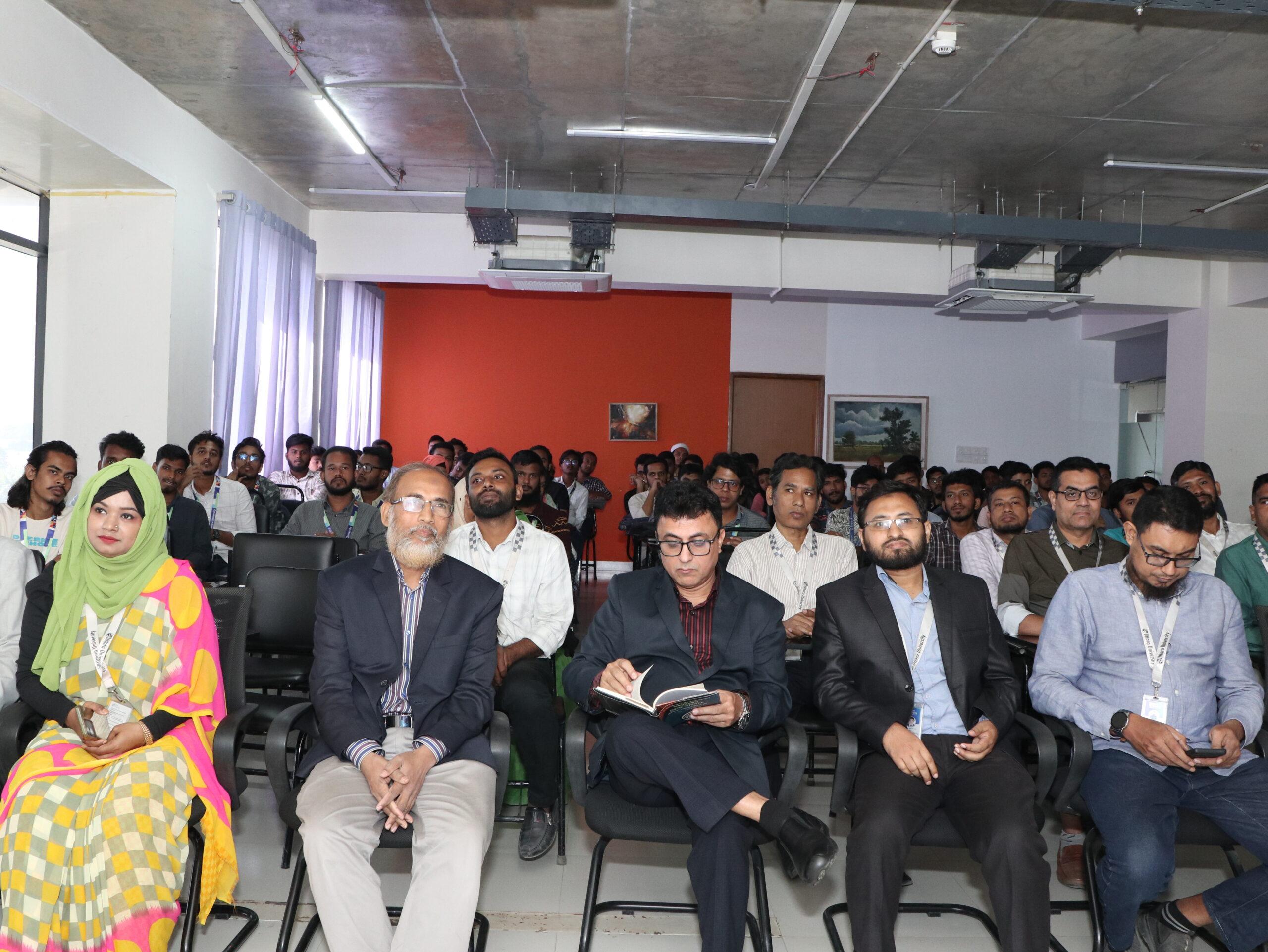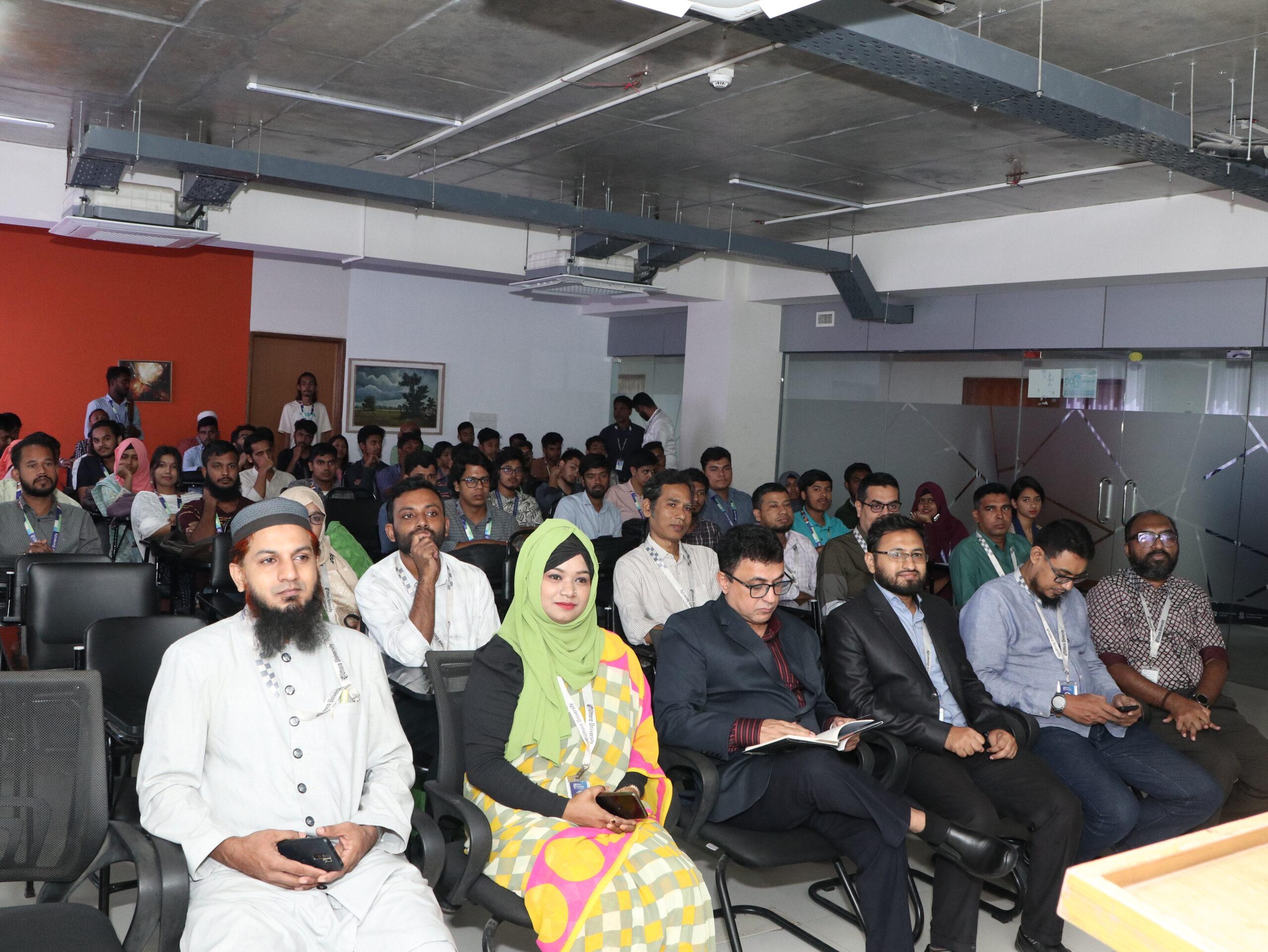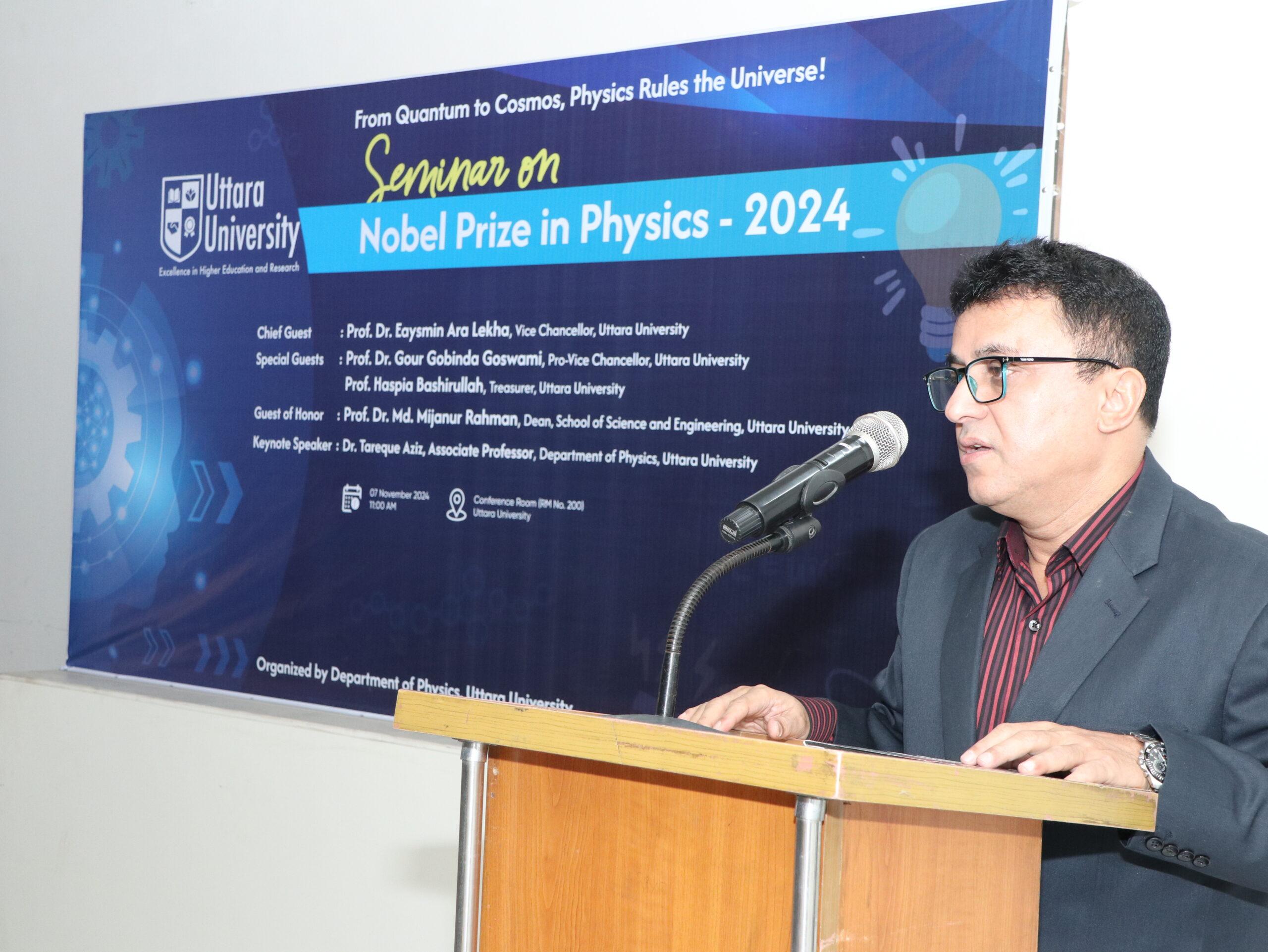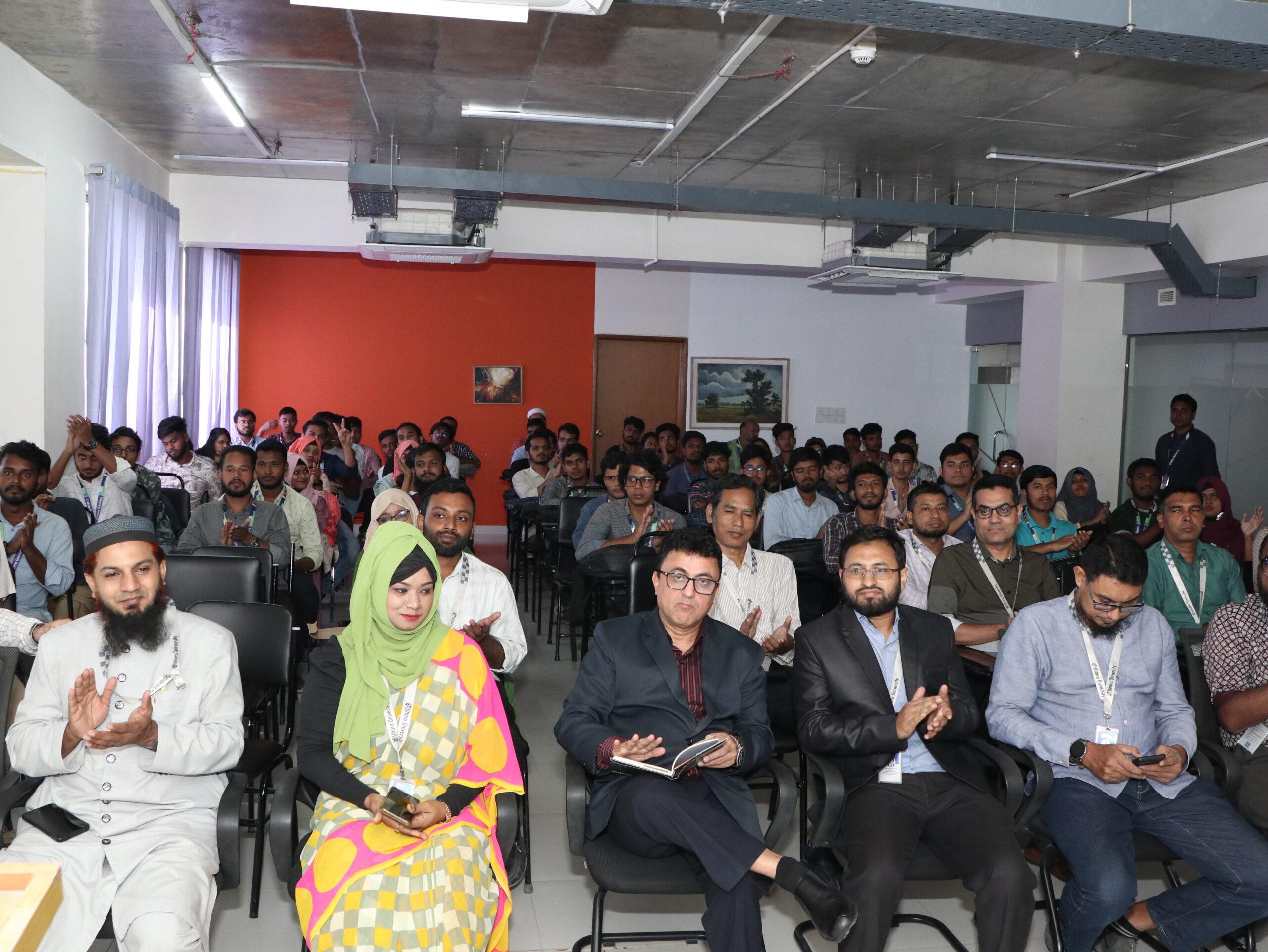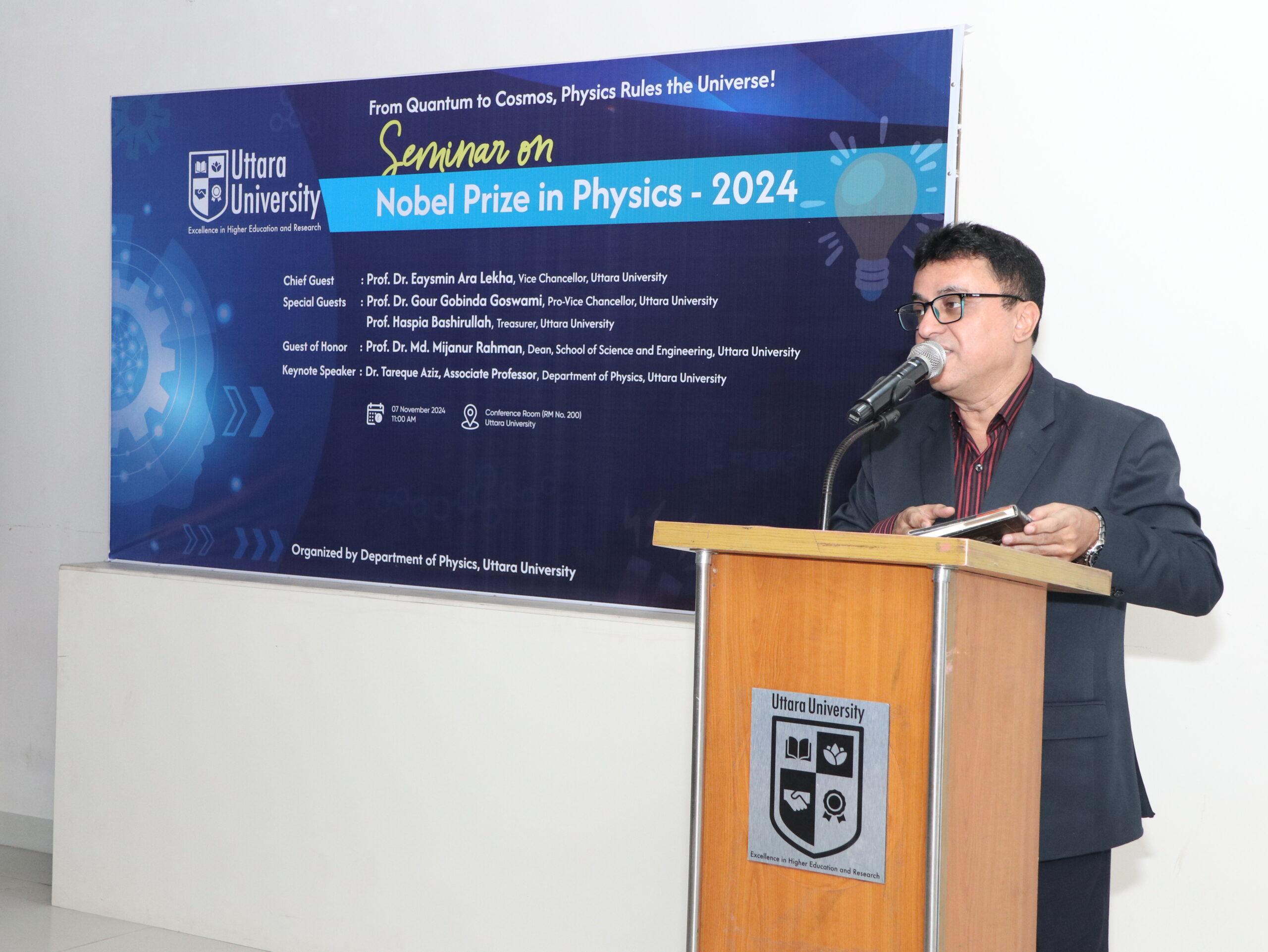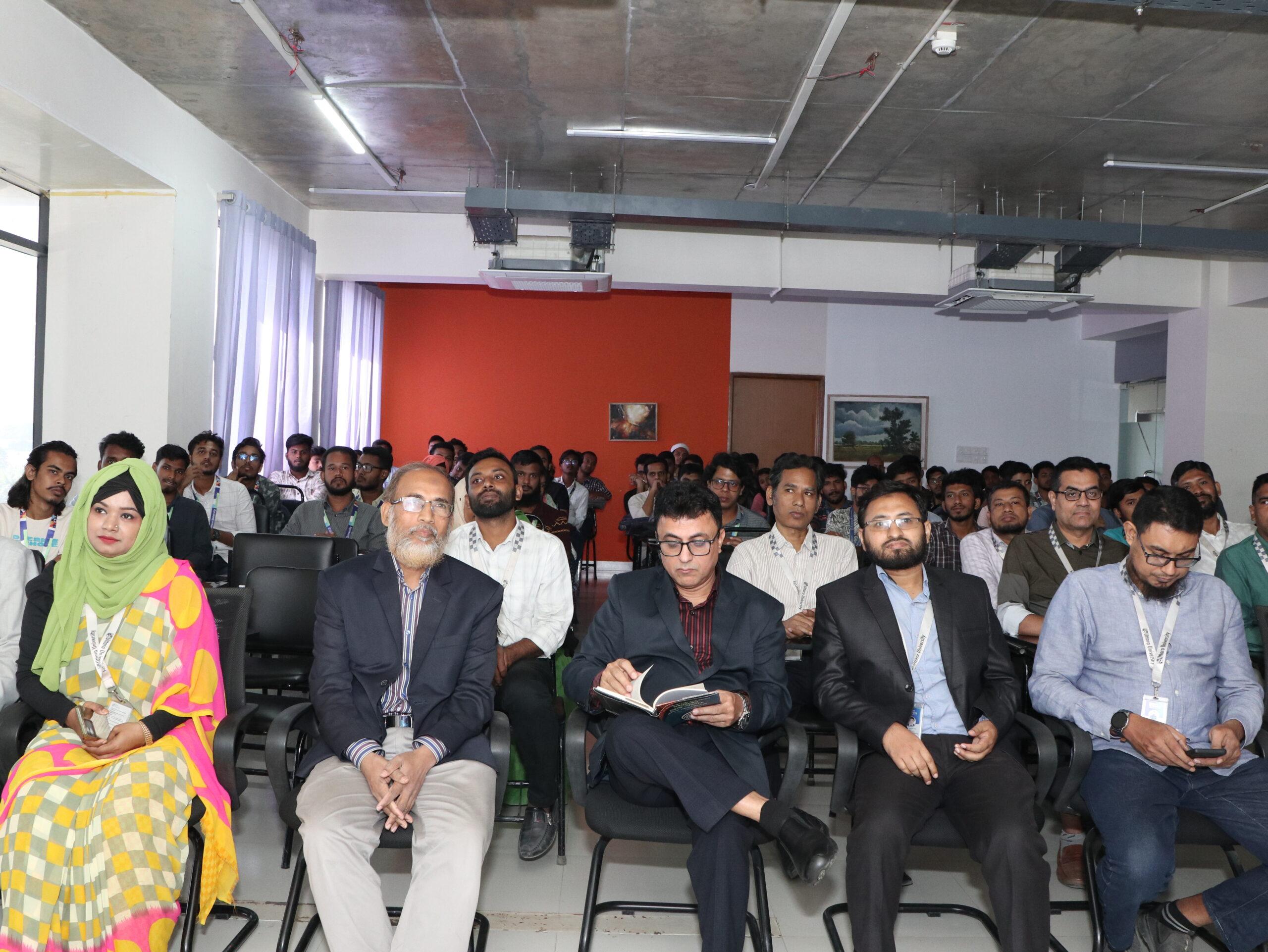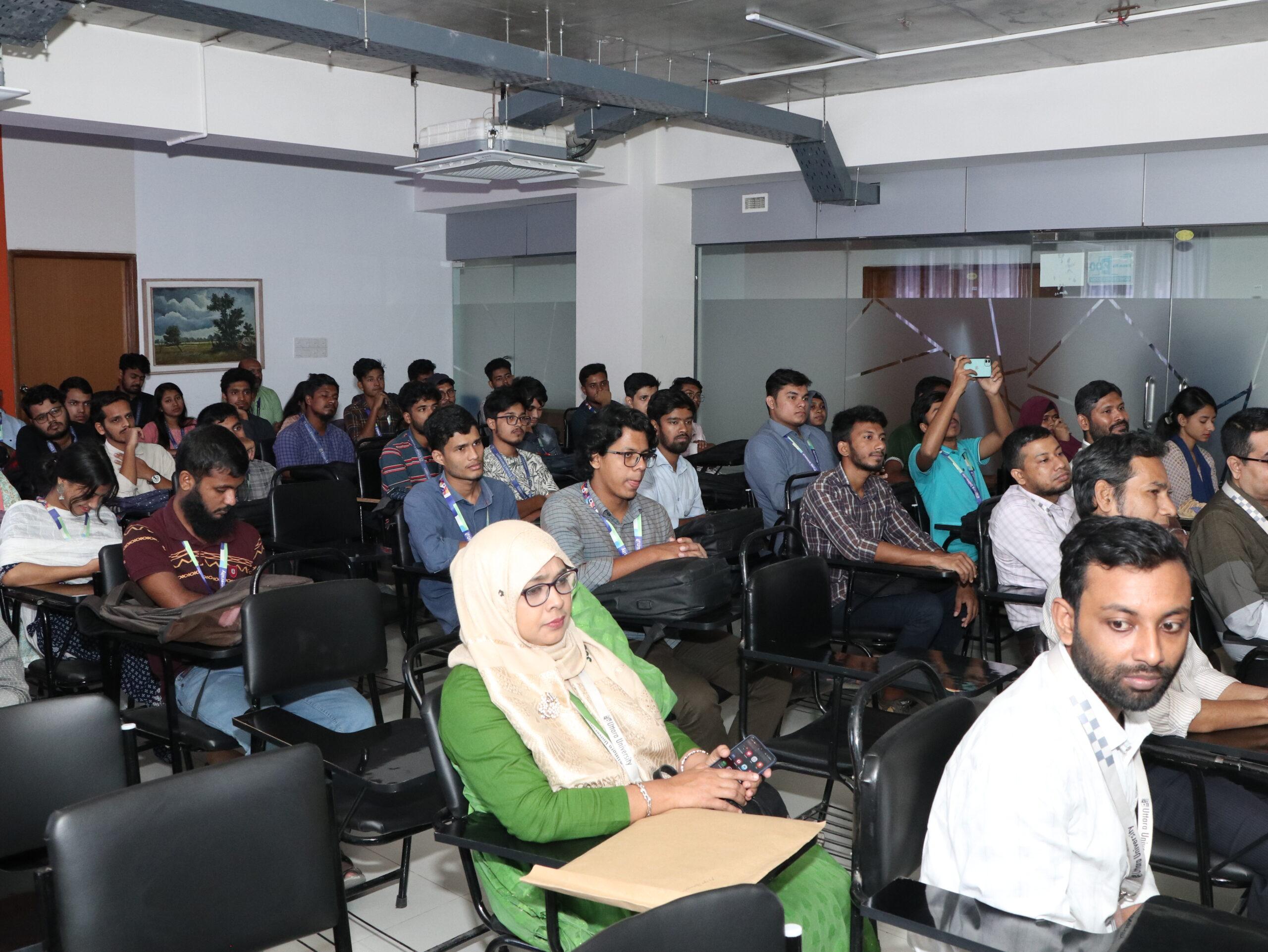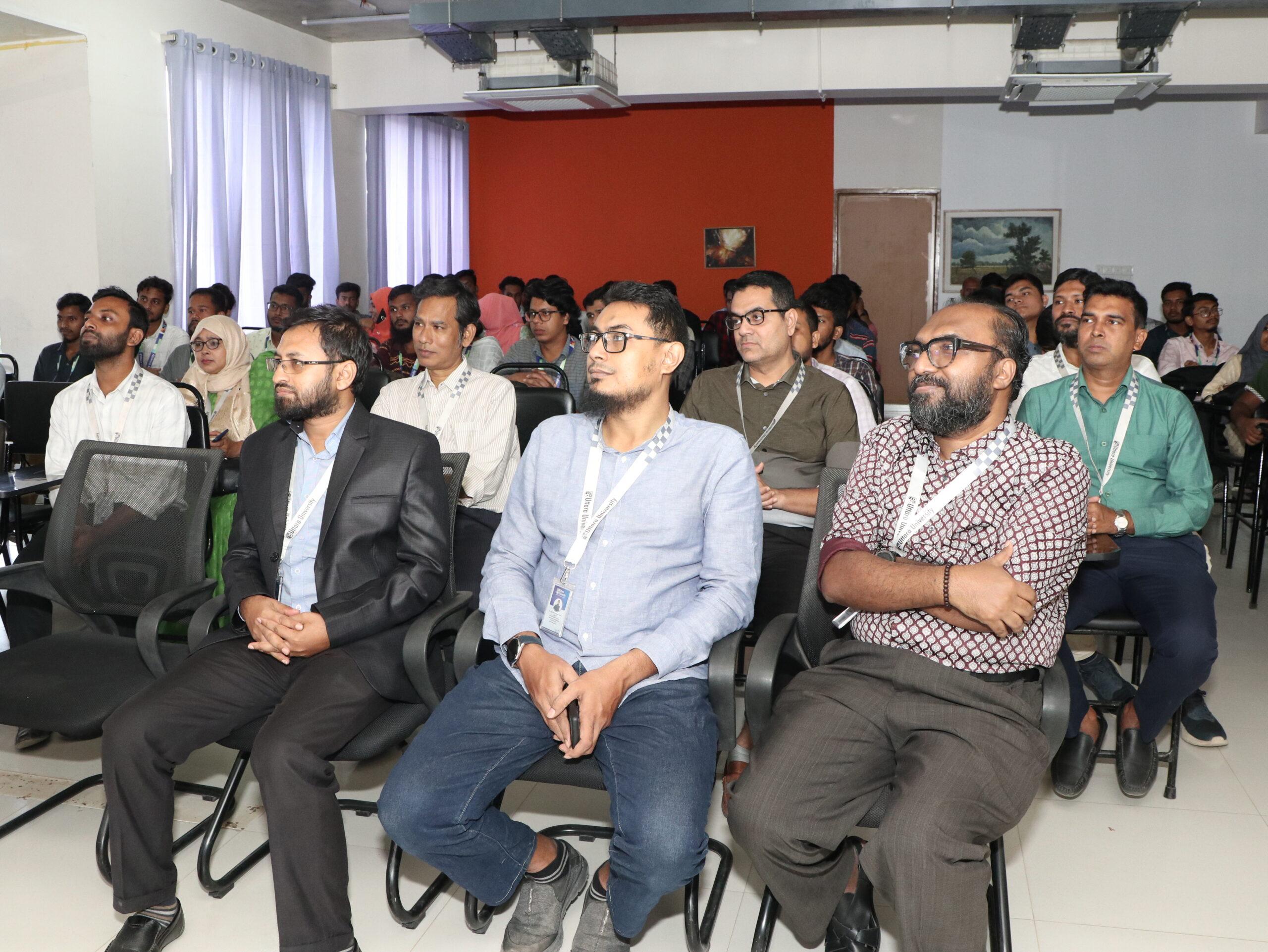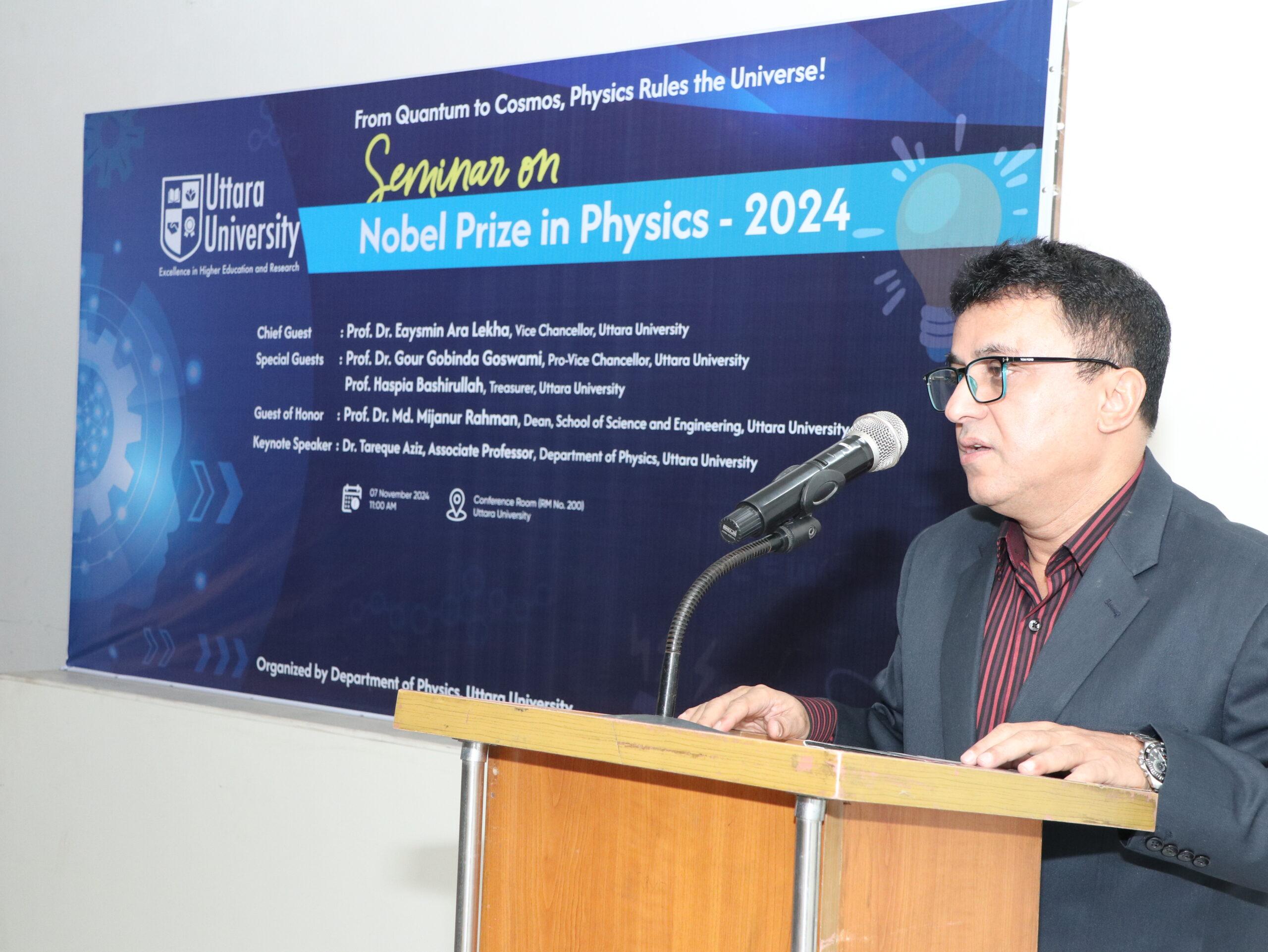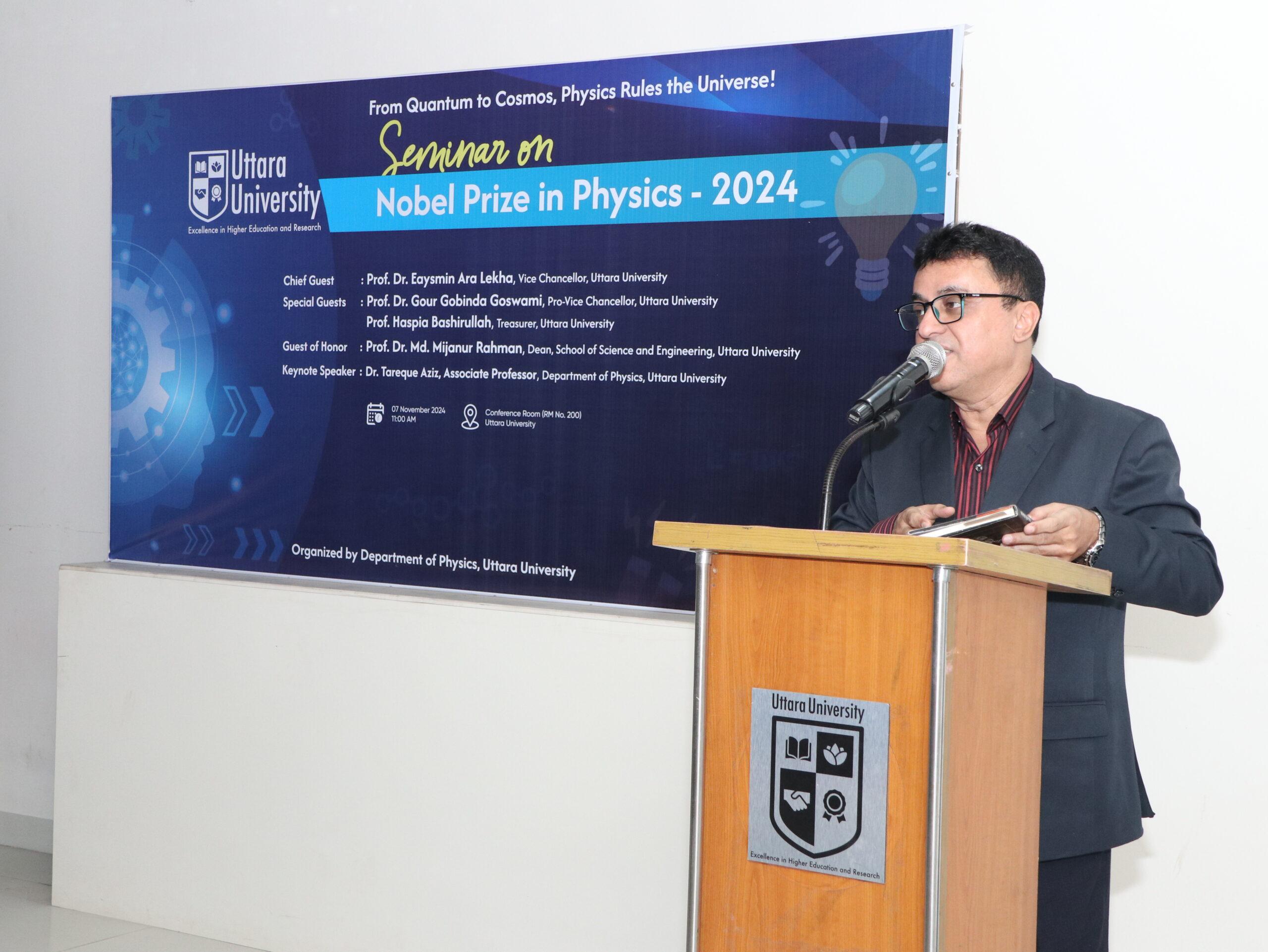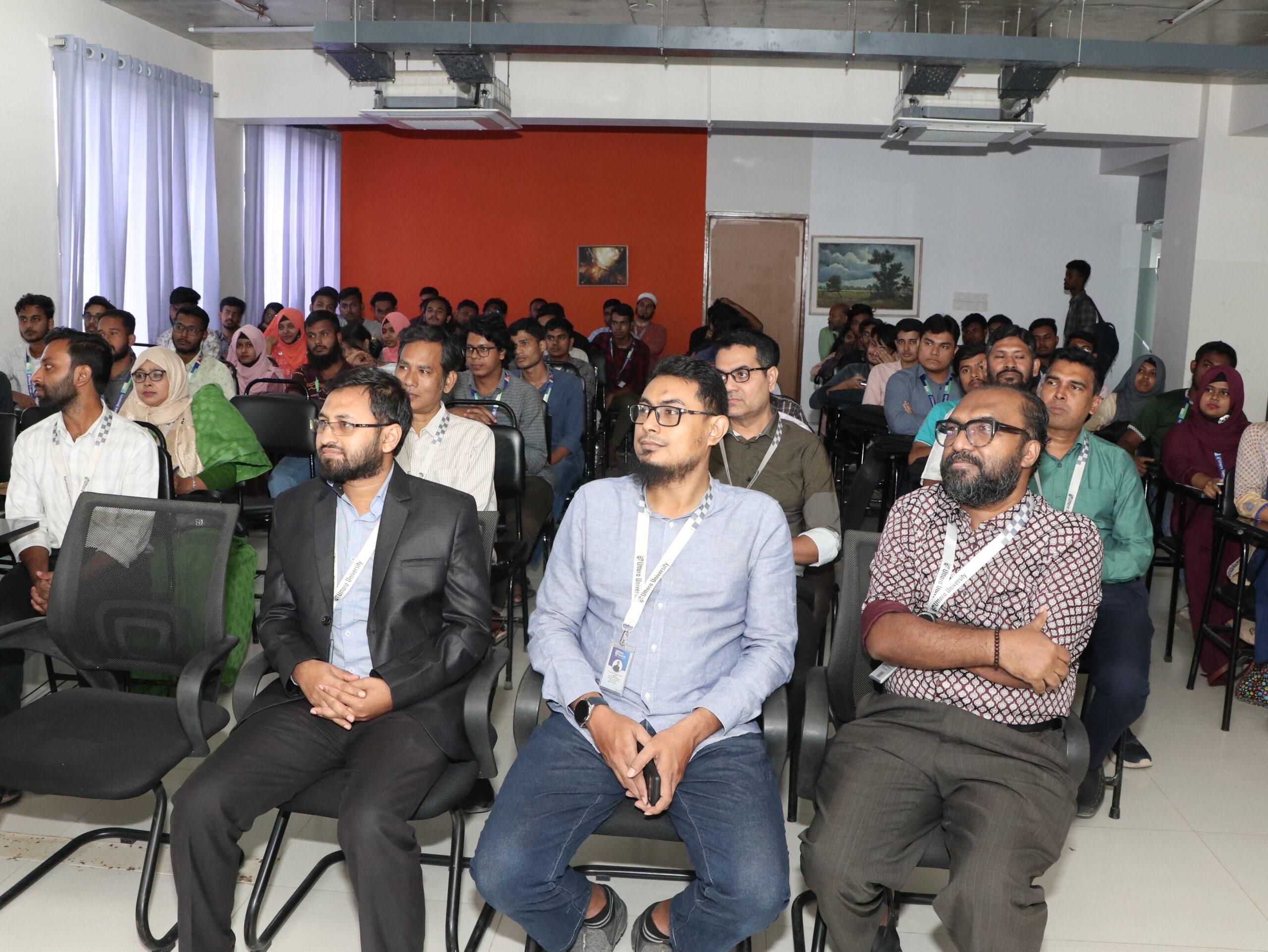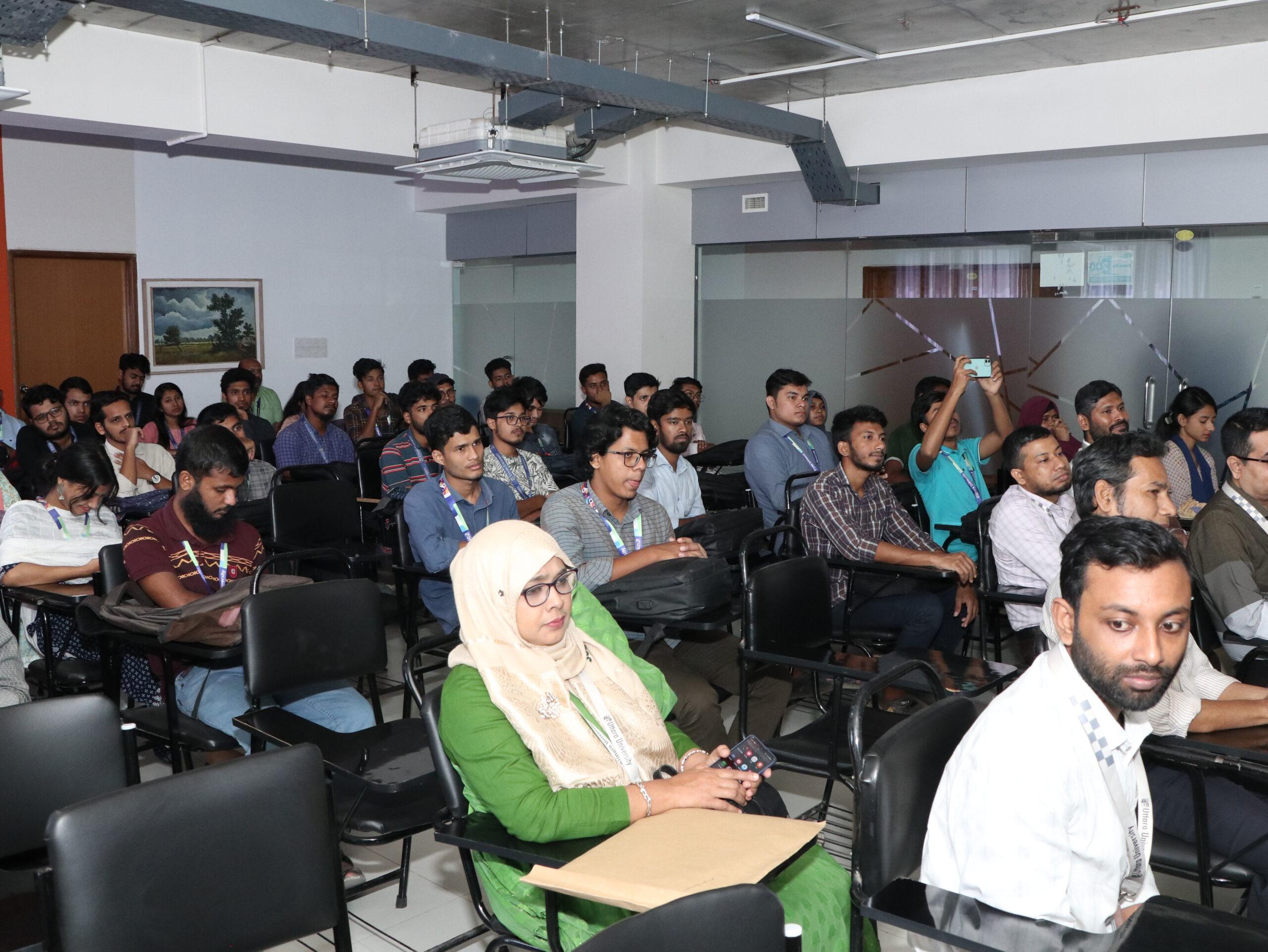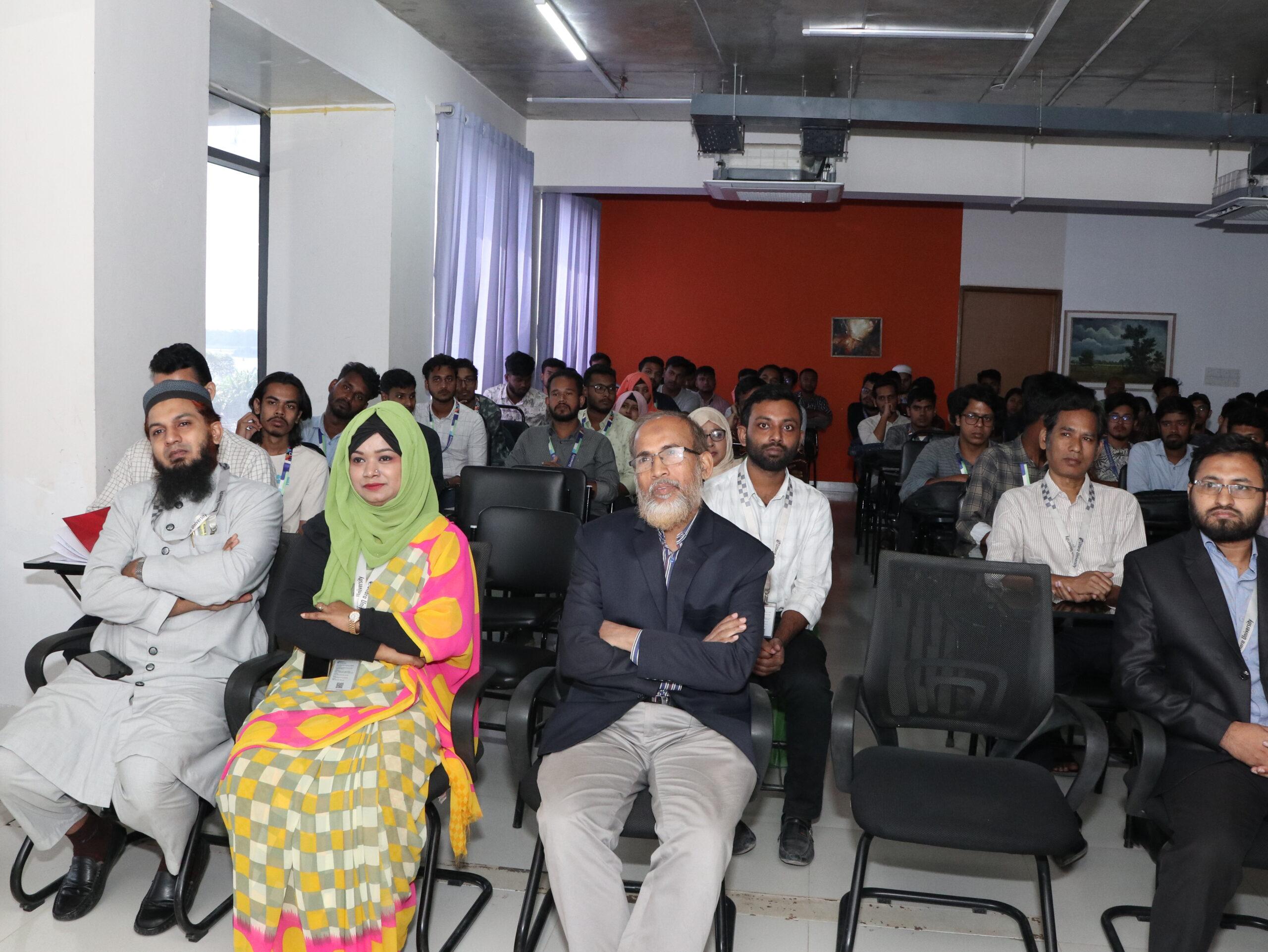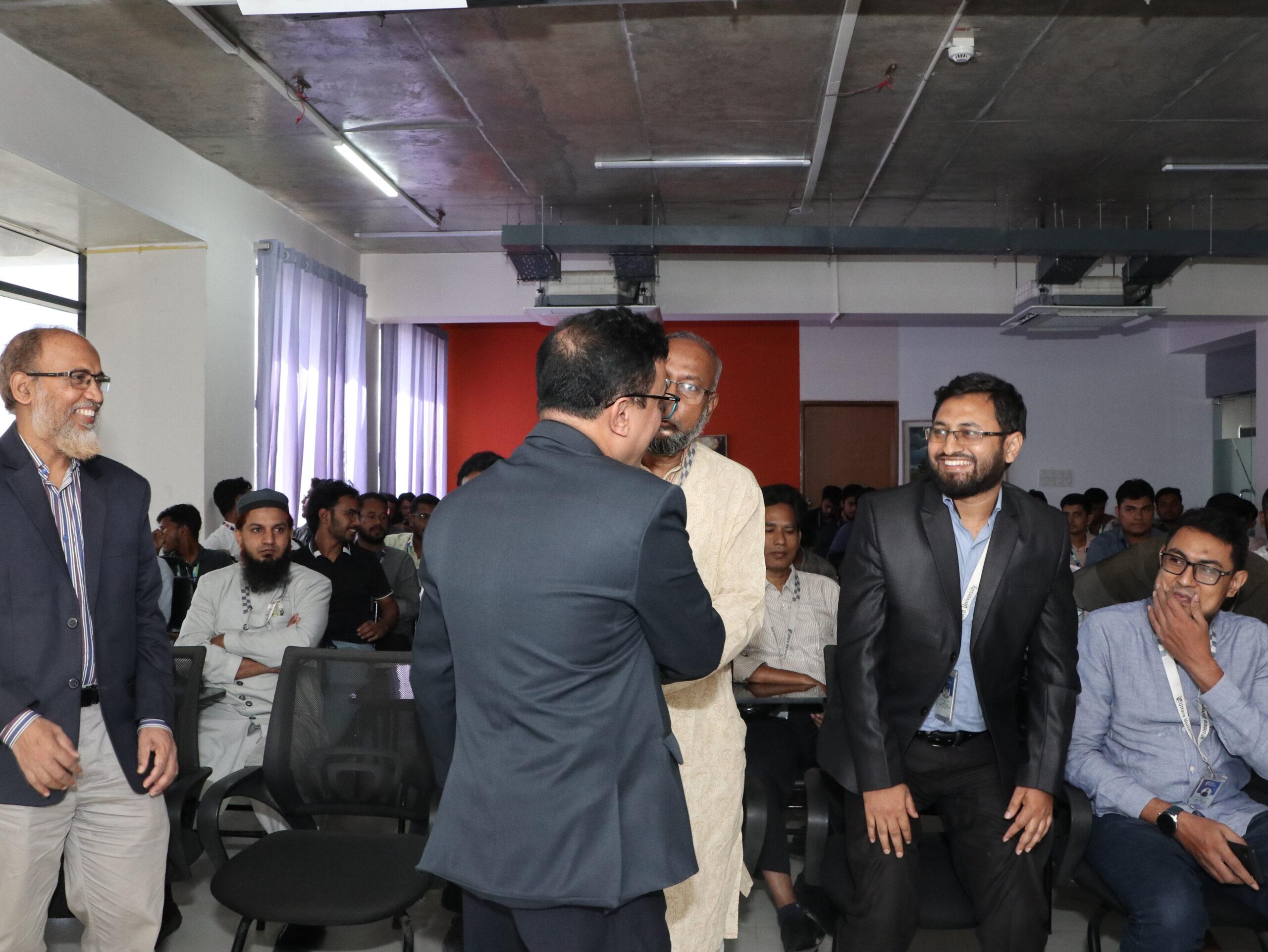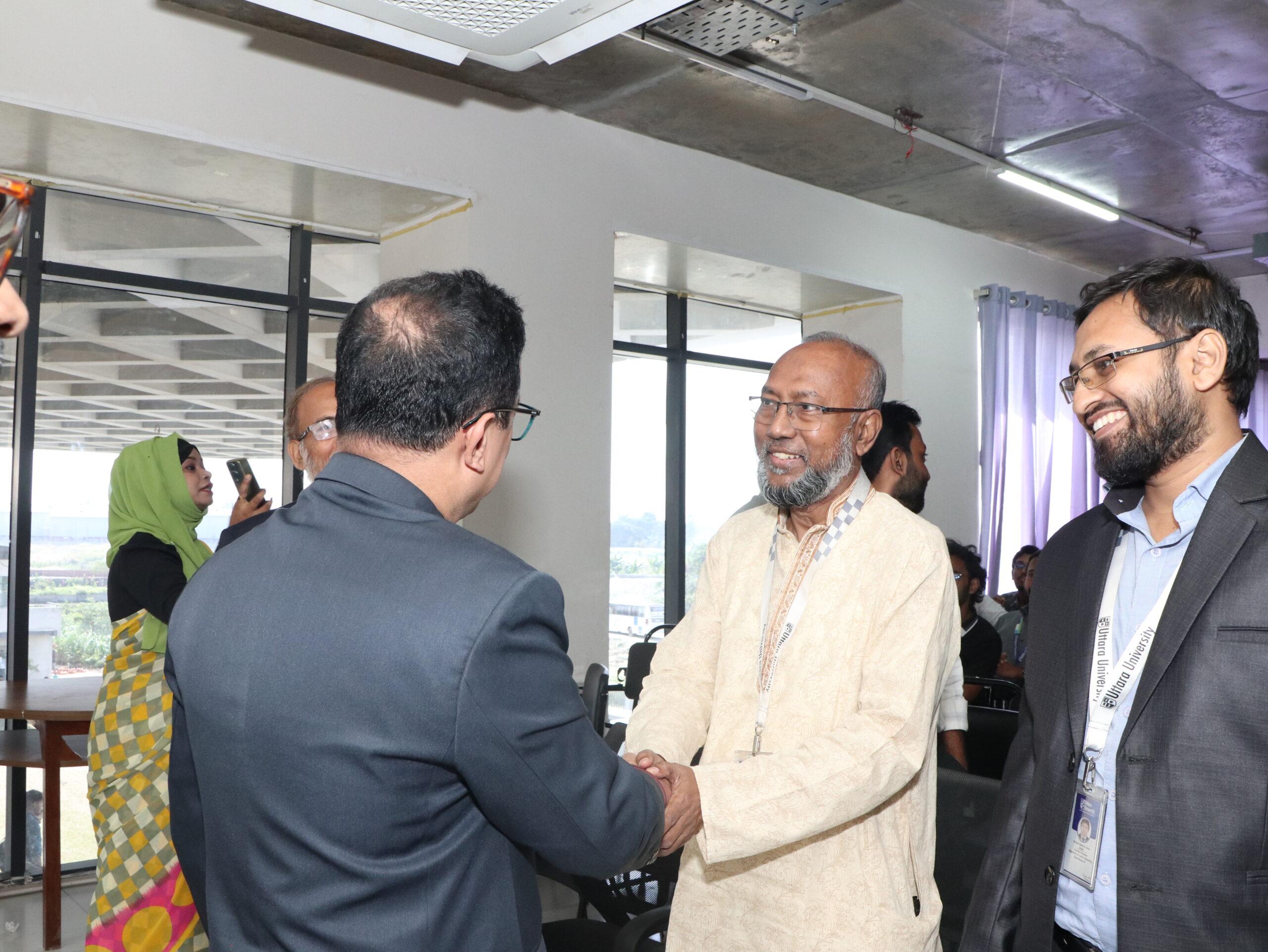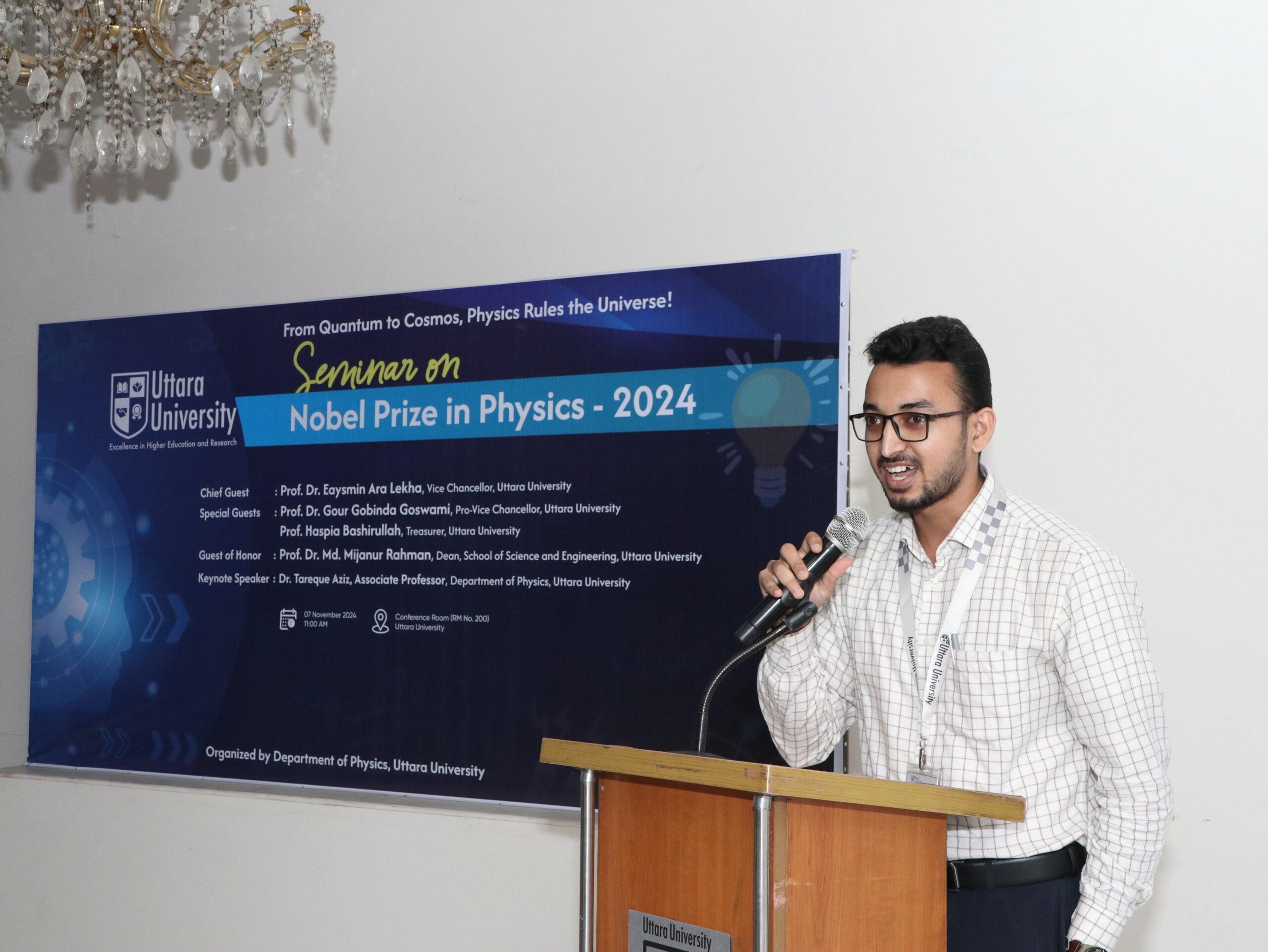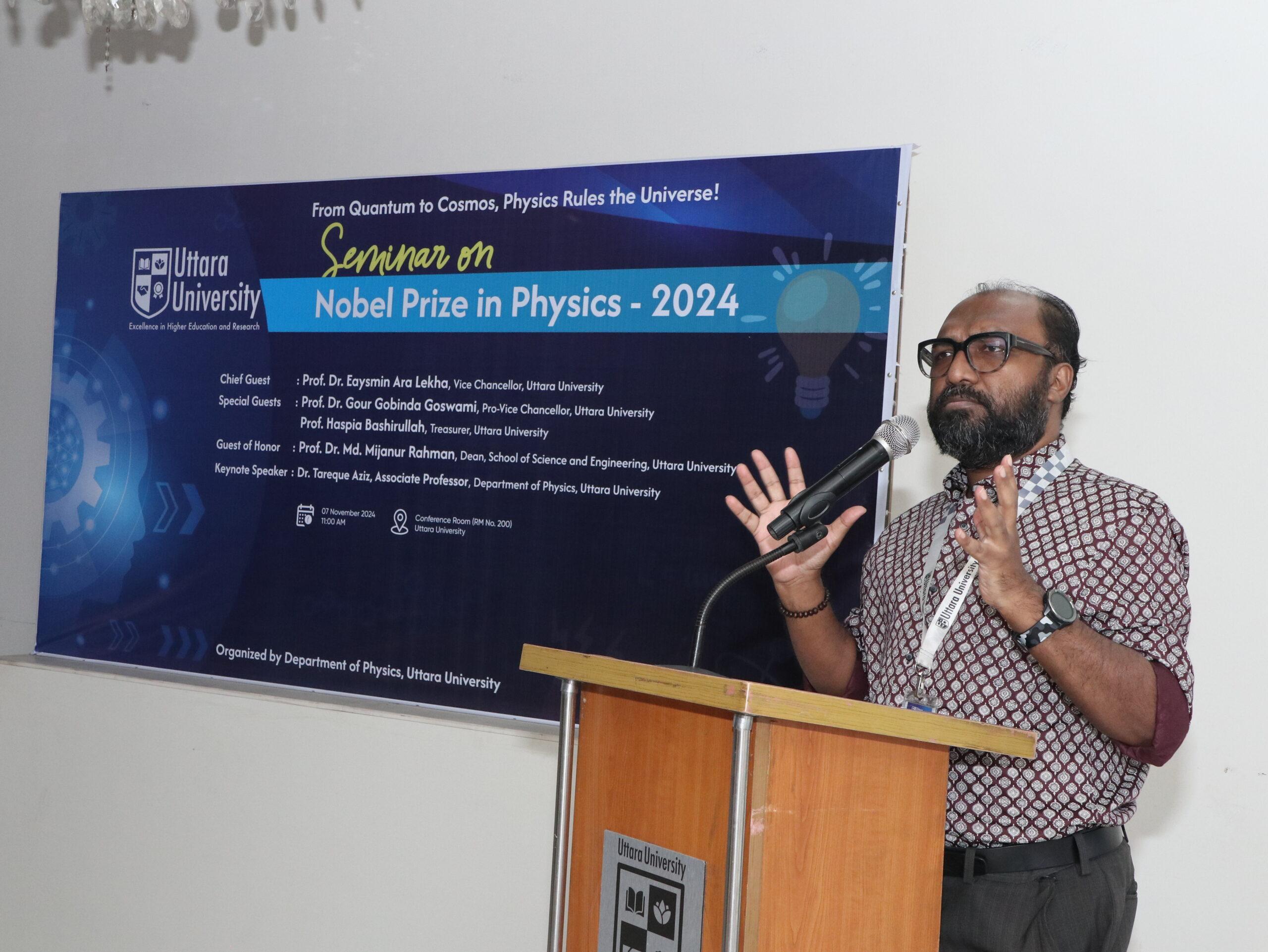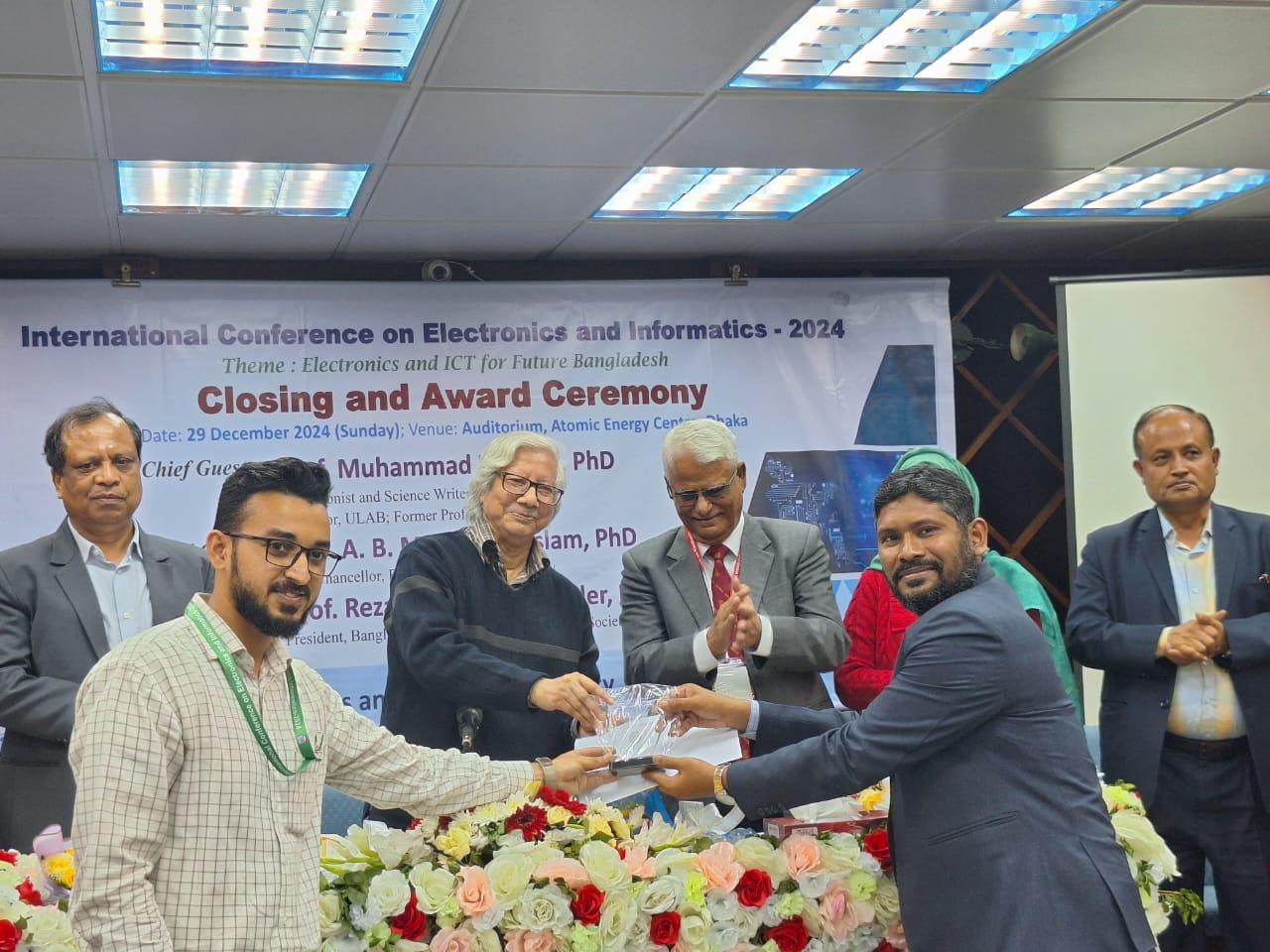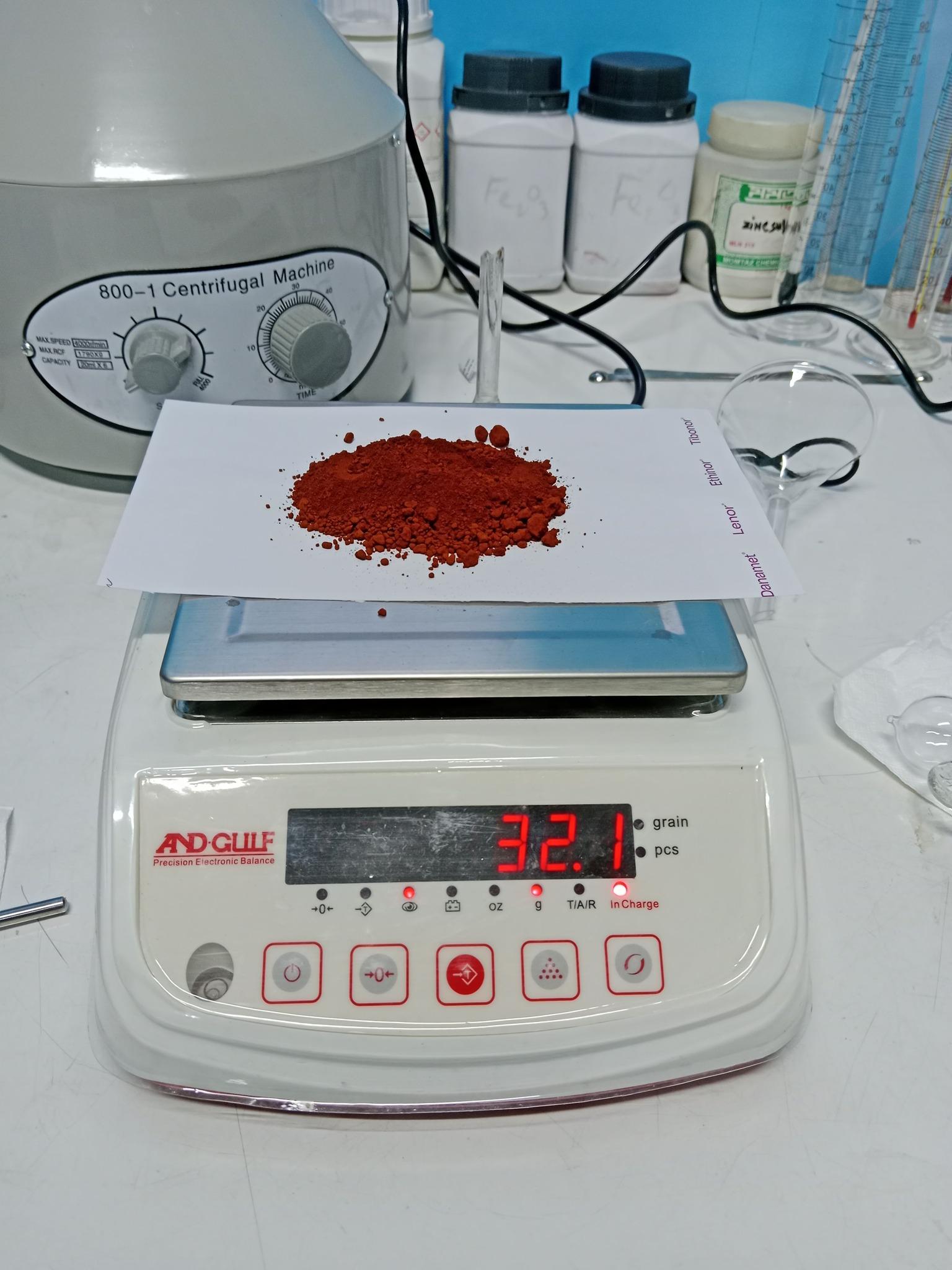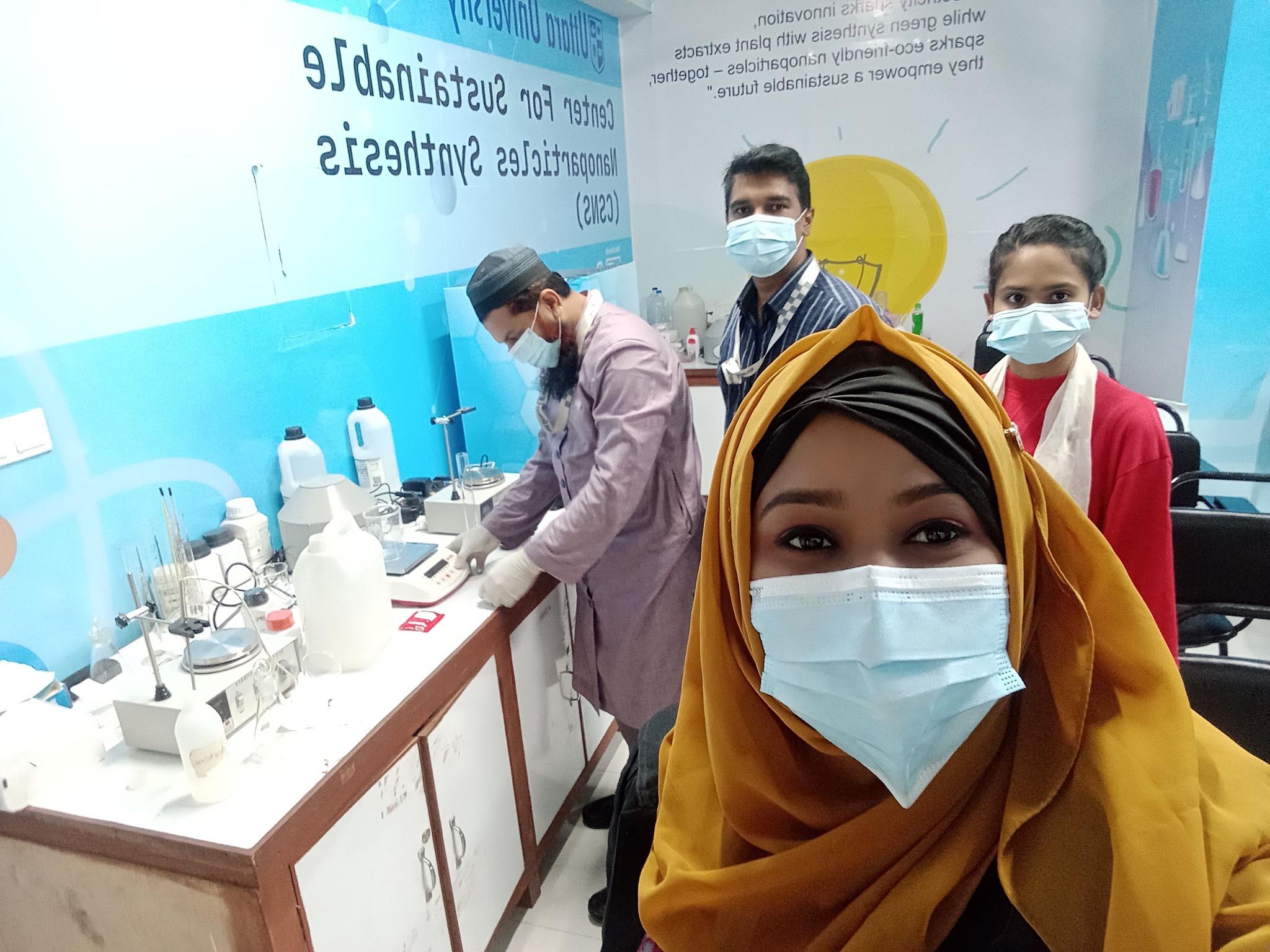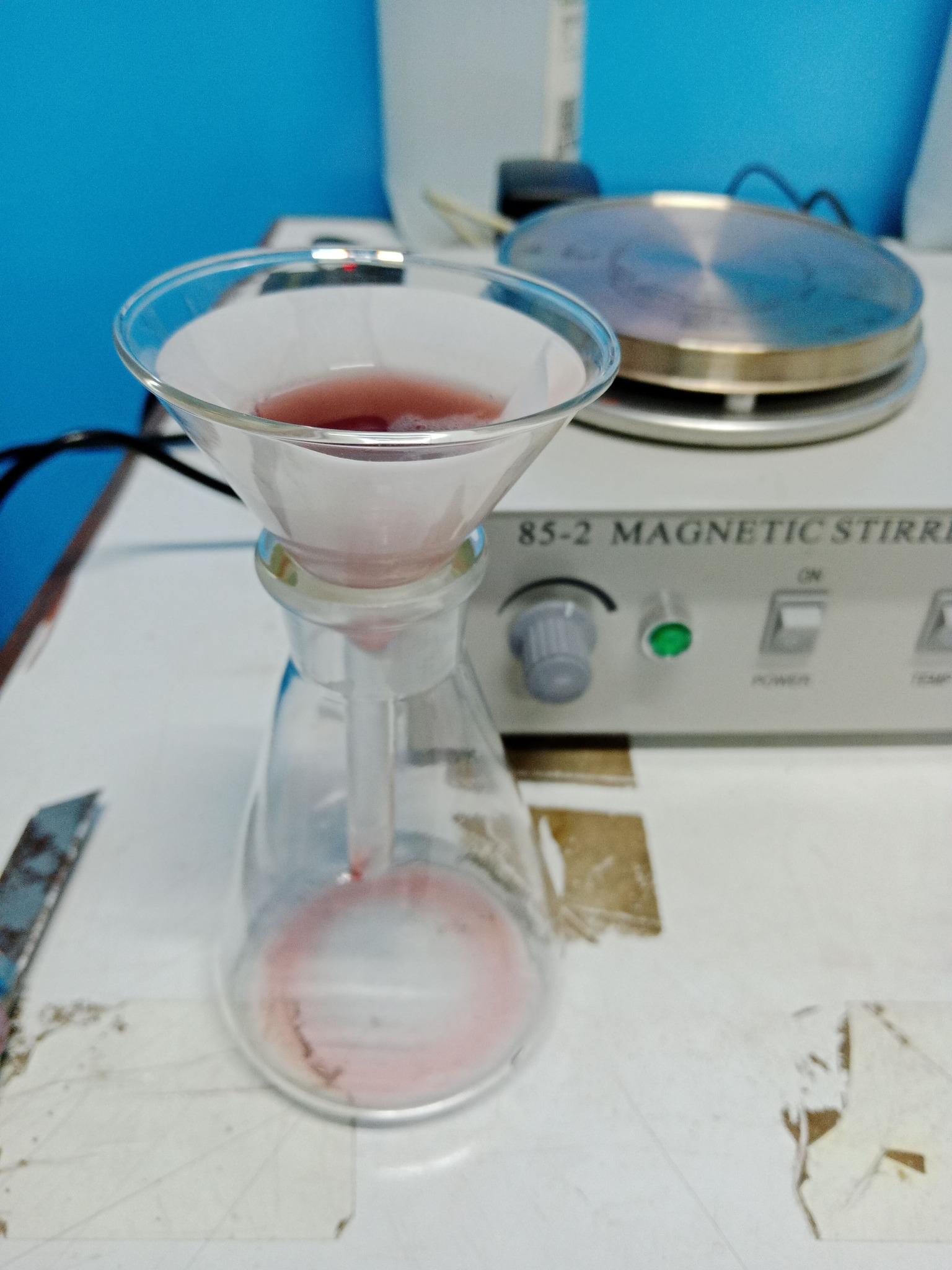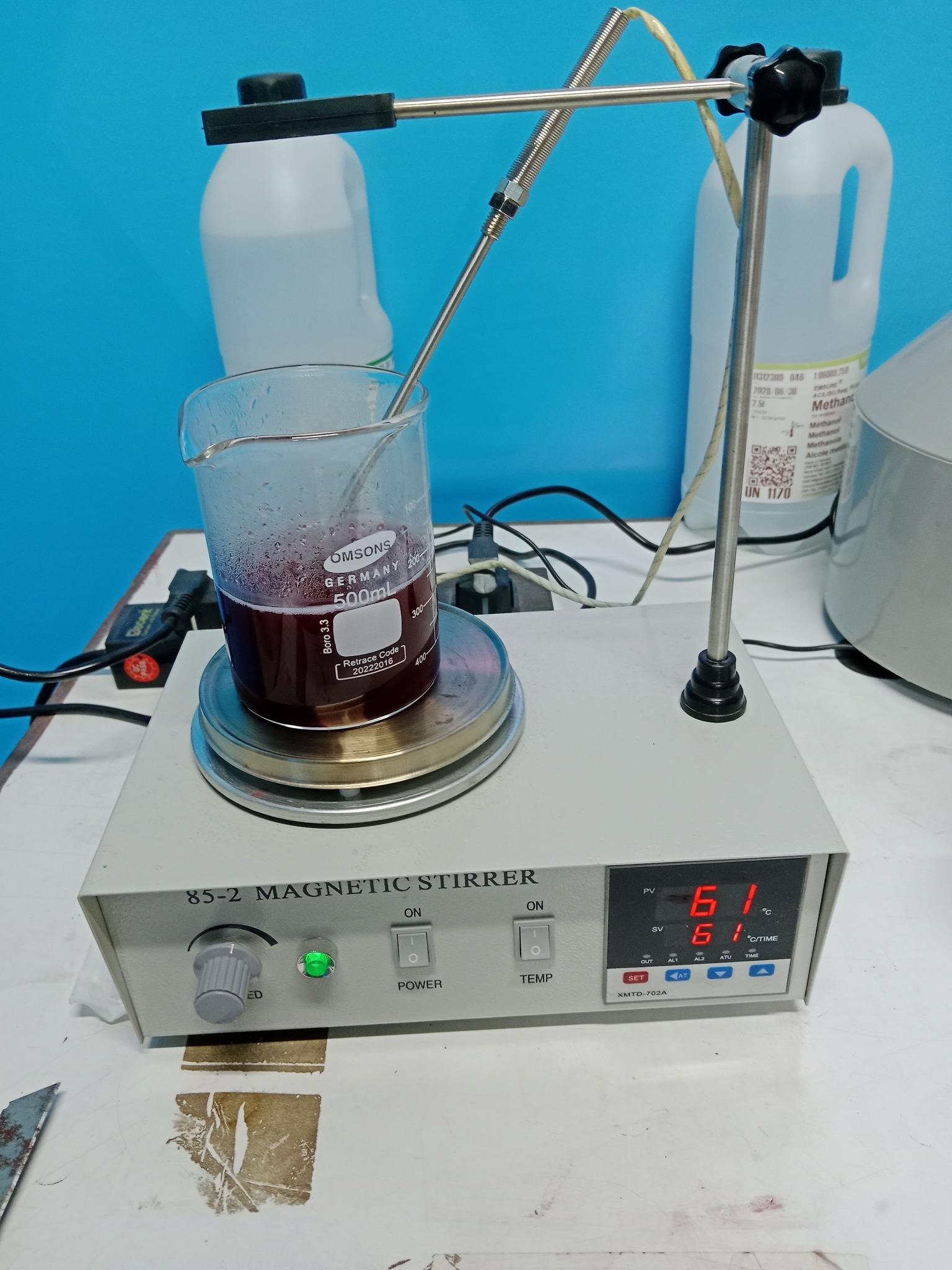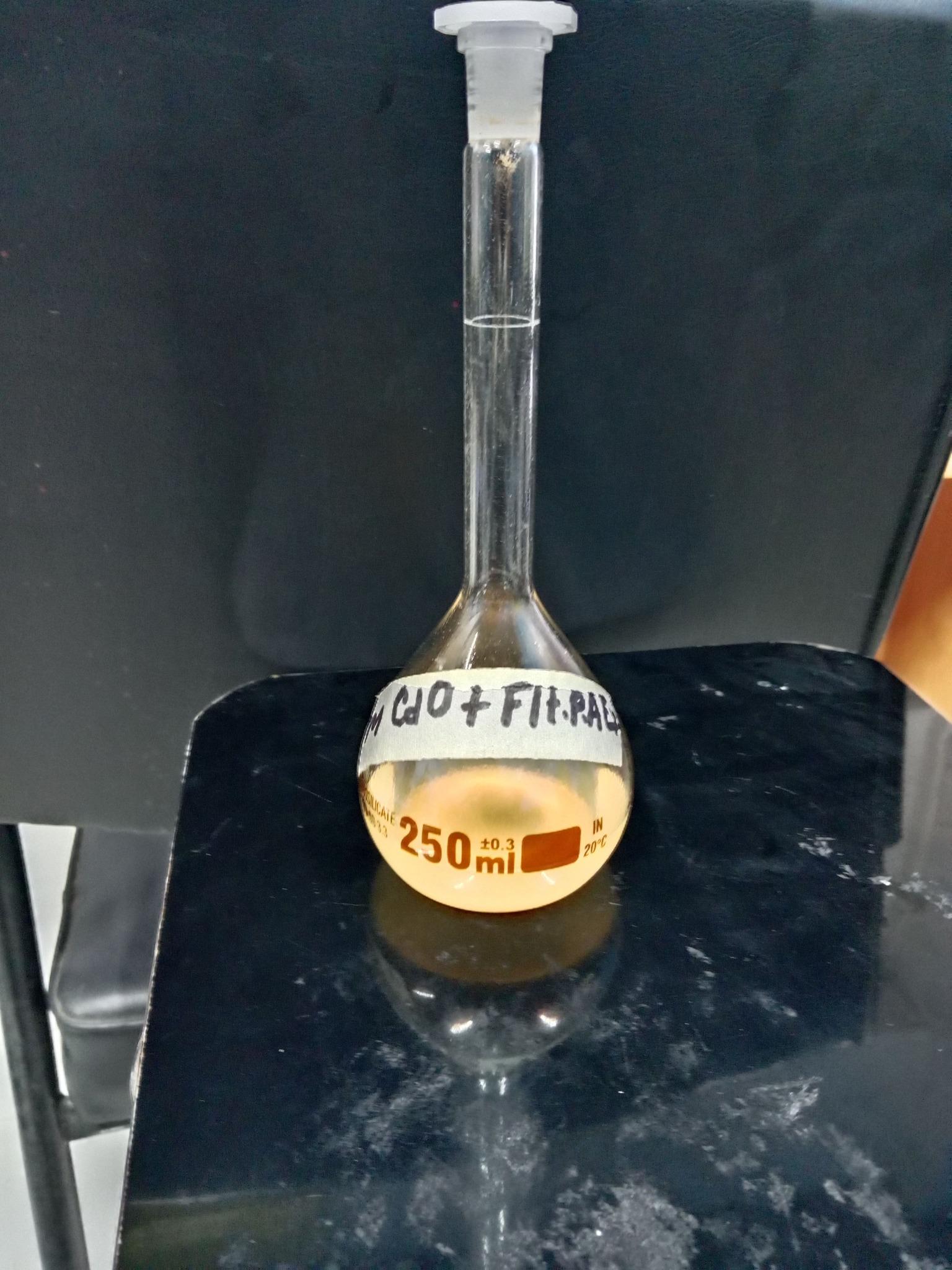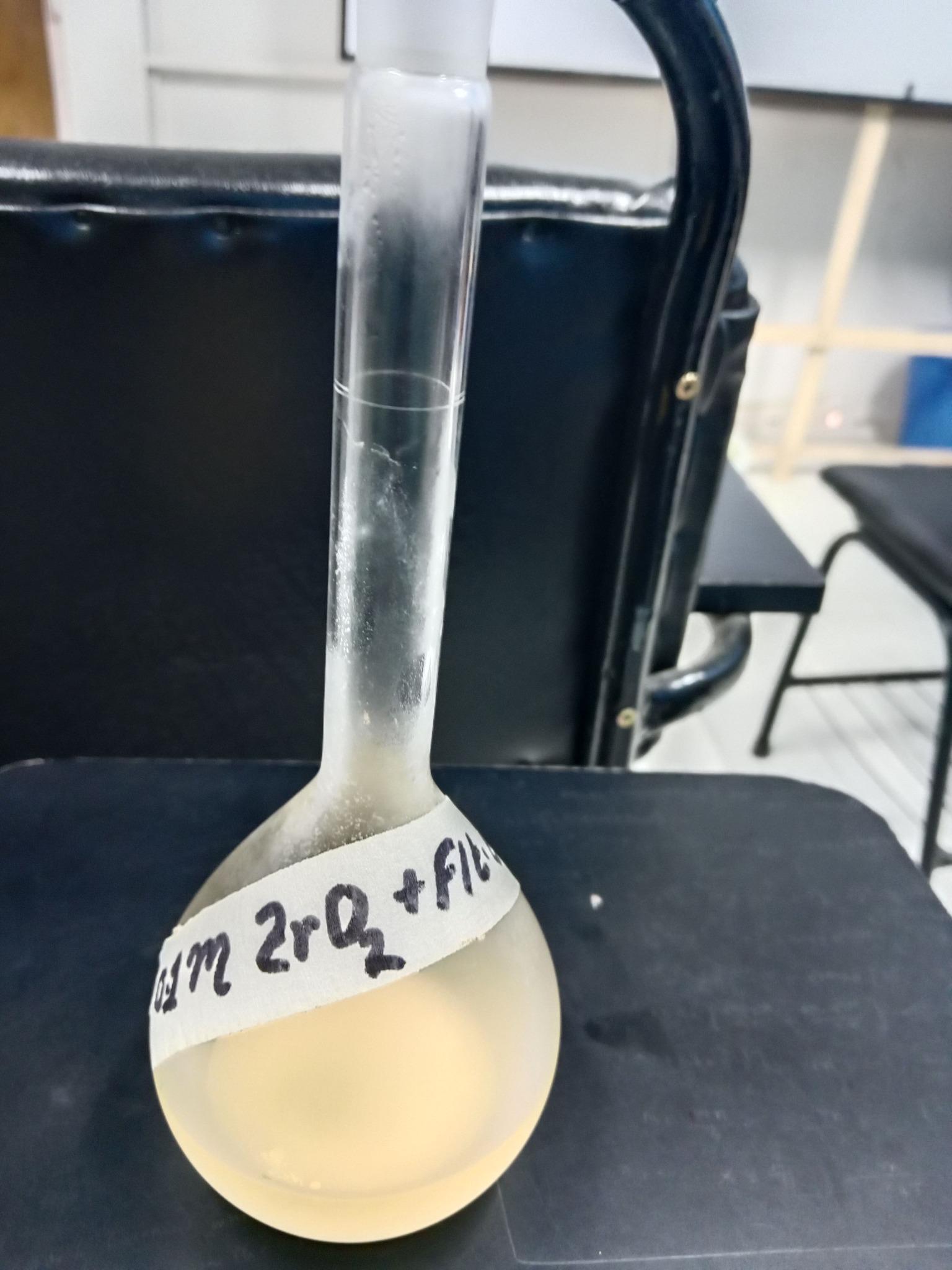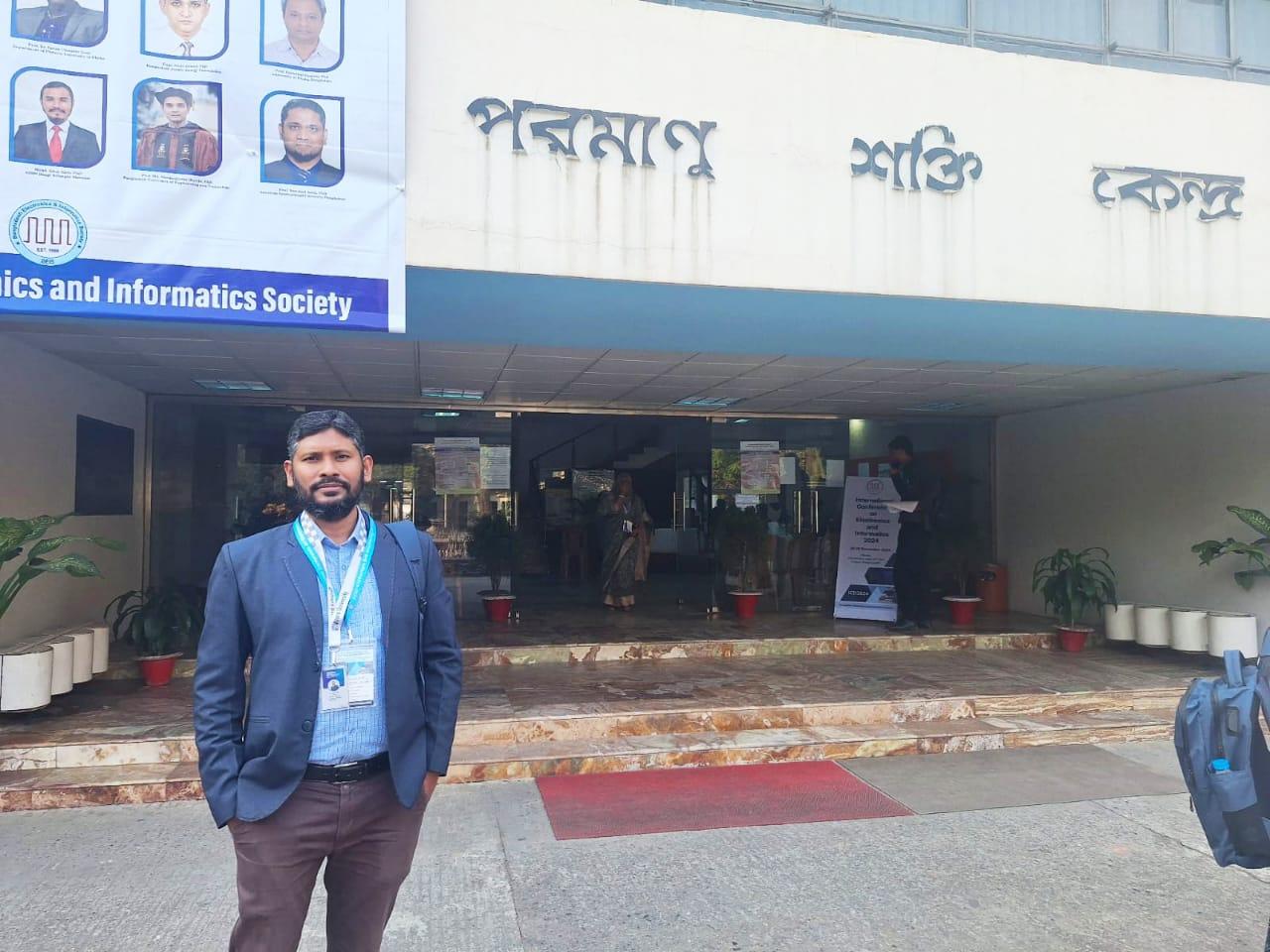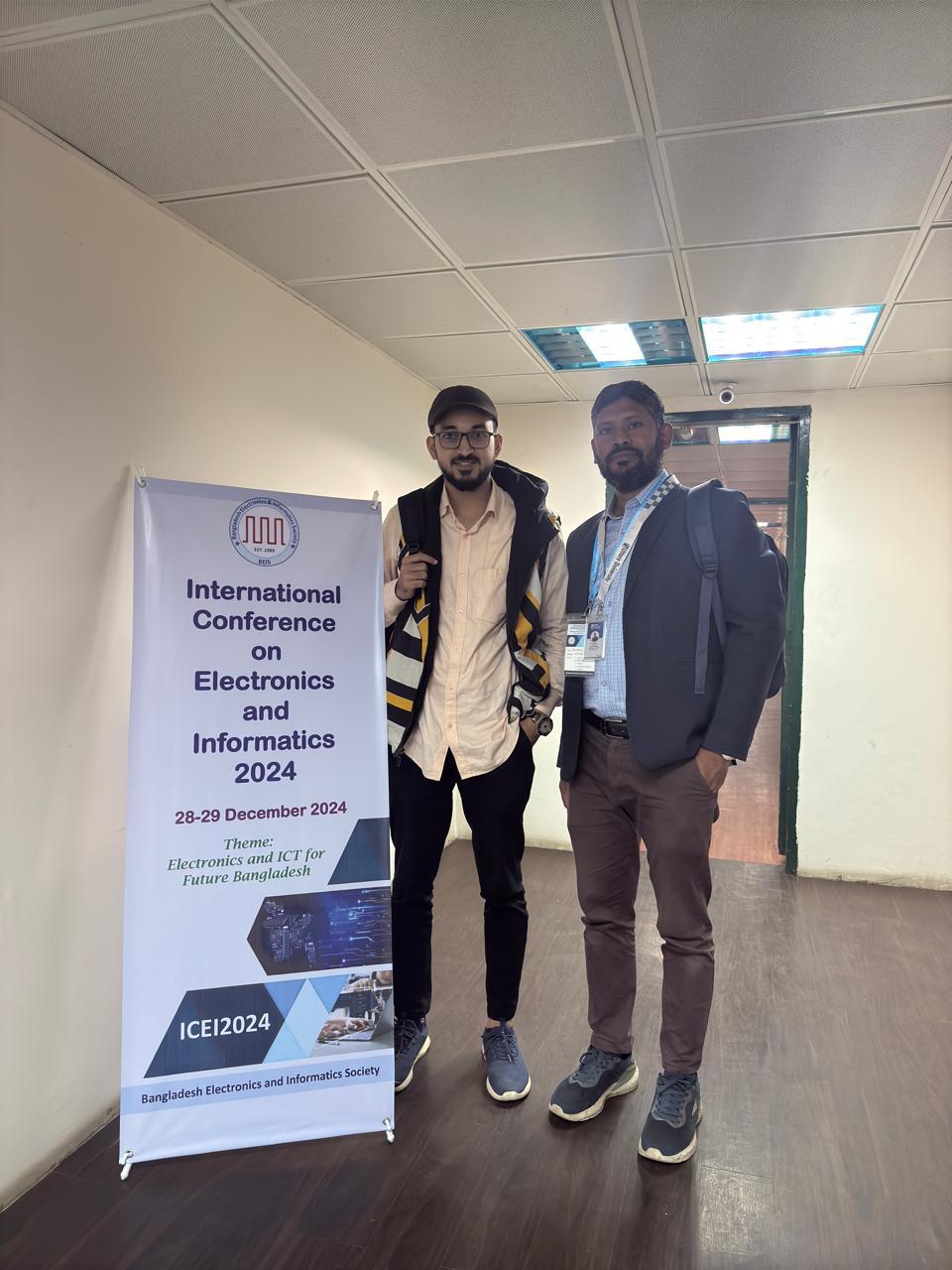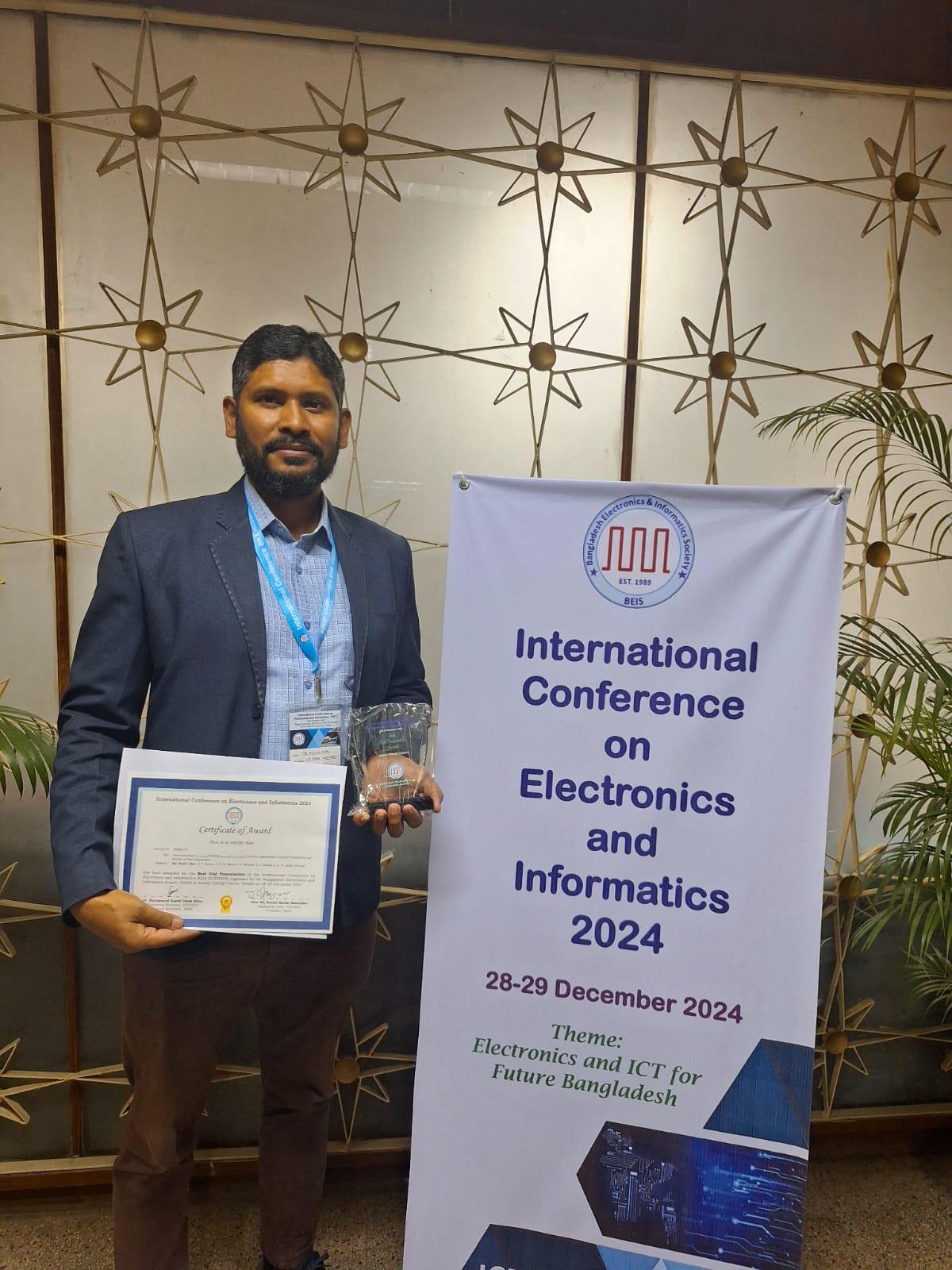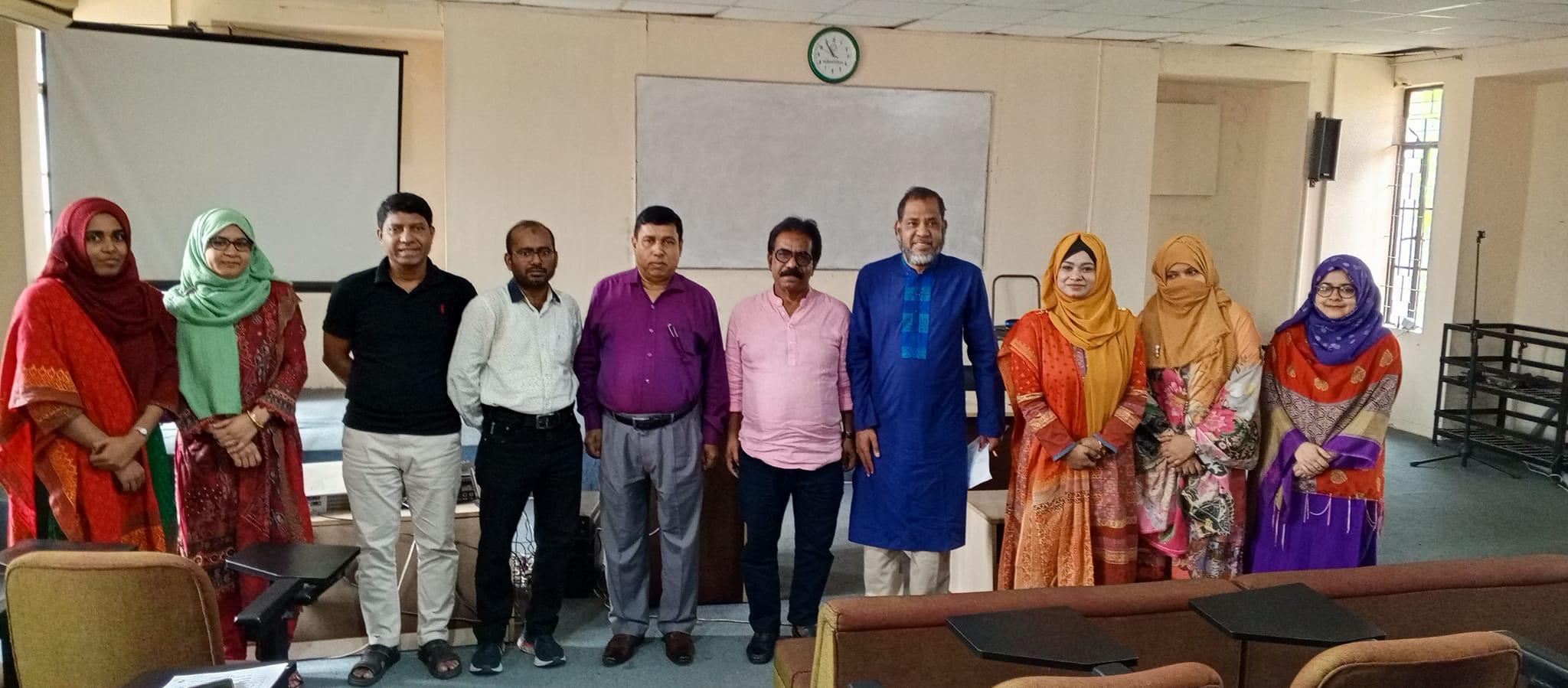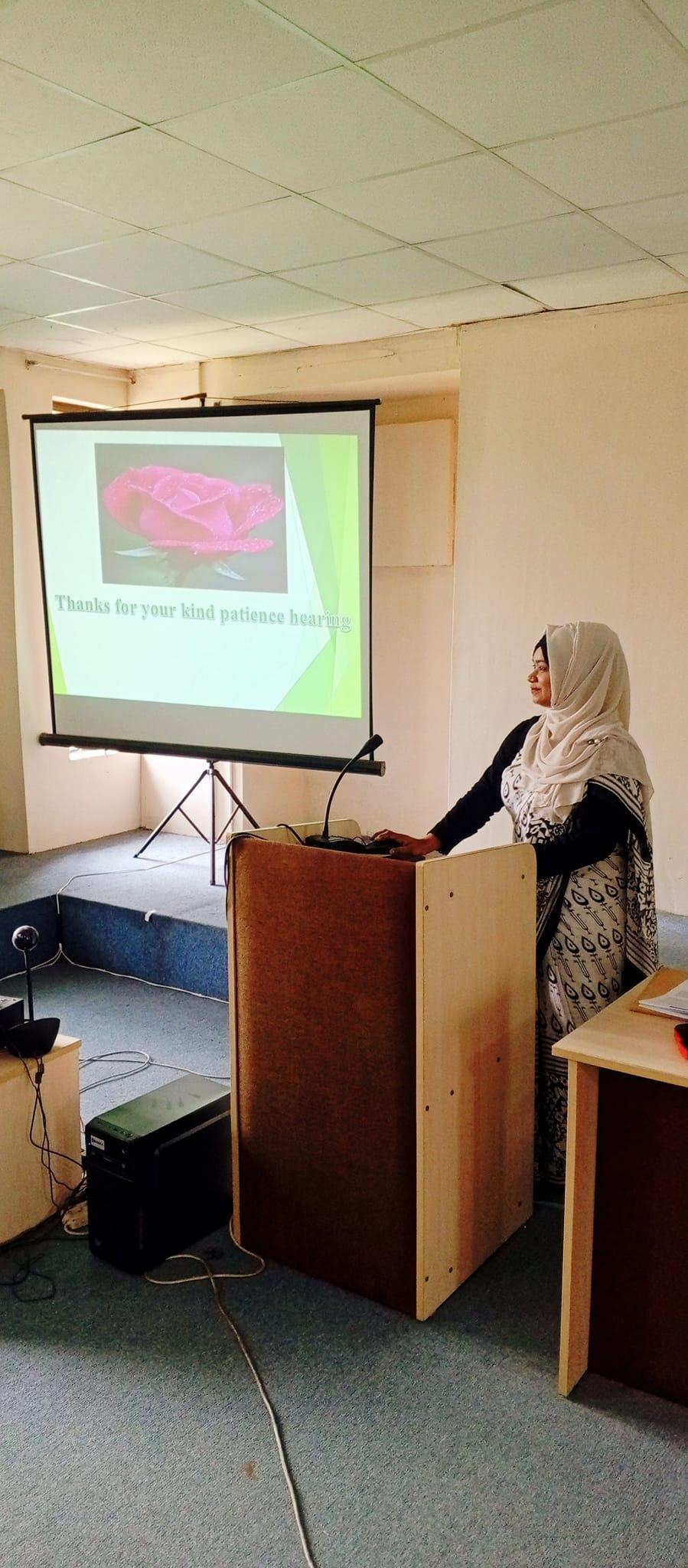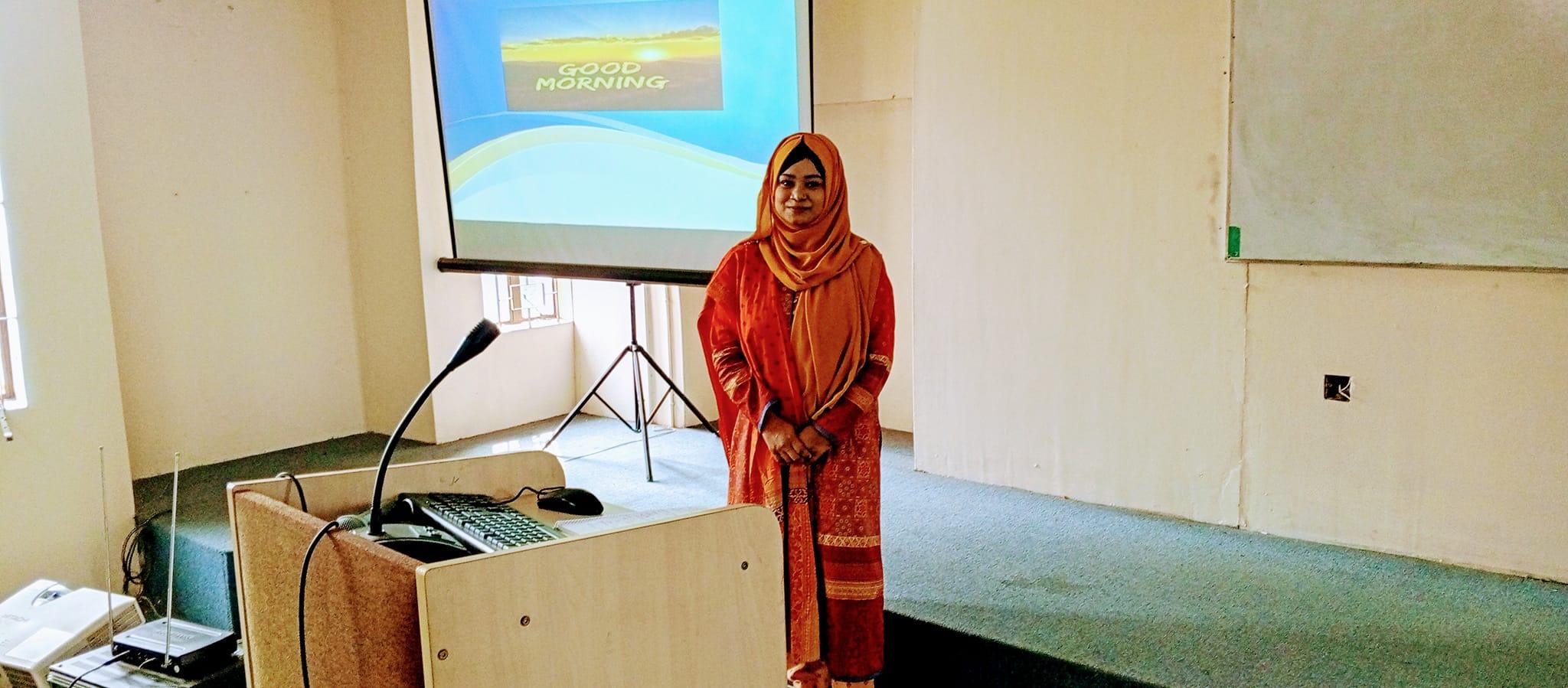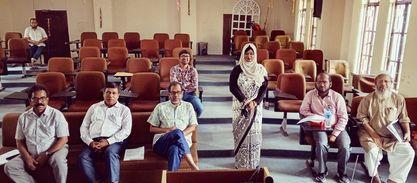Department of Physics
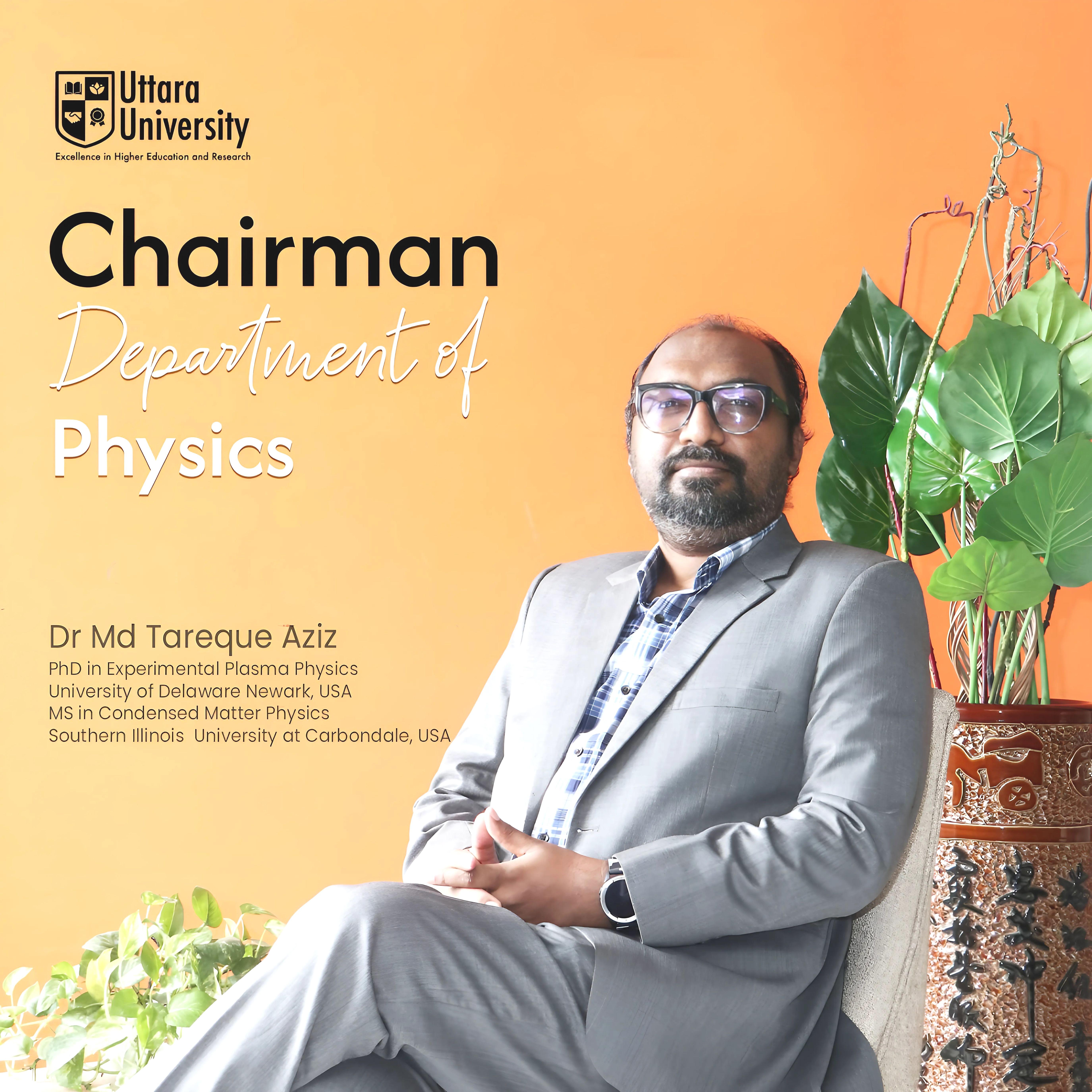
Chairman's Message
Dear Prospective Student,
On behalf of the Department of Physics at Uttara University, I extend a warm welcome. Our department is dedicated to nurturing future physicists by providing a rigorous academic environment coupled with a supportive community.
Why Choose Physics at Uttara University?
Physics, the fundamental language of the universe, offers a gateway to understanding the world around us and shaping its future. At Uttara University, we provide a unique platform for you to:
- Explore the Frontiers of Physics : We hold the unique distinction of being the only private university in Bangladesh offering dedicated one-year and two-year Master's programs in Physics. This tailored approach empowers you to explore and pursue advanced studies under the tutelage of our esteemed faculty. Furthermore, the Center for Sustainable Nanoparticle Synthesis (CSNS) offer opportunities to delve into exciting nanoparticle research with a focus on sustainability and environmental consciousness and contribute to groundbreaking discoveries.
- Develop Critical Thinking Skills : Our rigorous curriculum challenges you to think critically, analyze complex problems, and develop innovative solutions.
- Prepare for a Successful Career : Physics graduates are highly sought after in various fields, including ICT, renewable energy, manufacturing, healthcare, and research and development.
- Join a Supportive Community : Our department fosters a collaborative and supportive environment where you can connect with like-minded individuals and learn from experienced faculty.
Join Us Today
As Albert Einstein once said, "The most beautiful thing we can experience is the mysterious. It is the source of all true art and science." By choosing Uttara University's Department of Physics, you're embarking on a journey to unravel the mysteries of the universe and contribute to the advancement of human knowledge.
Be a catalyst for change, a pioneer of progress, and a visionary of the future.
Sincerely,
Dr Md Tareque Aziz
Associate Professor and Chairman
Department of Physics
Uttara University
Department Overview
The Department of Physics at Uttara University was established in 2004 in response to the need for expanding higher education at an affordable cost in the country. It is well understood that a nation can progress through the widespread application of science and technology, especially in basic sciences. Physics is essential in all modern aspects of civilization, including engineering and technology, biomedical and medical physics and engineering, environmental conservation, renewable and nonrenewable energy production, information and communication technology, space science and technology, and many other branches of science.
Uttara University recognized the demand from students seeking opportunities for higher studies in Physics and became the first private university to offer the M.Sc. (Final) in Physics program at its city campus. Nearly 700 students have obtained postgraduate degrees (M.Sc.) in Physics from this department and are playing an important role in nation-building both domestically and internationally. The government has encouraged the introduction of higher studies in basic sciences at private universities, and Uttara University has become a pioneer in this respect by introducing the graduate program in Physics (M.Sc. Final) and continues to be the only private university offering such a program.
The university is considering further expanding the Physics curriculum by introducing a 2-year M.Sc. and a 4-year Bachelor's program in Physics. The department boasts a strong faculty, with many members holding postgraduate degrees, including Ph.D.s, and a large number of research publications. Some faculty members are engaged in supervising M.Phil and Ph.D. students at public universities and have produced a significant number of Ph.D.s in Physics. It is anticipated that the Physics Department will soon introduce a graduate program leading to a Ph.D., should the government encourage such a pursuit.
Vision
The university aims to become a center of excellence in education, research, and innovation, inspiring transformational progress in the intellectual, moral, and professional development of its students.
Mission
The university is committed to :
MOU 1 : Foster and facilitate advancement knowledge advancement and make it accessible for all,
MOU 2 : Prepare competent graduates through imparting quality education, research and an innovative spirit, cultural mindset, and professional and entrepreneurial skills to meet the industry requirements,
MOU 3 : Imbue the university community with ethics and professionalism to render quality service to the local and global societies.
What Experties Do We Build Up?
Core Theoretical Expertise
Classical Mechanics: In-depth understanding of the principles governing macroscopic physical systems, including Newtonian mechanics, Lagrangian and Hamiltonian formulations, and applications in various physical systems.
Quantum Mechanics: Advanced study of the behaviour of matter and energy at atomic and subatomic scales. Topics include wave functions, the Schrödinger equation, quantum states, and applications in modern technologies.
Advanced Specializations
Condensed Matter Physics: Study of the physical properties of solid and liquid matter, including phenomena like superconductivity, magnetism, and crystallography.
Nuclear Physics: Understanding of atomic nuclei, nuclear reactions, and their applications in energy production and medicine.
Plasma Physics: Study of ionized gases, their behavior, and applications in fields such as astrophysics and controlled nuclear fusion.
Research Skills
Experimental Techniques: Proficiency in designing, conducting, and analyzing experiments, using advanced instrumentation and methodologies.
Data Analysis and Interpretation: Ability to analyze large datasets, apply statistical methods, and interpret results in the context of physical theories.
Interdisciplinary Expertise
Materials Science: Knowledge of the properties and applications of materials, with a focus on developing new materials with unique physical properties.
Engineering Applications: Understanding the interface between physics and engineering, particularly in developing new technologies and industrial applications.
Professional Development
Ethics in Research: Understanding ethical issues in scientific research, including data integrity, plagiarism, and the societal impact of scientific work.
Project Management: Skills in managing research projects, including time management, resource allocation, and team collaboration.
Career Preparation: Guidance on careers in academia, industry, and beyond, including preparing for Ph.D. programs, postdoctoral positions, or roles in technology and research sectors.
Practical Components
Laboratory Work: Extensive hands-on experience in experimental physics labs, learning to operate and troubleshoot sophisticated equipment.
Internships and Industry Projects: Opportunities to work on real-world problems in collaboration with industry or research institutions.
Thesis Research: Conducting original research leading to a master’s thesis, which involves proposing hypotheses, conducting experiments or simulations, and analyzing results.
Objectives
The educational objectives of the MSc in Physics program are to ensure that the graduates are fundamentally solid, practical, dependable, collaborative, and professional after three to five years of graduation. The successful graduates will be able to:
PEO 1 : provide the student with a broad understanding of the physical principles of the universe;
PEO 2 : help them develop critical thinking and quantitative reasoning skills, to empower them to think creatively and critically about scientific problems and experiments;
PEO 3 : engage in the pursuit of new knowledge;
PEO 4 : experience in self-directed learning and genuine researched enquiry;
PEO 5 : understand the objective of a physics laboratory experiment, properly carry out the experiments, and appropriately record and analyze the results;
PEO 6 : comprehending and respecting the values, principles, methods and limitations.
- To build research programs, in particular multi-disciplinary ones, in order to facilitate the development of research and innovation skills of the students as well as of the faculty members.
- To build relationships with industry and funding agencies in order to enhance employability and research potential.
- To enhance the academic reputation and ranking of the department.
Medium of Instruction
Uttara University offers all the courses of study primarily in English. Teachers provide instruction to students in the classroom in English. English is also widely used as a medium of communication among the faculties, students, and administrative officials.
Academic Programs
Graduate
- MSc in Physics (2 Years)
- MSc in Physics
Description of the Program
Master of Science in Physics (MSc in PHY)- 1 Year & 2 Year
The Master of Science in Physics (Final) is a 1-year program for students with a 4-year B.Sc. (Honors) degree in Physics. The credit requirement for this program is 40 credit hours, which includes 10 taught courses (30 credit hours), a project/thesis (4 credit hours), lab work (4 credit hours), and a viva (2 credit hours). The program duration is 1 year, spread over 2 semesters.
The Master of Science in Physics is a 2-year program for students with a B.Sc. (Pass) in Physics, Chemistry, and Mathematics, a 3-year B.Sc. (Honors) in Physics, or an M.Sc. (Preliminary) in any science or engineering subject. The credit requirement for this program is 77 credit hours, consisting of taught courses (63 credit hours), a project/thesis (4 credit hours), lab work (4 credit hours), and a viva (2 credit hours). The program is designed to be completed in 2 years (4 semesters).
Graduate Attributes
Graduate attributes are the unique qualities, skills, and understanding that enable students to develop their own experiences, approaches, and voice through proper learning and experiences gained from their degree (academic courses) and co-curricular activities. The postgraduates of the MSc in Physics (1-Year) program will have the following attributes:
- The ability to solve problems competently by identifying the essential parts of a problem and formulating a strategy to solve it;
- The ability to apply creative, imaginative, and innovative thinking to problem-solving;
- An understanding of the need for lifelong learning and the capacity to pursue it;
- Proficiency in using standard laboratory equipment, modern instrumentation, and classical techniques to conduct experiments;
- A practical and contemporary knowledge of relevant professional, ethical, and legal frameworks;
- The ability to manage personal performance to meet expectations and demonstrate drive, determination, and accountability;
- The ability to utilize a systems approach for design and operational performance.
Educational Objectives of the Program
The educational objectives of the MSc in Physics (1-Year) program are to ensure that the graduates are fundamentally solid, practical, dependable, collaborative, and professional after three to five years of graduation. The successful graduates will be able to:
PEO 1: provide the student with a broad understanding of the physical principles of the universe.
PEO 2: help them develop critical thinking and quantitative reasoning skills, to empower them to think creatively and critically about scientific problems and experiments.
PEO 3: engage in the pursuit of new knowledge.
PEO 4: experience in self-directed learning and genuine researched enquiry.
PEO 5: understand the objective of a physics laboratory experiment, properly carry out the experiments, and appropriately record and analyze the results.
PEO 6: comprehending and respecting the values, principles, methods, and limitations.
Program Learning Outcomes
To prepare the students for a successful professional and personal life, MSc in Physics (1-Year) program is designed to produce graduates to attain the following learning outcomes at the time of graduation he or she will achieve the ability to:
PLO 1: make simple numerical estimates of the physical properties of the universe and its constituents.
PLO 2: acquire deep knowledge in fundamental aspects of all branches of Physics.
PLO 3: solve physics problems using qualitative and quantitative reasoning, including sophisticated mathematical techniques.
PLO 4: develop abilities and skills that encourage research and development activities and are useful in everyday life
PLO5: analyze physical problems, be able to derive and prove equations that describe the physics of the universe, understand the meaning and limitations of these equations, and have both physical and numerical insight into physical problems.
PLO6: inculcate scientific bent of mind and attitude relevant to science, such as concern for efficiency, accuracy and precision, objectivity, integrity, enquiry, effective communication, ethical responsibilities, Initiative and Inventiveness.
Mapping Mission of the Program Offering Entity (MPOEs) with the Mission of University (MOUs): 1 Year
| Missions of the Program Offering Entity (MPOEs) | MOU1 | MOU2 | MOU3 |
|---|---|---|---|
| MPOE1 | √ | √ | |
| MPOE2 | √ | √ | |
| MPOE3 | √ | √ | |
| MPOE4 | √ | √ | |
| MPOE5 | √ | √ |
Mapping PEOs with the Mission of Program Offering Entity (MPOEs)
| PEOs | MPOE1 | MPOE2 | MPOE3 | MPOE4 | MPOE5 |
|---|---|---|---|---|---|
| PEO1 | √ | √ | |||
| PEO2 | √ | ||||
| PEO3 | √ | √ | |||
| PEO4 | √ | √ | |||
| PEO5 | √ | √ | |||
| PEO6 | √ | √ |
Mapping PLOs with PEOs
| PLOs | PEO1 | PEO2 | PEO3 | PEO4 | PEO5 | PEO6 |
|---|---|---|---|---|---|---|
| PLO1 | √ | √ | ||||
| PLO2 | √ | √ | ||||
| PLO3 | √ | √ | √ | |||
| PLO4 | √ | |||||
| PLO5 | √ | √ | √ | |||
| PLO6 | √ |
Mapping Courses with PLOs
| Title | Details |
|---|---|
| Mapping courses with the PLOs | View |
Mapping Mission of the Program Offering Entity (MPOEs) with the Mission of University (MOUs): 2 Year
| Missions of the Program Offering Entity (MPOEs) | MOU1 | MOU2 | MOU3 |
|---|---|---|---|
| MPOE1 | √ | √ | |
| MPOE2 | √ | √ | |
| MPOE3 | √ | √ | |
| MPOE4 | √ | ||
| MPOE5 | √ | √ |
Mapping PEOs with the Mission of Program Offering Entity (MPOEs)
| PEOs | MPOE1 | MPOE2 | MPOE3 | MPOE4 | MPOE5 |
|---|---|---|---|---|---|
| PEO1 | √ | √ | |||
| PEO2 | √ | √ | |||
| PEO3 | √ | √ | |||
| PEO4 | √ | √ | |||
| PEO5 | √ | √ | |||
| PEO6 | √ | √ |
Mapping PLOs with PEOs
| PLOs | PEO1 | PEO2 | PEO3 | PEO4 | PEO5 | PEO6 |
|---|---|---|---|---|---|---|
| PLO1 | √ | √ | ||||
| PLO2 | √ | √ | ||||
| PLO3 | √ | √ | √ | |||
| PLO4 | √ | |||||
| PLO5 | √ | √ | √ | |||
| PLO6 | √ |
Mapping Courses with PLOs
| Title | Details |
|---|---|
| Mapping courses with the PLOs | View |
Guideline For Student
Marks Distribution
| Particulars | Marks |
|---|---|
| Class Attendance + Class Performance | 5% |
| Class Test + Assignment | 10% |
| Mid Term Examination | 25% |
| Semester Final Examination | 50% |
| Viva Voce | 10% |
| Total | 100% |
Mission and Vision
At the Center for Sustainable Nanoparticles Synthesis (CSNS) for Master of Science in Physics at Uttara University, our mission is to foster a dynamic and forward-thinking environment that advances knowledge and expertise in the field of physics, with a focus on innovation, research, and technology. Our mission is built upon the following core principles:
- Be empowered students with a strong foundation in physics while equipping them with the knowledge and skills needed to engage in environmentally friendly nanoparticle synthesis and characterization.
- Promote research and innovation in green nanoparticle synthesis methods that have reduced environmental impact and promote sustainability.
- Foster an interdisciplinary approach, encouraging collaboration between physicists, chemists, and engineers to develop eco-friendly nanoparticle technologies.
- Be provided students with advanced laboratory training, enabling them to accurately characterize and analyze the properties of nanoparticles.
- Be encouraged the exploration of alternative and sustainable energy sources, with a focus on harnessing the power of nanoparticles for clean energy production.
- Equipe with the ability to design and conduct experiments related to green nanoparticle synthesis, as well as power production, and to interpret and communicate their findings effectively.
- Be instilled in an understanding of the environmental and societal implications of nanoparticle technologies and power production, and promote ethical decision-making in these fields.
- Be engaged in community outreach and education to raise awareness about the importance of sustainable and green practices in science and technology.
- Foster a culture of critical thinking, problem-solving, and innovation, enabling graduates to contribute to global efforts to address environmental challenges and energy needs.
- Be prepared graduates for careers in research, academia, industry, and policymaking, where they can drive advancements in green nanoparticle synthesis, characterization, and sustainable power production
Objectives
The objective of the Center for Sustainable Nanoparticles Synthesis (CSNS) is to equip students with the knowledge and skills to conduct research in the field of green synthesis and characterization of nanoparticles, with a focus on their applications in sustainable power production. This program aims to foster a deep understanding of the principles and techniques involved in the synthesis and characterization of nanoparticles using environmentally friendly methods and to explore their potential for enhancing power generation technologies. Graduates of this program will be well-prepared to contribute to the development of eco-friendly energy solutions and advance the field of nanotechnology in energy production.
- CIT-OB1: Investigate and develop eco-friendly methods for the green synthesis of nanoparticles using plant extracts and sustainable materials.
- CIT-OB2: Study the fundamental principles of nanotechnology and their application in the field of materials science and physics.
- CIT-OB3: Understand the environmental impact and sustainability of green synthesis processes for nanoparticles.
- CIT-OB4: Investigate the potential applications of nanoparticles in fields like medicine, energy, and environmental remediation.
- CIT-OB5: Assess the economic feasibility and scalability of green synthesis methods for large- scale nanoparticle production.
Published Scopused-indexed Journal articles
Synthesis, evaluation, and monitoring of red amaranth extract for power production
N. Y. Tanisa, Kamrul Alam, Khan and M. Salahuddin. "Synthesis, evaluation, and monitoring of red amaranth extract for power production." , Advances in Natural Sciences: Nanoscience and Nanotechnology , Volume 15, Number 1, (2024). DOI: DOI Number
Preparation of nanostructured cuprous oxide (Cu2O) absorber layer for photovoltaic application
Rabiul Awal, Nilufer Yesmin Tanisa, Arifur Rahman and Shamim Ahmed. "Preparation of nanostructured cuprous oxide (Cu2O) absorber layer for photovoltaic application." Micro & Nano Letters , Volume 19, Issue 1, (2024). DOI: DOI Number
Preparation of nanostructured cuprous oxide (Cu2O) absorber layer for photovoltaic application
Rabiul Awal, Nilufer Yesmin Tanisa, Arifur Rahman and Shamim Ahmed, "Preparation of nanostructured cuprous oxide (Cu2O) absorber layer for photovoltaic application" , Micro & Nano Letters , (2024), Publisher Wiley. DOI: DOI Number
Efficient Bioelectrochemical Cell Generation and Green Synthesis of Silver Nanoparticles Using Pomegranate and Pineapple Peel Extracts: A Comprehensive Characterization Study
Shamima Mehrin, Nilufer Yesmin Tanisa, Rabiul Awal, Md. Kamrul Alam Khan, Abdus Shaqur, Shamim Ahmed, Shahidul Islam, and Asad Mia, "Efficient Bioelectrochemical Cell Generation and Green Synthesis of Silver Nanoparticles Using Pomegranate and Pineapple Peel Extracts: A Comprehensive Characterization Study", Advances in Materials Science and Engineering, (2024). DOI: DOI Number
Complex Shock Structure in Multi-Species Dusty Plasma with Nonextensive Electrons and Two-Temperature Nonthermal Ions
N. Y. Tanisa, M. Ferdousi, and D. M. Saaduzzaman, "Complex Shock Structure in Multi-Species Dusty Plasma with Nonextensive Electrons and Two-Temperature Nonthermal Ions" , AIP Advances 14, 075003 , (2024). DOI: DOI Number
Synthesis, evaluation, and monitoring of red amaranth extract for power production
N. Y. Tanisa, Kamrul Alam Khan and M. Salahuddin. "Synthesis, evaluation, and monitoring of red amaranth extract for power production." , Journal Advances in Natural Sciences: Nanoscience and Nanotechnology , (2024), Volume 15, Issue 1, Pages 015001, Publisher IOP Publishing. IOP: IOP Number
Upcycling prawn shells: Chitosan–carbon nanotube nanocomposites with boosted magnetic and electrical properties
Md. Al-Mamun, Nasrin Jewena, Jahirul Islam Khandaker, Nilufer Yesmin Tanisa, Shamim Ahmed, Fahim Shahriar, Md. Mahbubul Haque, "Upcycling prawn shells: Chitosan–carbon nanotube nanocomposites with boosted magnetic and electrical properties" , Micro & Nano Letters, 2024. DOI: DOI Number
Deposition of nanoparticles through a cylindrical tube of human respiratory system
Mst. Sathi Akter, Mahtab U. Ahmmed, Nilufer Yesmin Tanisa, and Shakib Hossain, "Deposition of nanoparticles through a cylindrical tube of human respiratory system", AIP Advances 14, 125320, 2024. DOI: DOI Number
Ti2PTe2 chalcogenide: A comprehensive DFT study on physical properties
Mia, M. H., Khatun, M. A., & Rahman, M. (2025), "Ti2PTe2 chalcogenide: A comprehensive DFT study on physical properties" , Next Materials, 7, 100434, 2024. DOI: DOI Number
Green Production and Analysis of Silver Nanoparticles Utilizing Pathor Kuchi Leaf
N. Y. Tanisa, Kamrul Alam Khan and M. Salahuddin. "Green production and analysis of silver nanoparticles utilizing Pathor Kuchi Leaf." AIP Advances, 13, 095010, (2023). DOI: DOI Number
Synthesis, Evaluation, and Monitoring of Red Amaranth Extract for Power Production
N. Y. Tanisa, Kamrul Alam Khan and M. Salahuddin. "Synthesis, evaluation, and monitoring of red amaranth extract for power production." Advances in Natural Sciences: Nanoscience and Nanotechnology, Accepted (23rd October 2023).
Cylindrical and Spherical Modified Gardner Solitons in Five Component Dusty Plasmas
N. Y. Tanisha, M. Ferdousi, and K. Hossain. "Cylindrical and spherical modified Gardner solitons in five component dusty plasmas." AIP Advances, 13, 025356, (2023). DOI: DOI Number
Producing and Assessing Zinc Sulfate Nanoparticles using Nigella Sativa Assistance
S. M. Shahid Hasan, N. Y. Tanisa, Shamim Ahmed, Md. Arifur Rahman, and Rabiul Awala. "Producing and assessing Zinc Sulfate Nanoparticles using Nigella Sativa Assistance." AIP Advances, (Accepted 2023).
Functionalized Multiwalled Carbon Nanotube Reinforced Waste Prawn Shell Derived Chitosan Nanocomposites with Improved Magnetic and Electric Properties
Rabiul Awal, Md. Al-Mamun, Nasrin Jewena, Jahirul Islam Khandaker, N. Y. Tanisa, Shamim Ahmed, Fahim Shahriar and Md. Mahbubul Haque. "Functionalized Multiwalled Carbon Nanotube Reinforced Waste Prawn Shell Derived Chitosan Nanocomposites with Improved Magnetic and Electric Properties." Science and Technology Indonesia, (Accepted 2023).
Published Scopused-indexed Conference Proceedings
Studies on Synthesis, Characterization, and Monitoring of Ag NPs for Power Production Using Tomato
Farhana Islam, K A Khan, Md Sayed Hossain, Salman Rahman Rasel, and Shirin Akter. "Studies on Synthesis, Characterization, and Monitoring of Ag NPs for Power Production Using Tomato." Microelectronics, Circuits and Systems: Select Proceedings of Micro2021, 73-86, (2023). DOI: DOI Number
A Study on Zn/Cu-Based Pandan Leaf (Pandanus Amaryllifolius) Electrochemical Cell
Salman Rahman Rasel, K. A. Khan, Md. Sayed Hossain, Shahinul Islam, M. Hazrat Ali & Rajada Khatun. "A Study on Zn/Cu-Based Pandan Leaf (Pandanus Amaryllifolius) Electrochemical Cell." Part of the Lecture Notes in Electrical Engineering book series (LNEE, volume 976). DOI: DOI Number
Red Spinach - A New and Innovative Power Source
KA Khan, Farhana Islam, Md Sayed Hossain, Salman Rahman Rasel, Md Ohiduzzaman. "Red Spinach-A New and Innovative Power Source." Microelectronics, Circuits and Systems: Select Proceedings of Micro2021, 113-124. DOI: DOI Number
Electrical Activities of Ginger Extract-Mediated Silver Nanoparticles in Bio-electrochemical Cell
KA Khan, Bithi Paul, Mohammad Abul Kashem Siddique, Monika Paul, SM Zian Reza. "Electrical Activities of Ginger Extract-Mediated Silver Nanoparticles in Bio-electrochemical Cell." International Conference on Micro/Nanoelectronics Devices, Circuits and Systems, 483-491. DOI: DOI Number
Synthesis, Characterizations of Silver Nanoparticles (AgNPs) and Monitoring for Power Production Using Drumstick Leaves
K. A. Khan, Mohammad Tofazzal Haider, Md. Sayed Hossain & Salman Rahman Rasel. "Synthesis, Characterizations of Silver Nanoparticles (AgNPs) and Monitoring for Power Production Using Drumstick Leaves." Microelectronics, Circuits and Systems, Lecture Notes in Electrical Engineering 976. DOI: DOI Number
Published Scopused-indexed Conference Papers
PKL Backup LED Bulb—An Alternative Source of Electricity During Load Shedding
Kamrul Alam Khan, Shahinul Islam, Salman Rahman Rasel, M. A. Saime, Syful Islam, M. Hazrat Ali (Year). "PKL Backup LED Bulb—An Alternative Source of Electricity During Load Shedding." Advanced Energy and Control Systems | Lecture Notes in Electrical Engineering, 820, 89-99. DOI: DOI Number
3R Economy of a PKL Electrochemical Cell
Kamrul Alam Khan, Shahinul Islam, Md. Delowar Hossain Munna, S. M. Zian Reza, M. Hazrat Ali, Farhana Yesmin (Year). "3R Economy of a PKL Electrochemical Cell." Advanced Energy and Control Systems | Lecture Notes in Electrical Engineering, 820, 137-145. DOI: DOI Number
A Study on Development of PKL Power
K. A. Khan, Md. Afzol Hossain, Salman Rahman Rasel, M. Ohiduzzaman, Farhana Yesmin, Lovelu Hassan, M. Abu Salek & S. M. Zian Reza. "A Study on Development of PKL Power." Computational Intelligence and Machine Learning: Proceedings of the 7th International Conference on Advanced Computing, Networking, and Informatics (ICACNI 2019), 151-171. DOI: DOI Number
A Study on Light Traps for Attracting and Killing the Insects Using PKL Electricity
K. A. Khan, Rajia Sultana, Shahinul Islam & S. M. Zian Reza. "A Study on Light Traps for Attracting and Killing the Insects Using PKL Electricity." Advances in Medical Physics and Healthcare Engineering: Proceedings of AMPHE 2020, 135-143. DOI: DOI Number
Green Synthesis of Magnetite (Fe3O4) Nanoparticles Using Azadirachta indica Leaf Extract and Their Characterization
Ruhana Pervin, KA Khan, NI Khan, AKM Atique Ullah, and SM Zian Reza. "Green Synthesis of Magnetite (Fe3O4) Nanoparticles Using Azadirachta indica Leaf Extract and Their Characterization." Advances in Medical Physics and Healthcare Engineering: Proceedings of AMPHE 2020, 81-91. DOI: DOI Number
Leaf Extract and Their Characterization
Ruhana Pervin, KA Khan, NI Khan, AKM Atique Ullah, and SM Zian Reza. "Leaf Extract and Their Characterization." Advances in Medical Physics and Healthcare Engineering: Proceedings of AMPHE 2020, 81. DOI: DOI Number
Published International Journal articles
HAP/f-MWCNTs/Cobalt Ferrites Nano Composites Synthesis and Electrical and Magnetic Performance Investigation
Mohammad Mostafa Raja, Rabiul Awal, Jahirul Islam Khandaker, Mohammad Al-Mamun, Mohammad Mahbubul Haque, Nilufer Yesmin Tanisa, Mohammad Sheikh Farid, Sayed Muhammad Shahid Hasan, Shamima Meherin. "HAP/f-MWCNTs/Cobalt Ferrites Nano Composites Synthesis and Electrical and Magnetic Performance Investigation." Open Access Library Journal 2023, Volume 10, e9875. ISSN Online: 2333-9721 ISSN Print: 2333-9705. DOI: DOI Number
Multiple Forms of Renewable Energy
N. Y. Tanisa, Md. Rabiul Awal, Shamima Meherin, S. M. Shahid Hasan, S. K. Farid, Md. Fahad Bin Islam Saif, Md. Shajib Mian, and Md. Asaduzaman Talukder. "Multiple forms of renewable energy." International Journal of Scientific & Engineering Research, Volume 8, Issue 1, January-2023, ISSN 2229-5518.
A Study on ZnO Nanoparticles
Kamrul Alam Khan, Md. Alamgir Kabir, Mustafa Mamun, Mst. Sakera Khatun, Muhammad Saiful Islam Akhand. "A Study on ZnO Nanoparticles." International Journal of Advance Research and Innovative Ideas in Education (IJARIIE), 8, 141-158, IJARIIE-ISSN (O)-2395-4396
Design and Fabrication of a LED Lamp Using Potato Extract for Practical Utilization
Md Shahidul Khan, K. A., Numan, Hafijur Rahman, Islam, Md.Khairul, Uddin, Mohammed Asraf, Ali, Md. Haidar, Islam. "Design and fabrication of a LED lamp using potato extract for practical utilization." International Journal of Advance Research and Innovative Ideas in Education, Volume 8, 5, 447-454, IJARIIE
Green Electricity Generation from Green Jute Leaves
Nadia Akter Mokta and Md. Masum Reza K.A.Khan, Shahinul Islam, Md. Akramuzzaman. "Green electricity generation from green jute leaves, International Journal of Advance Research and Innovative Ideas in Education", 8, 4, 536-556
Green Synthesis of Zinc Oxide Nanoparticles Using Catharanthus Roseus Leaf Extract and their Characterization
Kamrul Alam Khan, M Shaiful Islam Islam, MN Islam Khan Khan, AKM Atique Ullah, Shahinul Islam, SR Rasel. "Green Synthesis of Zinc Oxide Nanoparticles Using Catharanthus Roseus Leaf Extract and their Characterization." Acta Scientific Agriculture, 6, 4, 24-33, Acta Scientific AGRICULTURE (ISSN: 2581-365X)
Admission Requirements (Graduate)
Structure of the Curriculum
a) Duration of the Program: 1 Year & 2 Year
b) Admission Requirements: Students having BSc (Hon) 4-Year or MSc (Preliminary) in Physics, Applied Physics, Computer Science and Engineering, Electrical and Electronics Engineering, Textile engineering, Civil Engineering, and related science and engineering subjects are eligible for admission.
c) Total Minimum Credit Requirement to Complete the Program: 40 Credit Hours
d) Total Class weeks in a Semester: 14 Weeks in a semester and 28 weeks in a year for classes excluding exams and other academic co-curricular activities.
e) Minimum CGPA requirement for Post-Graduation: CGPA 2.0
f) Maximum Academic Year of Completion: 3-Year
g) Category of Courses:
- General Education Course = 2 (6 Credits)
- Elective Courses = 8 (24 Credits)
- Physics Lab = 1 (4 Credits)
- Project/Thesis = 1(4 Credits)
- Viva =1 (2 Credits)
Semester-wise Distribution of the Course
List of courses for MSc in Physics Program (1 Year)
Alternative Courses without GED can be offered from the following list with the approval of the Chairman of the Department.
| Course Code | Course Title | Credit Hrs. |
|---|---|---|
| PHY0533611 | Quantum Mechanics- II | 3 |
| PHY0533612 | Electronics-II | 3 |
| PHY0533613 | Nuclear Physics-II | 3 |
| PHY0533614 | Solid State Physics-II | 3 |
| CSE0611615 | Computer and Programming Language | 3 |
| RMD0542616 | Research Methodology | 3 |
| PHY0533621 | Quantum Mechanics- III | 3 |
| PHY0533622 | Nuclear Physics-III | 3 |
| PHY0533623 | Solid State Physics-III | 3 |
| PHY0533624 | Renewable Energy-II | 3 |
| PHY0533625 | Physics Lab-II | 4 |
| PHY0533626/ PHY0533627 | Project/Thesis | 4 |
| PHY0533628 | Crystallography and Polymer Physics-I | 3 |
| PHY0533629 | Crystallography and Polymer Physics-II | 3 |
| PHY0533630 | Pulse and Digital Electronics-I | 3 |
| PHY0533631 | Pulse and Digital Electronics-II | 3 |
| PHY0533632 | Atmospheric Physics-I | 3 |
| PHY0533633 | Atmospheric Physics-II | 3 |
| PHY0533634 | Satellite Technology, Remote Sensing and GIS-I | 3 |
| PHY0533635 | Satellite Technology, Remote Sensing and GIS-II | 3 |
| PHY0533636 | Reactor Physics – I | 3 |
| PHY0533637 | Reactor Physics – II | 3 |
| PHY0533638 | Biophysics-I | 3 |
| PHY0533639 | Biophysics-II | 3 |
| PHY0533640 | Health and Radiation Physics –I | 3 |
| PHY0533641 | Health and Radiation Physics –II | 3 |
| PHY0533642 | Telecommunication – I | 3 |
| PHY0533643 | Telecommunication – II | 3 |
| PHY0533644 | Advanced Plasma Physics-I | 3 |
| PHY0533645 | Advanced Plasma Physics-II | 3 |
| PHY0533646 | Viva Voce | 2 |
Offering courses for MSc in Physics (1-Year) Program
| Sl. No. | Course Code | Course Title | Credits |
|---|---|---|---|
| SEMESTER-I | |||
| 1 | PHY0533611 | Quantum Mechanics- II | 3 |
| 2 | PHY0533612 | Electronics-II | 3 |
| 3 | PHY0533613 | Nuclear Physic-II | 3 |
| 4 | PHY0533614 | Solid State Physics-II | 3 |
| 5 | CSE0611615 | Computer and Programming Language | 3 |
| 6 | RMD0542616 | Research Methodology | 3 |
| Subtotal | 18 | ||
| SEMESTER-II | |||
| 1 | PHY0533621 | Quantum Mechanics- III | 3 |
| 2 | PHY0533622 | Nuclear Physic-III | 3 |
| 3 | PHY0533623 | Solid State Physics-III | 3 |
| 4 | PHY0533624 | Renewable Energy-II | 3 |
| 5 | PHY0533625 | Physics Lab-II | 4 |
| 6 | PHY0533626/ PHY0533627 | Project/Thesis | 4 |
| 7 | PHY0533659 | Viva Voce | 2 |
| Subtotal | 22 | ||
| Total | 40 | ||
Sequence of Courses Offering in 4 (Four) Semesters for MSc in Physics (2-Year)
Offering courses for MSc in Physics (2-Year) Program
| Sl. No. | Course Code | Course Title | Credits |
|---|---|---|---|
| SEMESTER-I | |||
| 1 | MAT0541511 | Mathematics | 3 |
| 2 | STA0542512 | Statistics | 3 |
| 3 | PHY0533513 | Renewable Energy-I | 3 |
| 4 | PHY0533514 | Classical Mechanics & Relativity | 3 |
| 5 | PHY0533515 | Quantum Mechanics-I | 3 |
| 6 | PHY0533516 | Electricity and Magnetism | 3 |
| Subtotal | 18 | ||
| SEMESTER-II | |||
| 1 | PHY0533521 | Electronics-I | 3 |
| 2 | PHY0533522 | Atomic and Molecular Physics | 3 |
| 3 | PHY0533523 | Solid State Physics-I | 3 |
| 4 | PHY0533524 | Nuclear Physics-I | 3 |
| 5 | PHY0533525 | Electrodynamics | 3 |
| 6 | PHY0533526 | Physics Lab-I | 4 |
| Subtotal | 19 | ||
| Total | 37 | ||
List of courses for MSc (Semester III & Semester IV) in Physics Program
Alternative Courses without GED can be offered from the following list for Semester III and Semester IV with the approval of the Chairman of the Department.
| Course Code | Course Title | Credit Hrs. |
|---|---|---|
| PHY0533611 | Quantum Mechanics- II | 3 |
| PHY0533612 | Electronics-II | 3 |
| PHY0533613 | Nuclear Physics-II | 3 |
| PHY0533614 | Solid State Physics-II | 3 |
| CSE0611615 | Computer and Programming Language | 3 |
| RMD0542616 | Research Methodology | 3 |
| PHY0533621 | Quantum Mechanics- III | 3 |
| PHY0533622 | Nuclear Physics-III | 3 |
| PHY0533623 | Solid State Physics-III | 3 |
| PHY0533624 | Renewable Energy-II | 3 |
| PHY0533625 | Physics Lab-II | 4 |
| PHY0533626/ PHY0533627 | Project/Thesis | 4 |
| PHY0533628 | Crystallography and Polymer Physics-I | 3 |
| PHY0533629 | Crystallography and Polymer Physics-II | 3 |
| PHY0533630 | Pulse and Digital Electronics-I | 3 |
| PHY0533631 | Pulse and Digital Electronics-II | 3 |
| PHY0533632 | Atmospheric Physics-I | 3 |
| PHY0533633 | Atmospheric Physics-II | 3 |
| PHY0533634 | Satellite Technology, Remote Sensing and GIS-I | 3 |
| PHY0533635 | Satellite Technology, Remote Sensing and GIS-II | 3 |
| PHY0533636 | Reactor Physics – I | 3 |
| PHY0533637 | Reactor Physics – II | 3 |
| PHY0533638 | Biophysics-I | 3 |
| PHY0533639 | Biophysics-II | 3 |
| PHY0533640 | Health and Radiation Physics –I | 3 |
| PHY0533641 | Health and Radiation Physics –II | 3 |
| PHY0533642 | Telecommunication – I | 3 |
| PHY0533643 | Telecommunication – II | 3 |
| PHY0533644 | Advanced Plasma Physics-I | 3 |
| PHY0533645 | Advanced Plasma Physics-II | 3 |
| PHY0533646 | Viva Voce | 2 |
Offering courses for MSc in Physics Program for Semester III & Semester IV
| Sl. No. | Course Code | Course Title | Credits |
|---|---|---|---|
| SEMESTER-III | |||
| 1 | PHY0533611 | Quantum Mechanics- II | 3 |
| 2 | PHY0533612 | Electronics-II | 3 |
| 3 | PHY0533613 | Nuclear Physic-II | 3 |
| 4 | PHY0533614 | Solid State Physics-II | 3 |
| 5 | CSE0611615 | Computer and Programming Language | 3 |
| 6 | RMD0542616 | Research Methodology | 3 |
| Subtotal | 18 | ||
| SEMESTER-IV | |||
| 1 | PHY0533621 | Quantum Mechanics- III | 3 |
| 2 | PHY0533622 | Nuclear Physic-III | 3 |
| 3 | PHY0533623 | Solid State Physics-III | 3 |
| 4 | PHY0533624 | Renewable Energy-II | 3 |
| 5 | PHY0533625 | Physics Lab-II | 4 |
| 6 | PHY0533626/ PHY0533627 | Project/Thesis | 4 |
| 7 | PHY0533659 | Viva Voce | 2 |
| Subtotal | 22 | ||
| Total | 40 | ||
Research Areas
Nilufer Yesmin Tanisa
- Dusty Plasma Physics
- Nanotechnology and nanoscience
- Material Science
- Nanocomposites Materials
Resources
| Title | Details |
|---|---|
| Thesis Forms Example | View |
Publications
Experimental Research Papers
| Publication Title | Authors | Journal | Volume | Issue | Pages | Publisher | Year | Publication Type | Publishing Link |
|---|---|---|---|---|---|---|---|---|---|
| HAP/f-MWCNTs/Cobalt Ferrites Nano Composites Synthesis and Electrical and Magnetic Performance Investigation | Mohammad Mostafa Raja, Rabiul Awal, Jahirul Islam Khandaker, Mohammad Al-Mamun, Mohammad Mahbubul Haque, Nilufer Yesmin Tanisa, Mohammad Sheikh Farid, Sayed Muhammad Shahid Hasan, Shamima Meherin | Open Access Library Journal | 10 | 2023 | |||||
| Synthesis, evaluation, and monitoring of red amaranth extract for power production | NY Tanisa, KA Khan, M Salahuddin | Journal Advances in Natural Sciences: Nanoscience and Nanotechnology | 15 | 1 | 015001 | IOP | 2024 | Research Paper | Link |
| Green production and analysis of silver nanoparticles utilizing Pathor Kuchi Leaf | N. Y. Tanisa, Md Kamrul Alam Khan, M. Salahuddin | AIP Advances | 13 | 9 | 095010 | AIP | 2023 | Research Paper | Link |
| Producing and assessing zinc sulfate nanoparticles using Nigella sativa assistance | S. M. Shahid Hasan, N. Y. Tanisa, Shamim Ahmed, Md ArifurRahman, Rabiul Awal | AIP Advances | 13 | 12 | 125207 | AIP | 2023 | Research Paper | Link |
| Preparation of nanostructured cuprous oxide (Cu2O) absorber layer for photovoltaic application | Rabiul Awal, Nilufer Yesmin Tanisa, Arifur Rahman and Shamim Ahmed | Micro & Nano Letters | Wiley | 2024 | Research Paper | Link | |||
| Upcycling prawn shells: Chitosan–carbon nanotube nanocomposites with boosted magnetic and electrical properties | Rabiul Awal, Md. Al-Mamun, Nasrin Jewena, Jahirul Islam Khandaker, Nilufer Yesmin Tanisa, Shamim Ahmed, Fahim Shahriar, Md. Mahbubul Haque | Micro & Nano Letters | 2024 | Research Paper | Link | ||||
| Efficient Bioelectrochemical Cell Generation and Green Synthesis of Silver Nanoparticles Using Pomegranate and Pineapple Peel Extracts: A Comprehensive Characterization Study | Shamima Mehrin, Nilufer Yesmin Tanisa, Rabiul Awal, Md. Kamrul Alam Khan, Abdus Shaqur, Shamim Ahmed, Shahidul Islam, and Asad Mia | Advances in Materials Science and Engineering | 2024 | Research Paper | Link | ||||
| Exploration and Examination of the Structural, Optical, Thermal, and Functional Attributes of a Hydroxyapatite and Cobalt Ferrite Nanocomposite for Biomedical Utilization | Md Arif Hossain, N. Y. Tanisa, Rabiul Awal, Md. Ifat-Al-Karim, Md. Mominul Islam, Md. Mahbubul Haque and Md. Mahmudur Rahman | AIP Advances | 14 | 7 | AIP | 2024 | Research Paper | Link | |
| Multiple forms of renewable energy | N. Y. Tanisa, Rabiul Awal, Shamima Mehrin, S. M. Shahid Hasan, Md. Sk Farid, Md. Fahad Bin Islam Saif, Shajib Mian and Md Asaduzaman Talukder | IJSER | 1 | 3 | 2023 | Research Paper | Link | ||
| Importance of High Order High Pass and Low Pass Filters | Md. N. H. Khan, Md. T. Anowar and Md. M. Alam | World Applied Sciences Journal (WASJ) | 34 | 9 | 1261-1268 | 2016 | Journal Paper | ||
| Effect of Leakage Current in the PV Transformer-Less Inverter Topology | M. N. H. Khan, M. T. Anowar, M. D. Hossen, K. A. Jamil, M. S. Zahan and M. M. Alam | International Journal of Engineering Science and Computing | 6 | 4 | 3272-3275 | March, 2016 | Journal Paper | ||
| Photovoltaic (PV) Panel to Transformer-Less Inverter Topology: A Review Paper | M. N. H. Khan, M. T. Anower, K. J. Ahmad, M. M. Alam, M. S. Zahan and M. D. Hossen | Elixir Electrical Engineering Journal | 93 | 39574-39581 | 2016 | Journal Paper | |||
| A Survey of Acoustic Underwater Communications and Ways of Mitigating Security Challenges | M. T. Anowar, M. N. H. Khan, M. M. Alam, M. A. Kabir, M. D. Hossen, M. S. Zahan, M. K. Hossain and M. M. Hasan | Int. Journal of Research in Engr. and Science (IJRES) | 4 | 6 | 43-51 | June, 2016 | Journal Paper | ||
| Design and Implementation of a Constant Tension Mid-Upper Arm Circumference (CT-MUAC) device for improved detection of malnutrition in children | Alam, M. M., Haque, R., & Rabbani, K. S. e. | Bangladesh Journal of Medical Physics | 11 | 1 | 26-37 | 2019 | Journal Paper | Link | |
| Proposed PV Transformer-Less Inverter Topology Technique for Leakage Current Reduction | MNH Khan, MH Delwar, Md A Kabir, MS Zahan, KJ Ahmad, MM Alam, MT Anower | International Journal of Power Electronics and Drive Systems | 7 | 3 | 936-945 | 2016 | Journal Paper | Link | |
| PV-Transformer-Less Inverter Topology for Battery Equivalent DC Supply from Leakage Current | Md NH Khan, Md T Anowar, Md D Hossen, Md M Alam, KJ Ahmad | International Journal of Electrical & Computer Engineering (2088-8708) | 6 | 5 | 2025-2032 | 2016 | Journal Paper | Link | |
| An electromechanical approach to improve the output voltage of a DC wind turbine in low wind speed areas | Md Didarul Islam, Asif Parvez, Md. Mizanur Rahman | International Conference on Electrical, Computer and Communication Engineering (ECCE) | 2017 | Conference Paper | Link | ||||
| Study of The Dynamical Theory of X-Ray Diffraction and Its Application To Characterize The Diffraction Pattern of CuZn & AuCu3 Alloys and Calcite (CaCO3) Crystal | Asif Pervez | Bangladesh Research Foundation Journal [ISSN 2224-8404 (Print), 2305-1566 (Online)] | 7 | 1 | January, 2018 | Journal Paper | Link | ||
| Study of the Diffraction Patterns of Cu-Zn Alloy and CaCO3 Crystal with the Dynamical Theory of X-ray Diffraction | Asif Pervez | Jahangirnagar University Physics Studies | 19 | 2013 | Journal Paper | Link | |||
| Study of the Order-Disorder Transformation of AuCu 3 and Ni-Pt Binary Alloys With the Dynamical Theory of X-ray Diffraction | Asif Pervez | Jahangirnagar University Physics Studies | 18 | 2012 | Journal Paper | Link | |||
| Synthesis and characterization of dip coated ZnO-CuO composite thin films for room temperature CO2 gas sensing, Thin Solid Films | A. M. M. Musa, Md. Rasadujjaman, M. A. Gafur, and A. T. M. K. Jamil | 773 | 139838 | 2023 | Journal Paper | ||||
| Effects of withdrawal speed on the structural, morphological, electrical, and optical properties of CuO thin films synthesized by dip-coating for CO2 gas sensing | A. M. M. Musa, S. F. U. Farhad, M. A. Gafur, and A. T. M. K. Jamil | AIP Adv | 11 | 115004 | 2021 | Journal Paper | |||
| A Review of the Study on the Electromigration and Power Electronics | M. K. Rahman, A. M. M. Musa, B. Neher, K. A. Patwary, M. A. Rahman, M. S. Islam | Journal of Electronics Cooling and Thermal Control | 6 | 19-31 | 2016 | Journal Paper | |||
| Synthesis and characterization of Zn100-xLixO and Zn100-x-yLixCuyO thin films for electronic and optoelectronic applications | R. Afrose, M. Kamruzzaman, M. N. H. Liton, M. A. Helal, M. K. R. Khan, M. Rahman* and T. K. Anam | International Journal of Modern Physics B | 33 | 23 | 1950257 | 2019 | Research Paper | Link | |
| Investigating Structural, Optical, and Magnetic Properties of Chromium-doped Lanthanum Cerium Bismuth Ferrite (ⅣA - SN08) | J. H. Bhuiyan, A. Ahad, M. A. Taher, R. Rashid, A. Kumar, M. R. Hassan, Md. Sarowar Hossain, T. Ahamed, F. Khanam, M. N. I. Khan | International Conference on Physics-2024 | organized by the Bangladesh Physical Society | 09-11 May, 2024 | Conference Paper | ||||
| Investigating Structural and Dielectric Properties of Cobalt Doped Bismuth Europium Manganese Ferrites (PP - 64) | F. Khanam, M.A. Taher, A. Ahad, R. Rashid, A. Kumar, M. R. Hasan, T. Ahamed, J. H. Bhuiyan, M. K. Alam, M. N. I. Khan | International Conference on Physics-2024 | organized by the Bangladesh Physical Society | 09-11 May, 2024 | Conference Paper |
Theoretical Research Papers
| Publication Title | Authors | Journal | Volume | Issue | Pages | Publisher | Year | Publication Type | Publishing Link |
|---|---|---|---|---|---|---|---|---|---|
| Dust-ion-acoustic shock waves in a five-component dusty plasma with positive and negative ions | G. Mandal, N. Y. Tanisha, S. Sultana, A. A. Mamun | Boson Journal of Modern Physics, 353 | 2 | 2 | 97-104 | Research Paper | |||
| Cylindrical and spherical modified Gardner solitons in five component dusty plasmas | N. Y. Tanisha, M. Ferdousi, K. Hossain | AIP Advances | 025356 | 13 | AIP | 2023 | Research Paper | Link | |
| Electrostatic shock structures in a multi-species nonthermal dusty plasma; Astrophysics and Space Science | N. Y. Tanisha, I. Tasnim, S. Sultana, M. Salahuddin, A. A. Mamun | Astrophysics and Space Science | 353 | 1 | 137-144 | Springer Netherlands | Research Paper | Link | |
| Analysis of Nonlinear Dust-Acoustic Shock Waves in an Unmagnetized Dusty Plasma with q-Nonextensive Electrons Where Dust Is Arbitrarily Charged Fluid | G. Mandal, N. Y. Tanisha | Journal of Applied Mathematics and Physics | 3 | 2 | 103 | Scientific Research | Research Paper | Link | |
| Complex Shock Structure in Multi-Species Dusty Plasma with Nonextensive Electrons and Two-Temperature Nonthermal Ions | N. Y. Tanisa, M. Ferdousi, and D. M. Saaduzzaman | AIP Advances | 14 | 075003 | AIP | 2024 | Research Paper | Link | |
| Deposition of nanoparticles through a cylindrical tube of human respiratory system | Mst. Sathi Akter, Mahtab U. Ahmmed, Nilufer Yesmin Tanisa, and Shakib Hossain | AIP Advances | 14 | 125320 | 2024 | Research Paper | Link | ||
| Active and Passive Filters: Wave Shapes of Magnitude and Phase Angle | M. N. H. Khan, M. M. Alam, M. T. Anowar, M. D. Hossen, K. A. Jamil and M. S. Zahan | International Journal of Engineering Science and Computing | 6 | 4 | 3267-3271 | March, 2016 | Journal Paper | ||
| Application of Dedicated Short-Range Communication within M-Commerce and Intelligent Transportation Services, and its global adaptation using RFID technology | M. T. Anowar, M. N. H. Khan, M. A. Kabir, M. D. Hossen, M. M. Alam, M. R. Sunny and M. M. Hsasan | IJIR | 2 | 7 | 764 | AIP | June 2016 | Journal Paper | |
| Three-Dimensional Modulation Instability of Dust-Ion-Acoustic Waves and Rogue Waves in Warm Nonthermal Magnetized Plasmas | A. Parvez, A. Mannan, M. N. Haque & A. A. Mamun | Brazilian Journal of Physics | 53 | 156 | 2023 | Journal Paper | Link | ||
| Enhanced Optical Properties of FeS2 Using Ni@Cu Doping and Characterization of the Structural and Chemical Compositions for Solar Cell Applications | M. R. Khandaker, M. Kamruzzaman, R. Afrose, M. Rahman*, M. K. R. Khan, M. N. H. Liton, M. A. Helal, T. K. Anam, and M. M. Rahman | Crystallography Reports | 35 | 6 | 968-979 | 2020 | Research Paper | Link | |
| Effects of p-type (Ag, Cu) dopant on the electronic, optical and photocatalytic properties of MoS2 and impact on Au/Mo100-x-yAgxCuyS2 performance | M. Kamruzzaman, J. A. Zapien, M. Rahman*, R. Afrose, T. K. Anam, M. N. H. Liton, M. A. Helal and M. K. R. Khan | Journal of Alloys and Compounds | 863 | 158366 | 2021 | Research Paper | Link | ||
| A comparative study of Ag doping effects on the electronic, optical, carrier conversion, photocatalytic and electrical properties of MoS2 | M. Kamruzzaman, J. A. Zapien, R. Afrose, T. K. Anam, M. Rahman*, M. N. H. Liton, M. A. Helal, M. K. R. Khan and A. A. Emmanuel | Materials Science and Engineering B | 273 | 115442 | 2021 | Research Paper | Link | ||
| Conversion of n-type to p-type conductivity in ZnO by incorporation of Ag and Ag-Li | M. Rahman*, M. Kamruzzaman, J. A. Zapien, R. Afrose, T. K. Anam, M. N. H. Liton, M. A. Helal and M. K. R. Khan | Materials Today Communications | 33 | 104278 | 2022 | Research Paper | Link | ||
| Investigation of Site Dependent Donor-Acceptor (Al-N) Doping Effect into ZnO for Optoelectronic Applications | M. A. Sayed, M. Kamruzzaman, M. N. H. Liton, M. A. Helal and M. Rahman | Journal of Scientific Research | 16 | 1 | 171-186 | 2024 | Research Paper | Link | |
| Modulation Instability, Analytical, and Numerical Studies for Integrable Time Fractional Nonlinear Model through Two Explicit Methods | Research Paper | Link |
Physics Center
- CSNS (Center for Sustainable Nanoparticles Synthesis)
CSNS
The Center for Sustainable Nanoparticles Synthesis (CSNS) is on the 1st floor of UU. This is a well-equipped research lab where the faculty, students, and research assistants work for their research purposes.
Laboratory Gallary
Contact and Location
Visit Us : Holding 77, Beribadh Road, Turag, Uttara, Dhaka 1230, Bangladesh
Mobile : 01872607360-69
E-mail : info@uttarauniversity.edu.bd
Loading...


